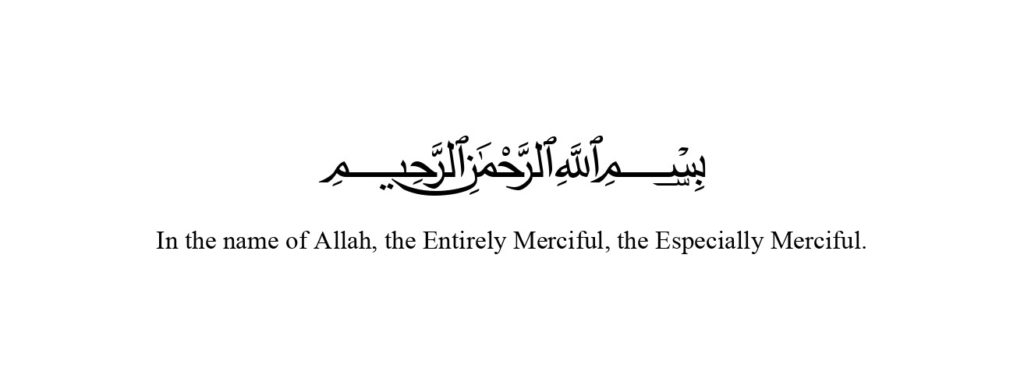

- RAMADAN AROUND THE WORLD
- Why We Fast
- Virtues of Fasting, Ramadan, and related deeds
- All About Suhoor and Iftār
- Our Salaf During Ramadan
- ‘I Embraced Islam because of Ramadan’
- How They Changed & Became Great
- The Big Fight of Ramadan: Get over your self!
- Whose sunnah are we following?
- Hunting For The Ramadan Spirit
- Why Remembering Death will Help Us in Ramadan
- 9 Tips For Seeking Laylatul Qadr
- Time Management In Ramadan
- No Ramadan Diet Plan Is The Best Plan!
- Diabetes And Ramadan: Guidelines For Fasting
- The Amazing Way Fasting Reduces Evil In Us
- The Wonders Of Having Soup For Iftar
- Ramadan Rules For Marriage And Intimacy
- When You Can’t Fast: Women In Ramadan
- Creative Ways To Instil The Value Of Ramadan In Kids
- Muslim Battles During Ramadan
- Ramadan Fatawa
- Istiqamah: How To Remain Steadfast After Ramadan
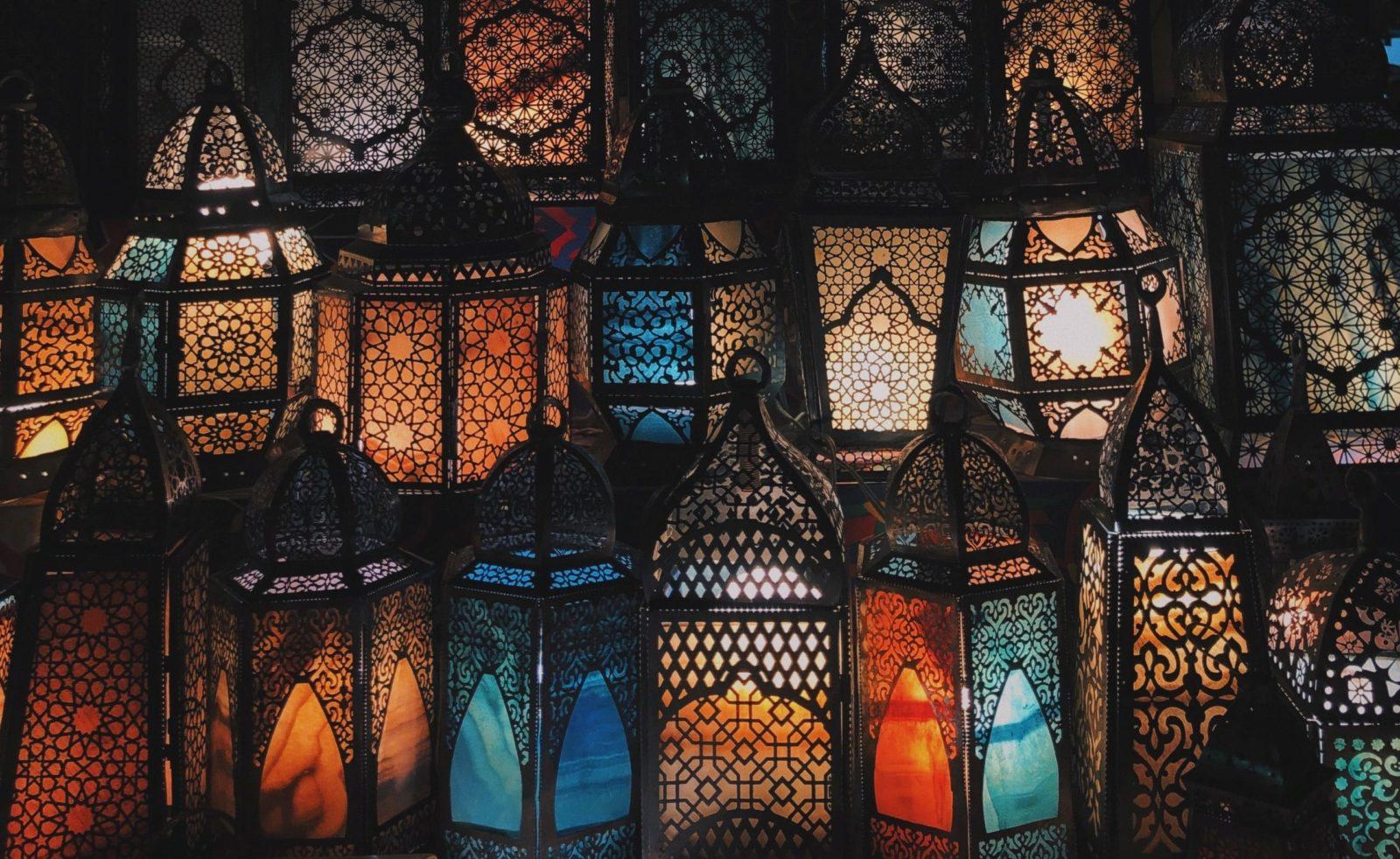
RAMADAN AROUND THE WORLD
How the Month of Fasting is Observed in Different Cultures
COVID-19 changed the way we observed our social rituals for the last two years. In Ramadan, our community activities and prayers were altered by physical distancing or closed mosques. However, we only praise and thank Allah for everything for He knows and we know not. May Allah make things easy for everyone who went through a tough time, forgive all those who passed away due to the coronavirus, and give success to the Ummah. Ameen.
Alhamdulillah, as we get back to normalcy, we are reissuing the special issue, in which we have put together the cultural side of Ramadan. Some aspects of our cultures certainly reflect excessive indulgence in food and other worldly delights, which can contradict the purpose of Ramadan. Striking a balance and focusing on the purpose of fasting is necessary to take full advantage of this blessed month.
MADINAH
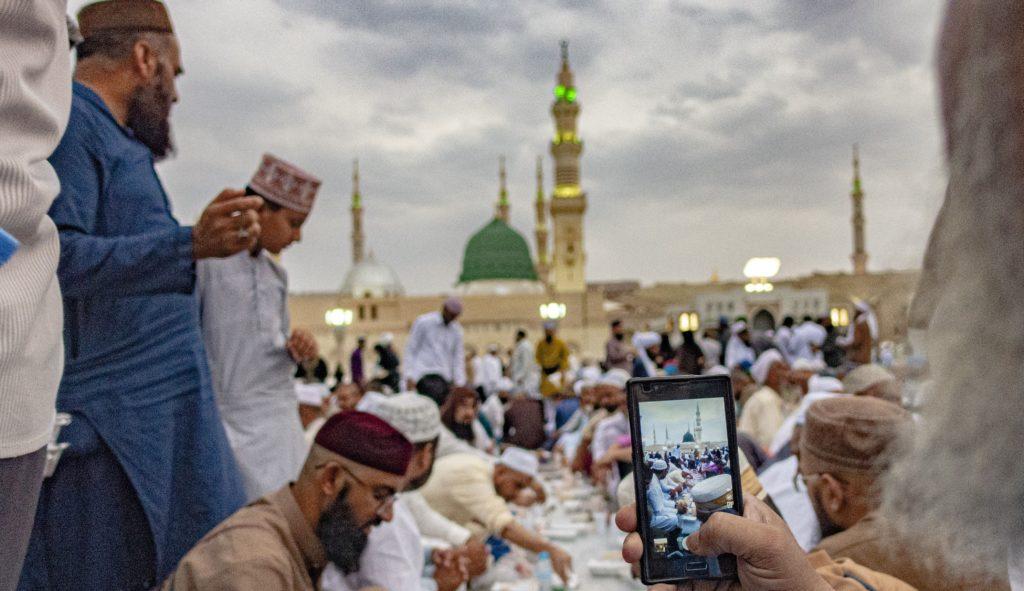
Al-Madinah al-Munawwarah becomes livelier during Ramadan. During this blessed month, all the markets and shopping centers around the Prophet’s Mosque ﷺ are crowded with visitors and are opened till late at night.
Ramadan in Madinah, the blessed city of the Prophet ﷺ, is truly amazing. Imagine everyone around you tries his utmost to be as nice as possible, as generous as possible. Muslims standing at the gates of the Prophet’s Mosque ﷺ invite strangers to break the fast with them. Some people distribute water and dates to those leaving the mosque and others tell each other that they love them for the sake of Allah.
Recitation of the Qur’an is heard from all corners of the city – offices, stores, homes, and cars –all day long. In the evenings, the most beautiful recitations emanate from the sacred mosque for taraweeh prayers.
Finally, in the last ten nights of Ramadan, everyone joins the night prayer at the Prophet’s Mosque striving to have their sins forgiven and hoping to catch Laylat-ul-Qadr.
THE ARABIAN GULF
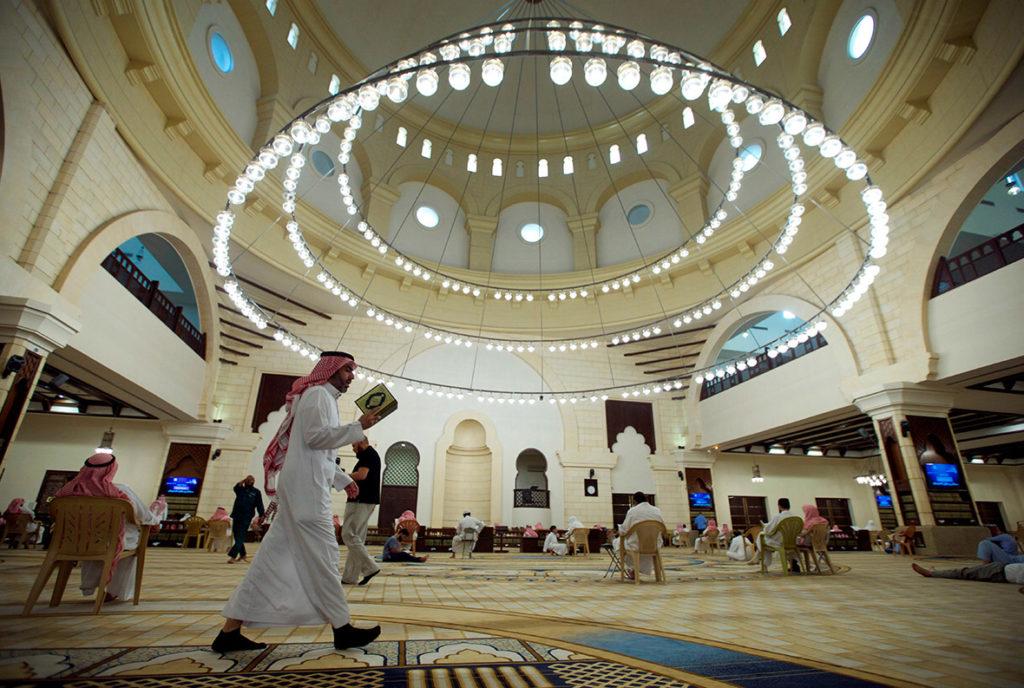
The people living in the Arabian Gulf – KSA, UAE, Kuwait, and Qatar in particular – share an almost identical culture. With the advent of Ramadan in the Gulf, working hours are reduced, which makes the streets, shopping malls, markets, and entertainment centers quite crowded. Women purchase special spices for this month, prepare milk and rice, and produce clarified butter from the milk of cows and sheep, which they distribute to their friends, family and neighbors.
The Gulf lodges millions of expat residents from various Arab and Muslim countries, who try to replicate the distinctive customs and traditions of their homelands in Ramadan. The citizens, on the other hand, revive their age-old traditions and customs. However, the profession of al-musahhir (the man who used to wake up people for suhoor before daybreak) has completely vanished.
Mosques usually witness an overwhelmingly large number of worshippers. Religious discourses are held either before the time of breaking the fast or after the taraweeh prayer.
Traditional food
Muslims here prepare for Ramadan by buying various traditional food and drinks such as Harees, which consists of mashed wheat mixed with meat, clarified butter and ground cinnamon.
Other essential items on the menu in Ramadan are Thareed, which consists of tiny pieces of bread with gravy poured over it, and Machboos, which is a spicy meat and rice dish.
Muhallabiyyah, which consists of rice and milk topped with saffron and cardamom, Madhroobah and Luqaymaat (sweet dumplings), which is similar to Luqmatul-Qaadhi, and ‘Awwaamah are popular sweets.
After the taraweeh prayer, men meet together for a meal called al-ghibqah and the women also meet after taraweeh for a casual gathering. During al-ghibqah, dishes like Mehammar, which consists of fried fish and rice cooked with sugar, Hareesah and Madhroobah are served.
The ghibqah nowadays is served very late, close to the time of suhoor. In contrast, ghibqah in the past was served not later than ten at night, and contained popular snacks and special sweets.
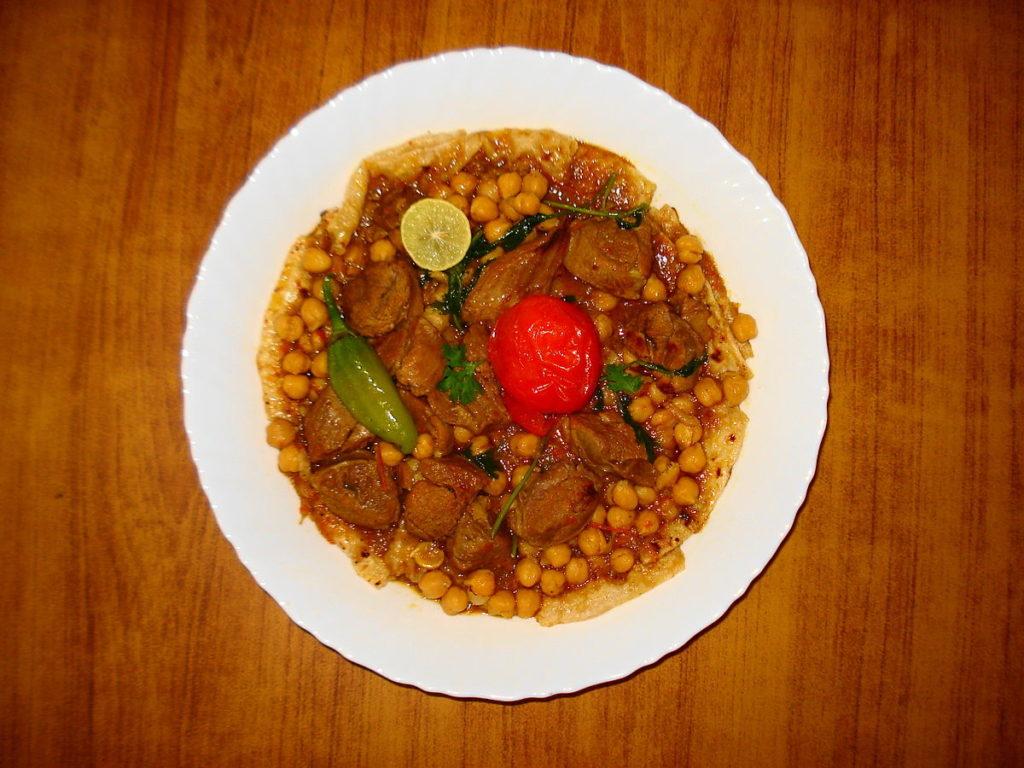
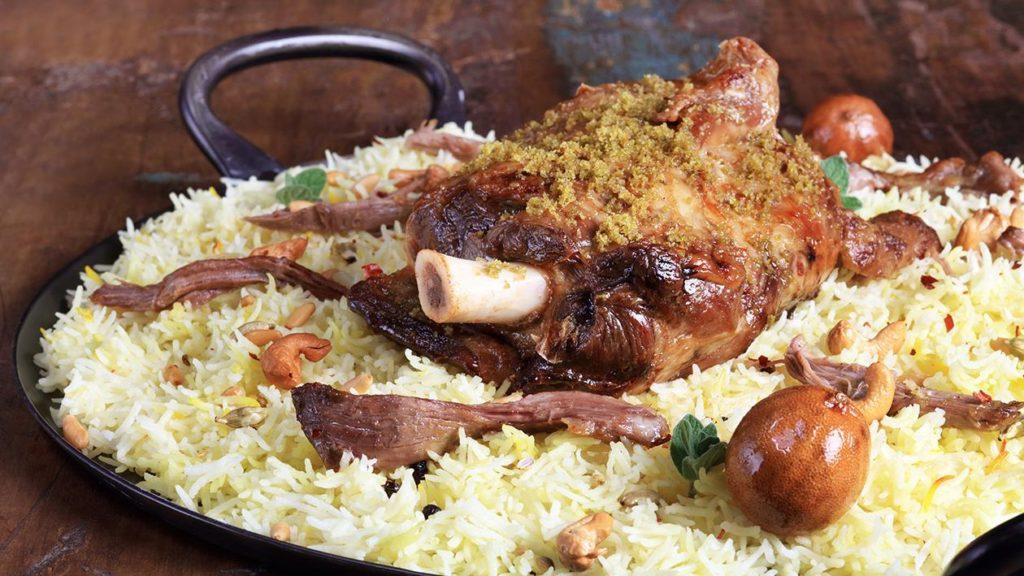
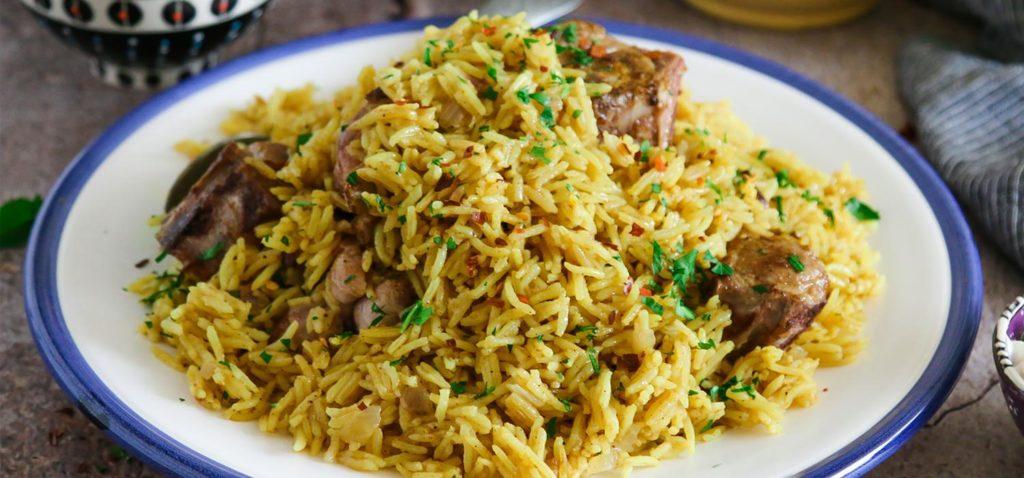
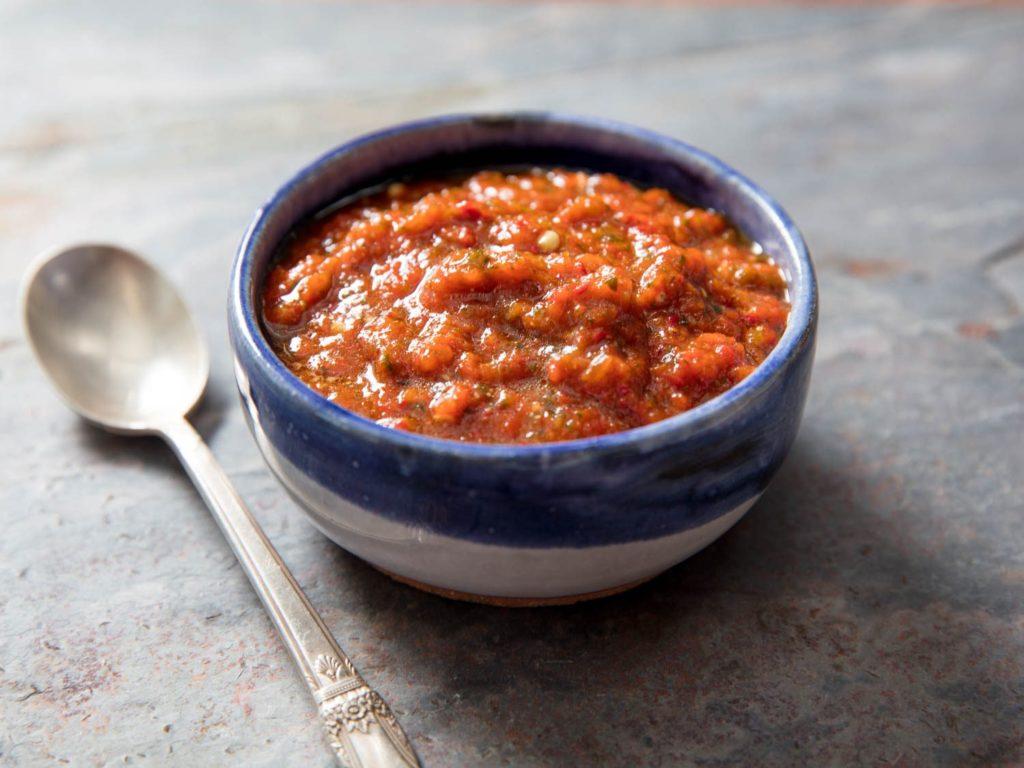
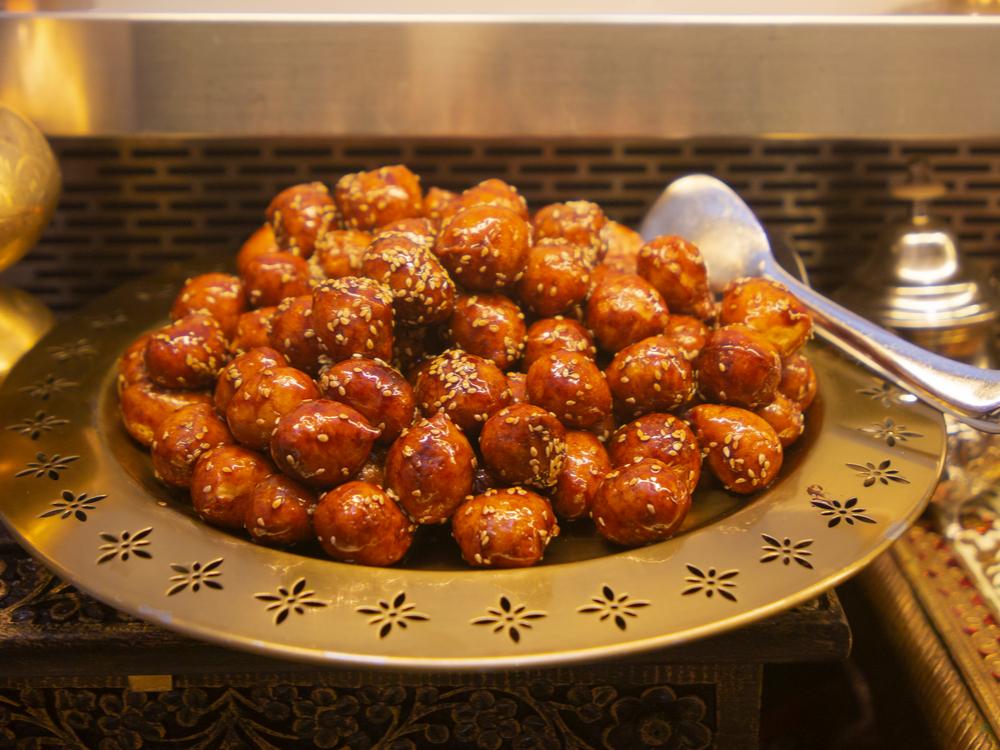
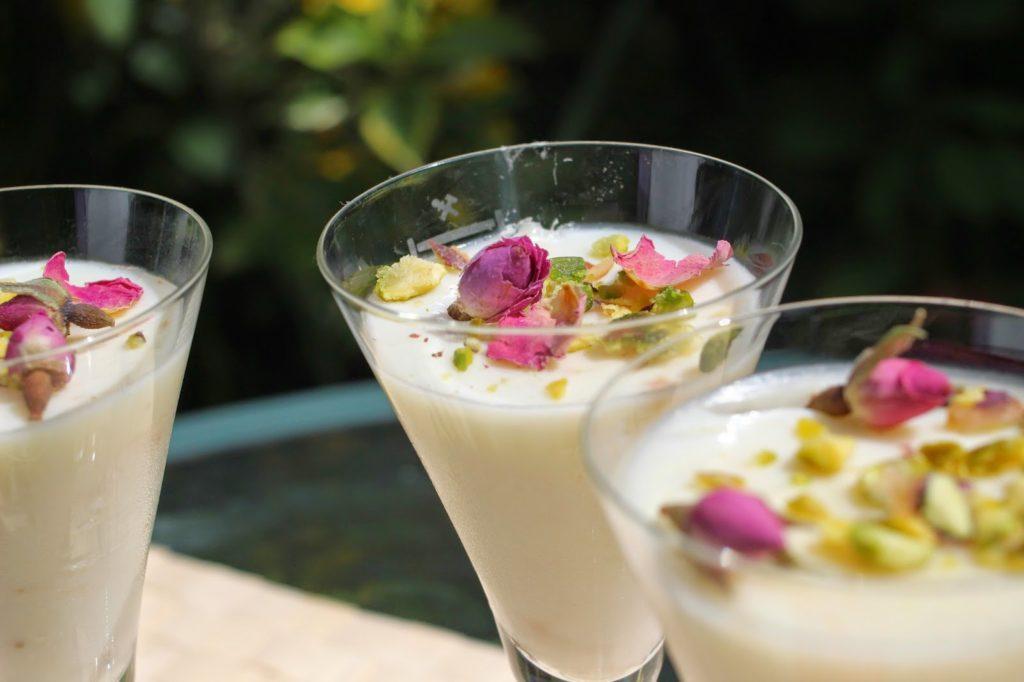
Charity
The people here are known for their generosity and spending in charity during normal days. During Ramadan, charity increases multifold. Iftar, arranged by the wealthy, is served for the needy in all mosques. Besides, when the time of iftar approaches, a variety of snacks is distributed among the fasting people on the road who are unable to reach their homes in time to break their fast.
EGYPT
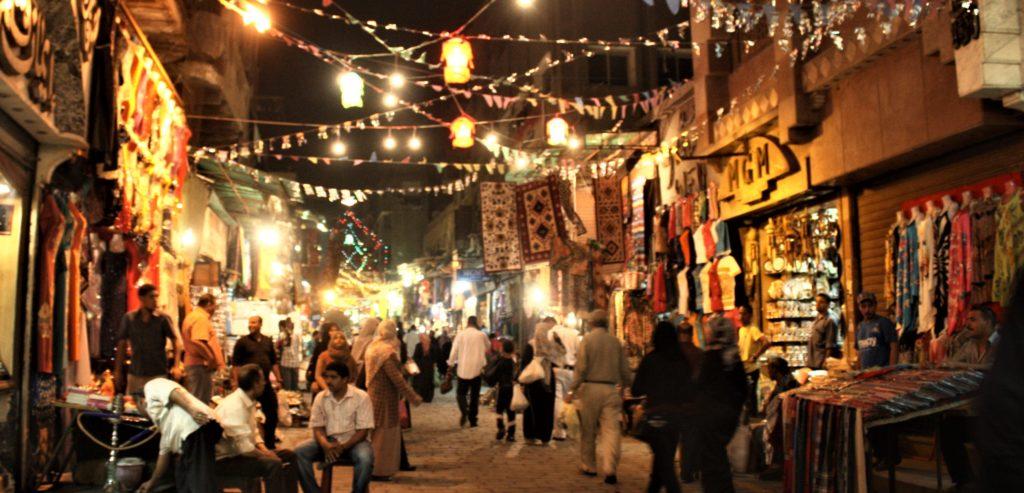
The streets of Cairo will come alive a few minutes after the sunset adhan, with vendors selling everything from basboosah (a traditional dessert made of semolina flour, yogurt, and coconut) to faanoos (lantern) to jasmine on a string. Colorful paper banners will hang between buildings signaling that the greatest month has come again.
Dried plums, apricots, and dates will circulate the kitchens of the Big Mango city. Children and adults alike will delight in the traditional qamar-eddeen, a thick apricot drink made from sheets of apricot paste. The shelves of food stores will once again be home to the “hair-doughed” kunafah and syrup-drenched qatayif sweets.
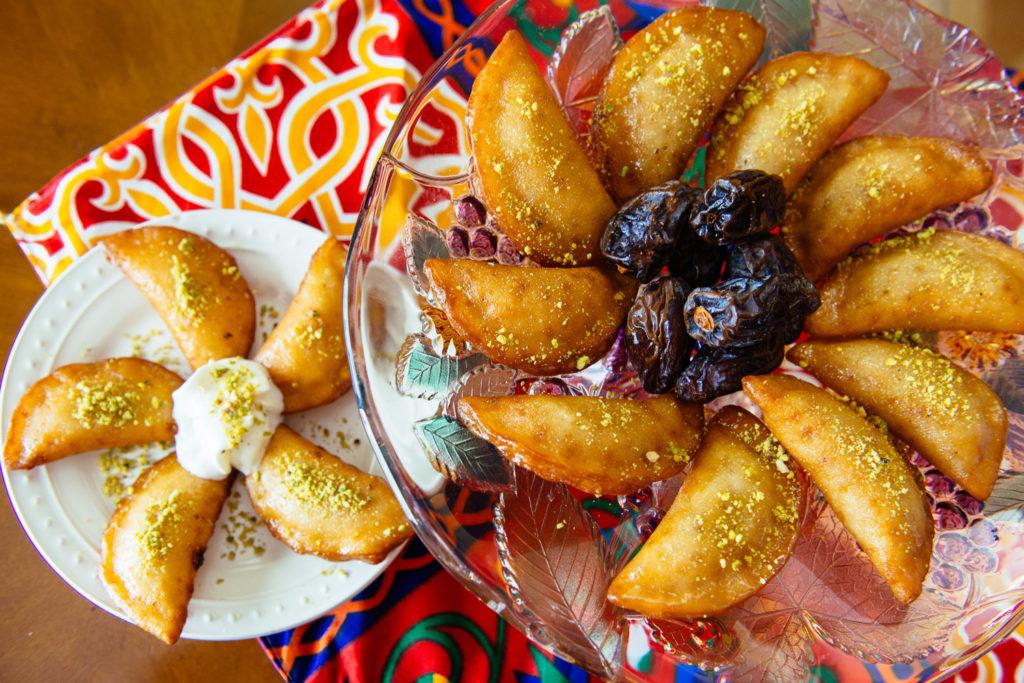

Everyday, Egyptians remember the significant aspects of Ramadan by setting up tents and places in the streets where the needy can have iftar for free. The taxi drivers in their old, black-and-white cars are cheerful as they zoom around the Tahreer Square area or down the Alexandria corniche looking for customers.
SUDAN
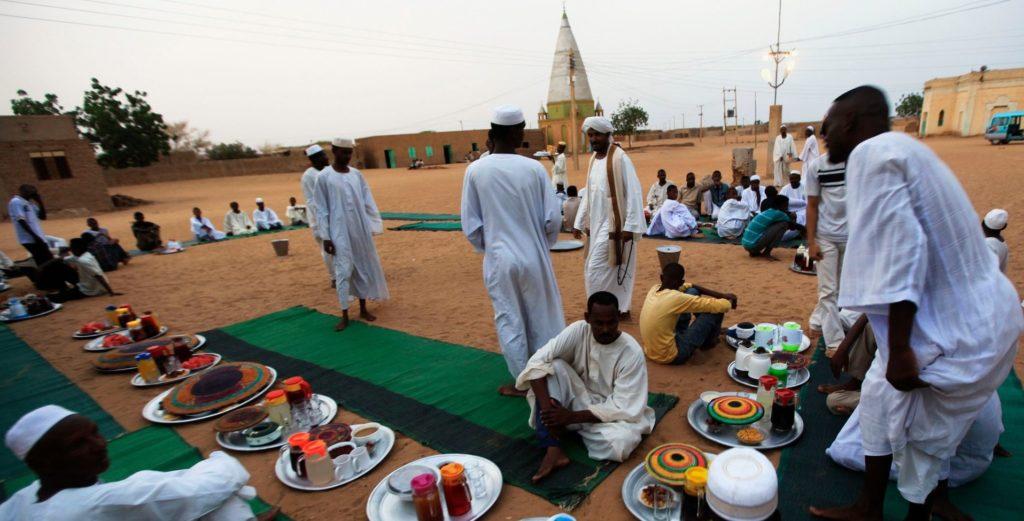
Being the largest country in Africa with a rich culture and hundreds of tribes, Sudan is a continent in microcosm. Customs and traditions are as diverse and extreme as the country’s climate which ranges from barren deserts in the north to lush rain forests in the south. The people are united in using Arabic as a common language but their cuisine is a blend of the many backgrounds and ethnic groups as well as the foreigners who influenced the country’s history.
Ramadan is eagerly awaited in Sudan and preparations begin weeks in advance and rise to a fever pitch in the last few days before the month begins. Apart from prayers, religious classes and open-air iftar parties, works of charity and other voluntary fund-raisings are common during the month. Life is completely transformed in the country of over 40 million where Muslims are the overwhelming majority.
The tradition of hospitality is as important in Sudan as it is in other Arab countries but it is especially prominent during Ramadan. Immense respect is shown to a guest and communal iftar is widely observed throughout the country. People prefer to take their iftar meals outside in open grounds. The male population of a neighborhood or village assembles in a designated location — usually outside the home of the eldest person or the tribal chief — for iftar and to perform congregational maghrib prayers.
This tradition of open-air iftar is deeply rooted in the society and, according to some elders, it was originally intended to attract travelers and other guests who happened to be passing at sunset. Unfortunately, the tradition is slowly dying out in large cities.
Ramadan has its own special dishes and some of these are found in virtually every household. A Sudanese meal is seldom free of meat. The country is a major livestock exporter. The most common dishes are mulah waika (cooked dry okra) and mulah rob (curdled milk) taken with kisra (omelet-like pancake made of millet or sorghum). The way kisra is prepared differs from one place to another with people in the western part of the country preferring porridge over the thin layers of kisra common in the north. There is also salatet zabadi (cucumber/yogurt salad), shorbet adas (lentil soup) and kofta (ground meatballs).
Sudanese cooking is usually simple with few spices added. Salt, pepper and lemon are the main seasonings. The meal is considered incomplete without shatta — a hot spicy condiment made of crushed red pepper with lemon juice and garlic; it is served with every meal.
In the northern provinces, people prefer gurrasa (thick pancake of wheat flour) taken with mulah bamya (okra lamb stew).
There may be several dishes at the meal but usually no forks and knives are used although spoons are provided. Meals are usually eaten from a common bowl, especially in the case of kisra, porridge and gurrasa.
A common Ramadan soft drink is abreh which may be either red or white. This is a slightly sweetened, refreshing drink made of thin flakes of sorghum flour. Other drinks include lemonade and fruit juice with guava, grapefruit, orange and mango. Because of the hot weather, abreh is served throughout the year.
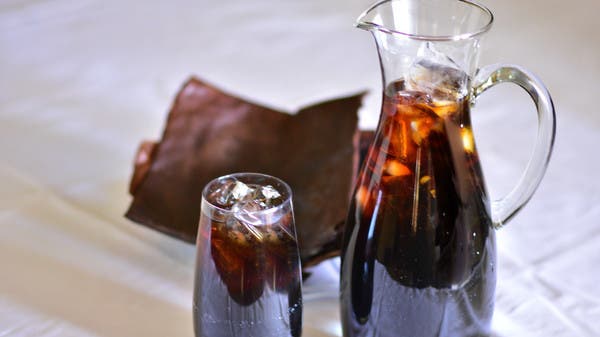
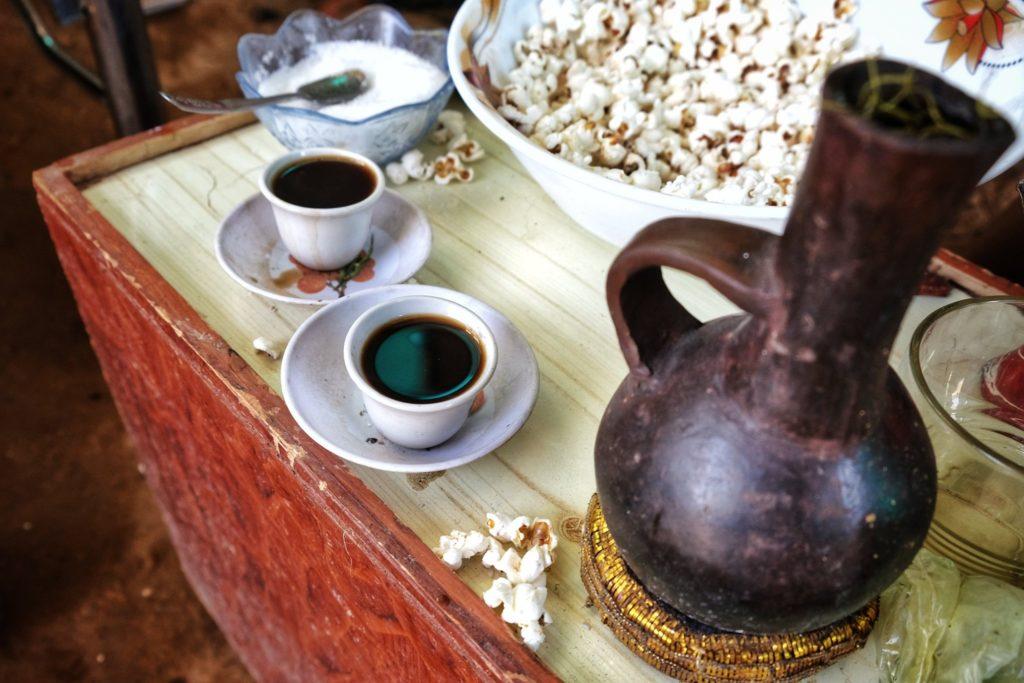
The iftar meal would not be complete without tea or coffee. Usually, loose tea is used and infused until it is deep red in color; cinnamon is then added. The Sudanese have a distinct way of preparing coffee, which gave the country some of its fame. Known locally as jabana, coffee is prepared by first frying the beans in a special pot over charcoal and then grinding them with cloves and certain spices. The coffee is boiled in hot water and served in tiny cups from a small clay kettle known as aljabana. It is from this word that the process of drinking coffee took its name.
PALESTINE
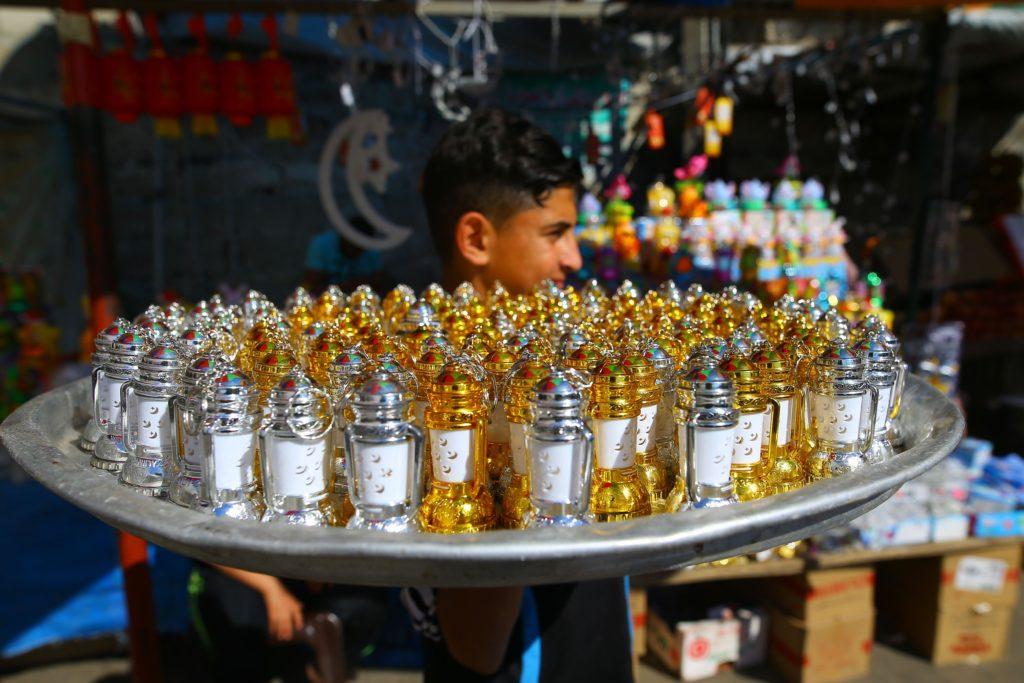
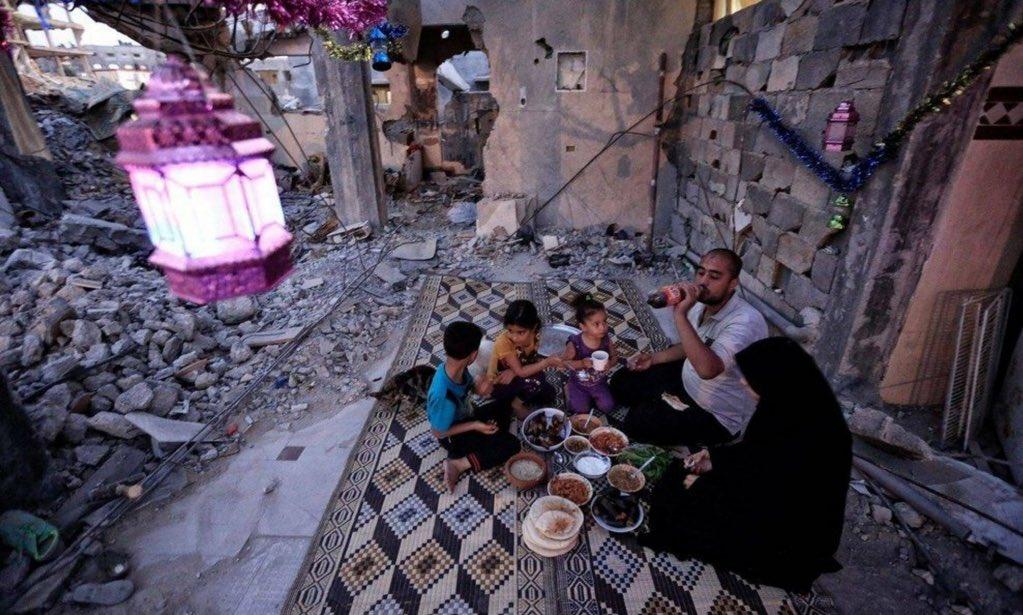
Ramadan in Palestine is far from a bleak time, although the people are under the most trying circumstances imaginable.
At the beginning of Ramadan, purchases are restricted to mostly basic needs such as vegetables and meat – traditional Ramadan sweets like dates and pastries are to be carefully rationed to be able to last through the month.
Gaza’s children light colorful lanterns to celebrate Ramadan, but parents nowadays cannot afford even small toys, as Gaza sinks deeper into poverty. May Allah make it easy for our brothers in Palestine and free them from occupation.
GHANA
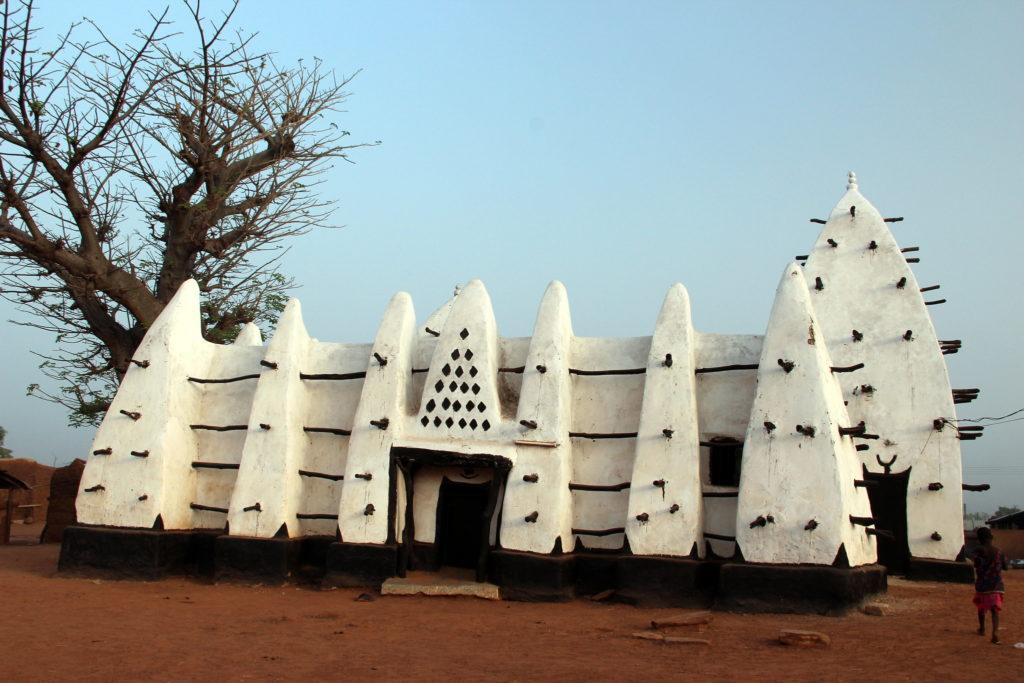
Around 4 am drummers walk round the village from house to house beating their drums and calling on everyone to wake up. Everyone’s favorite for suhoor is soup with tuo zafi, a soft meal made from maize flour.
Just before sunset people gather in mosques and read the Qur’an as they wait for the adhan to mark the end of the fast. People bring fruit and water to the mosque to share with each other and invite friends and relatives to their houses where they share a meal after sunset.
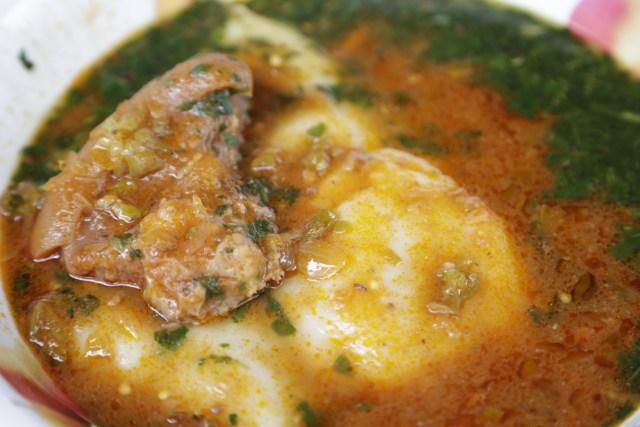
MOROCCO
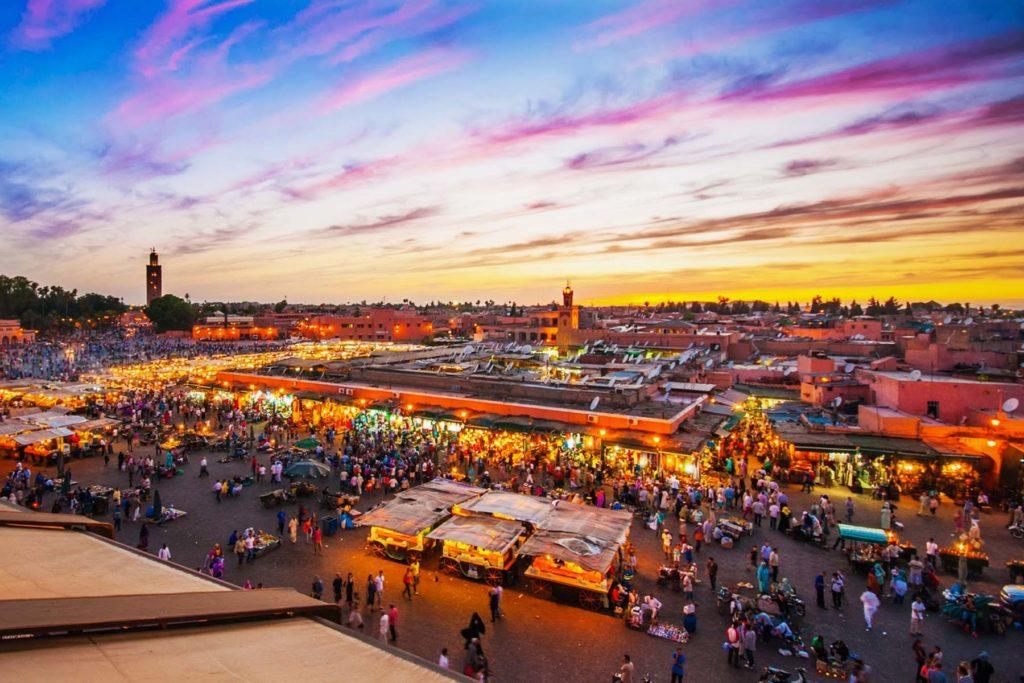
Ramadan is the only month when the members of the family meet, every evening, around a table of delicacies. Women prepare special dishes such as harira, which is rich in calories and spices, and is generally used to break the fast. It is usually followed by dates or honeycombs chebbakia (wafers coated in honey) or brioche (layers of pastry stuffed with fresh cheese and soaked in honey).
Other delicacies include baghrir (Moroccan pancakes), m’semmen (wafers coated with honey and butter), harcha (containing semolina), sellou (an almond mixture ground with flour and other ingredients), caab ghzale (horn of gazelle cake in stuffed layers of ground almonds,) briouate (pastry stuffed with shrimps or meat), and the national drink, the Moroccan mint tea.
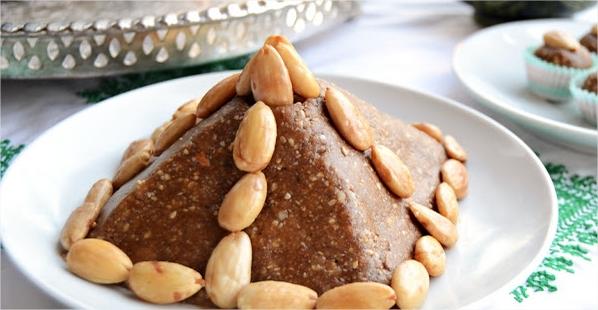
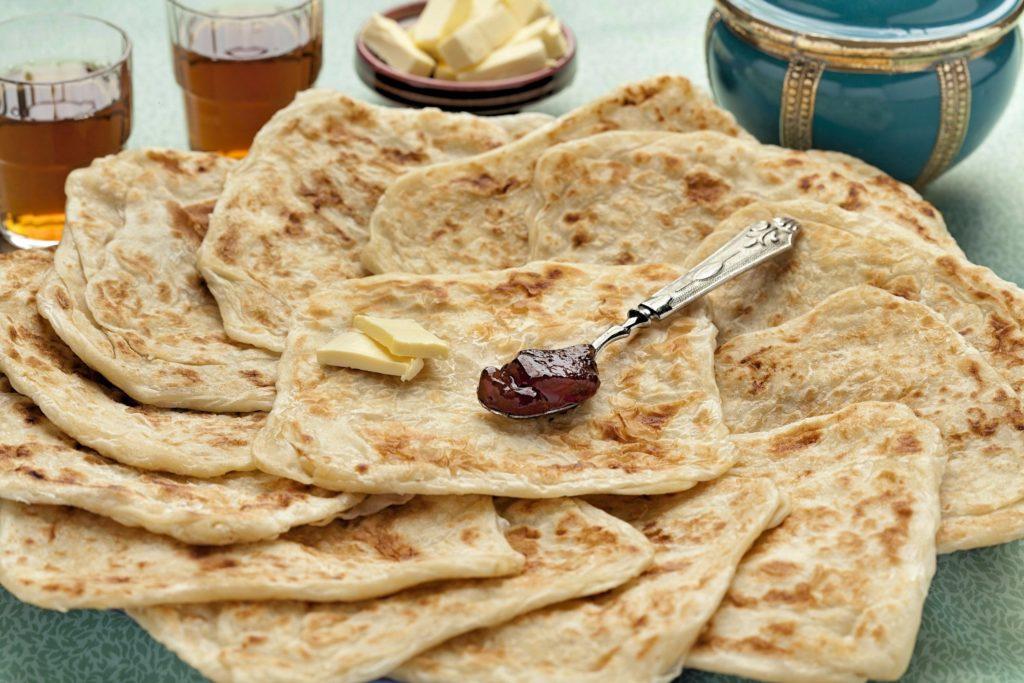
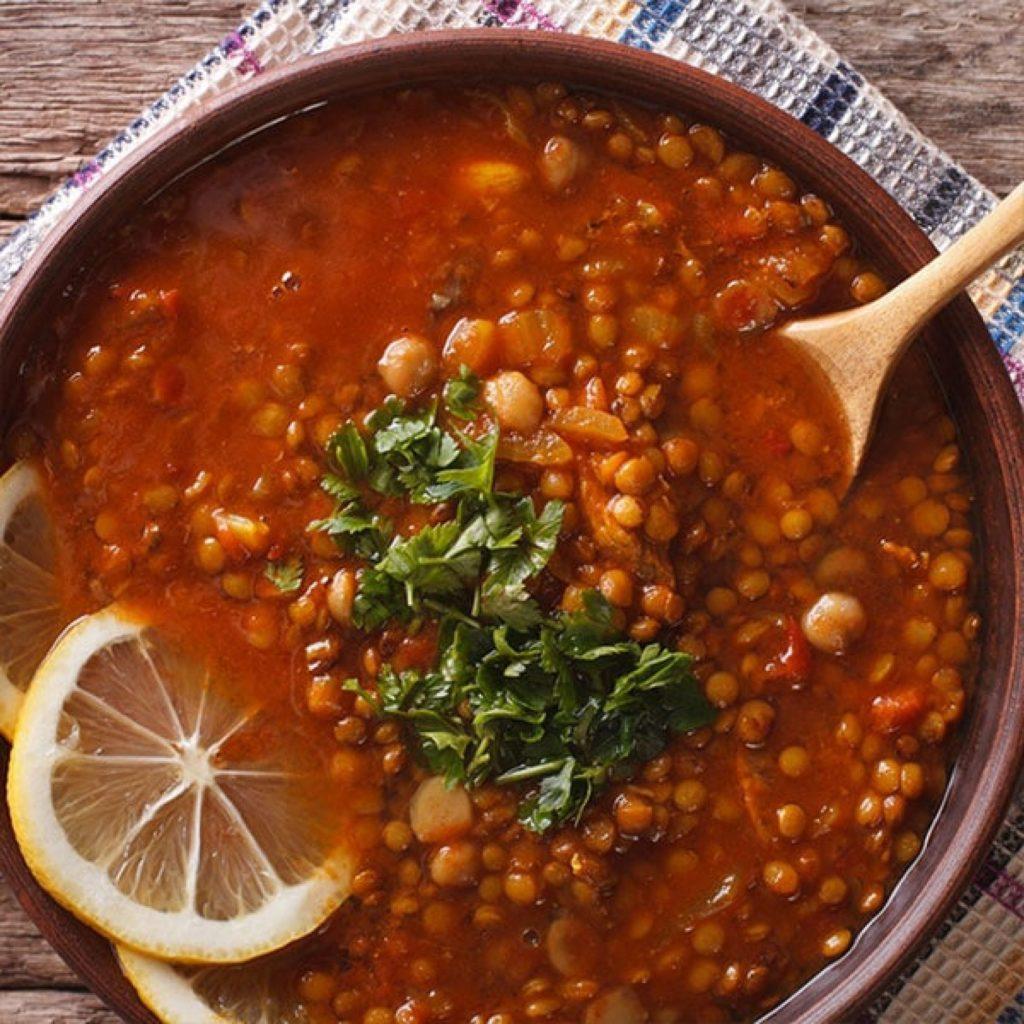
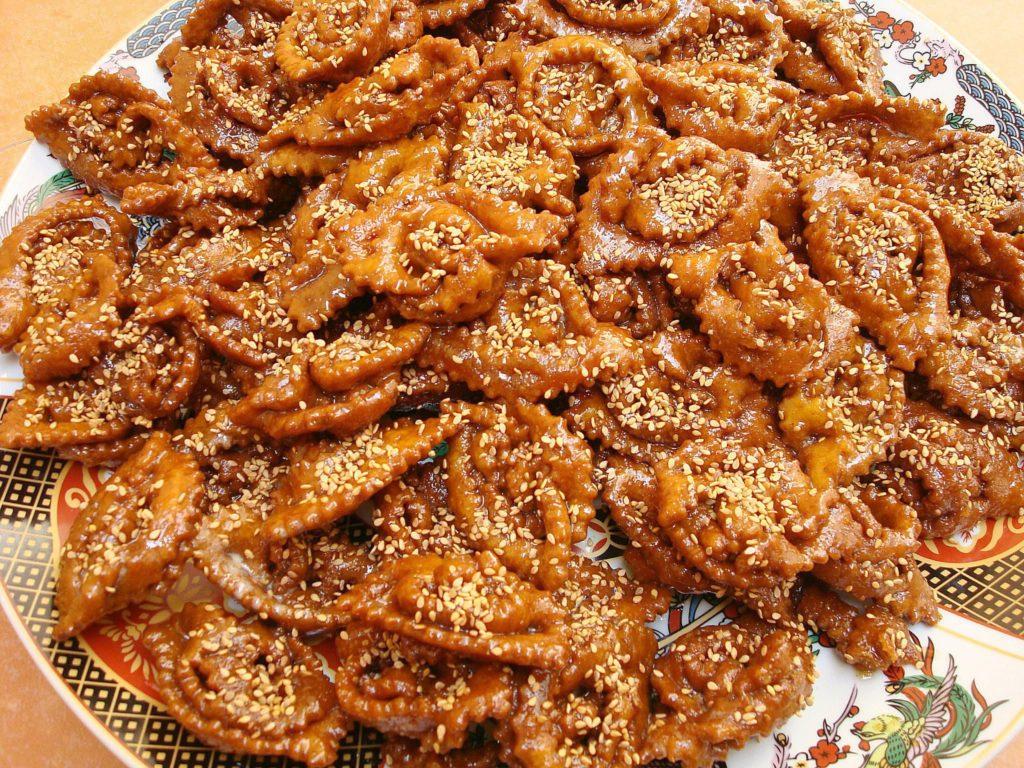
For Moroccans, Ramadan is a month of piety, worship, and spirituality, and a festive period as well, especially after iftar.
Children are initiated into fasting during the last ten days and after breaking the fast, boys and young girls dress in beautiful traditional clothes.
In the evening after iftar, most people eat dry fruits with tea and dine on the national dish. For many pious Moroccans, this period is marked by a particular spiritual intensity; they spend their nights reciting the Qur’an.
TUNISIA
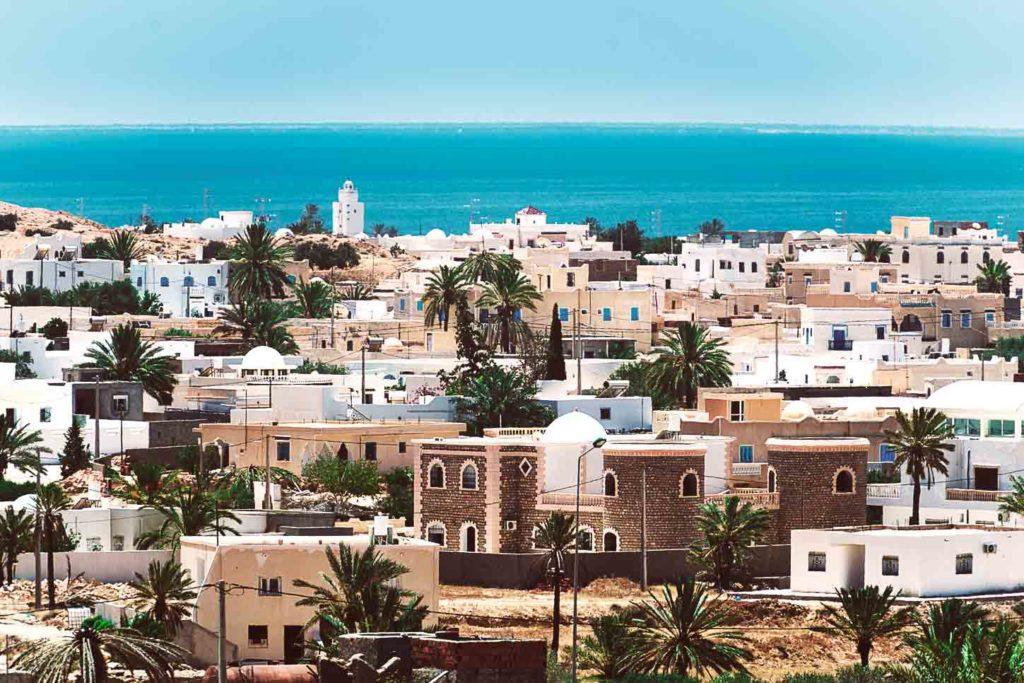
Ramadan is special in Tunisia, where life takes a different course, marked with special customs and traditions. Families decorate the front of their houses and mosques are given an extra coat of paint. Minarets are lit up with lamps.
Tunisians also call Ramadan the “month of meeting,” because family members find themselves around the same table every day at iftar. Many families residing close to a mosque offer worshippers milk and dates before prayer and the iftar meal after. In cities, caravans of solidarity are organized to provide iftar for the poor and needy.
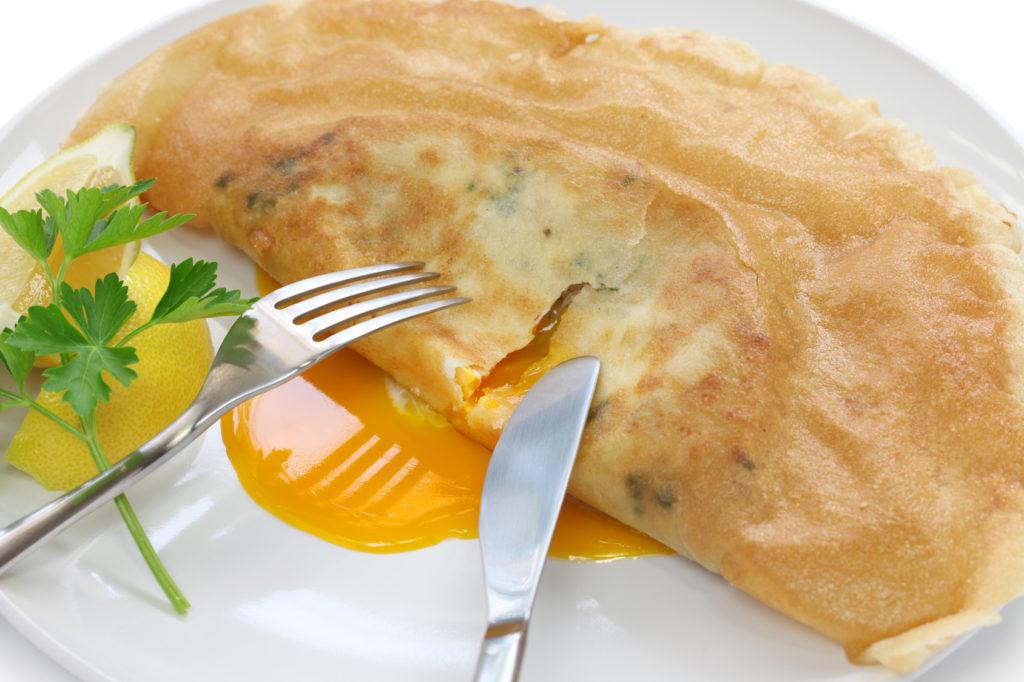

Mosques are frequently overflowing, they are so full that men, women and young people have to pray in the streets and neighboring public spaces. Women prepare hlalem, a traditional paste used for a soup called bssissa, which is consumed everyday. It is a nutritious mixture of corn, coriander, chick-peas, and olive oil. Another popular dish is brik, a triangular wafer stuffed with eggs, meat or fish and fried in oil.
TURKEY
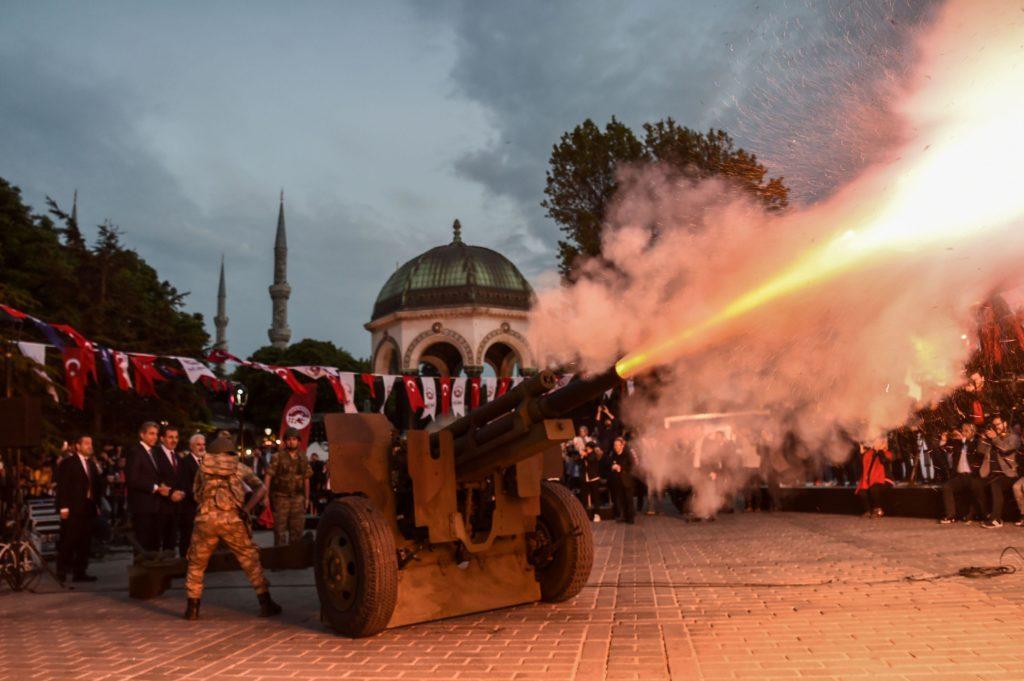
In Turkey, a typical day during Ramadan starts with drummers walking around the neighborhoods with big double-headed drums to wake up people for suhoor. A common Ramadan rhyme they sing translates to:
Come on wake up
What do you find in this sleep?
Make wudhoo’, perform your prayers
May there be a place in Paradise for you!
Suhoor meal consists of a typical Turkish breakfast, bread and tea. During the day, people go back to their daily routines and there is no special scheduling at the workplace during Ramadan. However, rush hour usually starts earlier during Ramadan because everybody tries to go back home early for iftar.
Cannons are fired, and the adhan starts simultaneously from thousands of minarets, most strikingly in big cities like Istanbul, where the whole city is galvanized. Mosques with more than one minaret are illuminated at night and sayings are written on the ropes stretched between the minarets of mosques. It is a Ramadan art in Turkey called mahya.
Around large mosques, hundreds of vendors start serving cotton candies, sweet corn, roasted chestnuts, pastries, and herbal teas as Iftar to fasting people. At the courtyards of big mosques like Sultan Ahmed, you find enormous book fairs where Turkey’s leading religious publishers present their latest publications.
During the time of the Ottoman Empire, pashas, government ministers, and the rich held community iftars in their homes throughout the month. The homes were opened to the public to feed the poor. Today, however, Ramadan tents are set up in the large squares of the cities. Philanthropic and charity foundations also set up their own Iftar tents and host fasting Muslims.
During Ramadan, there is often more frequent food shopping than usual. Even though there is no set menu for Ramadan, there are still a few special items associated with it. Dates, for example, which Turkish people are oblivious to most of the year, start to be displayed everywhere in great piles. Another Ramadan special is the “pide bread” in the bakeries. This is a flat, soft bread sprinkled with black seeds. People wait in long lines in front of bakeries to get this bread right before the iftar.
A typical iftar menu of an ordinary Turkish home starts with olives or dates to break the fast. The fresh Ramadan bread accompanies the soup. Then come rice, meat and vegetables. Iftar ends with dessert, mostly gullac, and Turkish tea.
People try to recite Qur’an more than usual. Housewives especially get together everyday for small study circles and read at least one part of the Qur’an everyday.
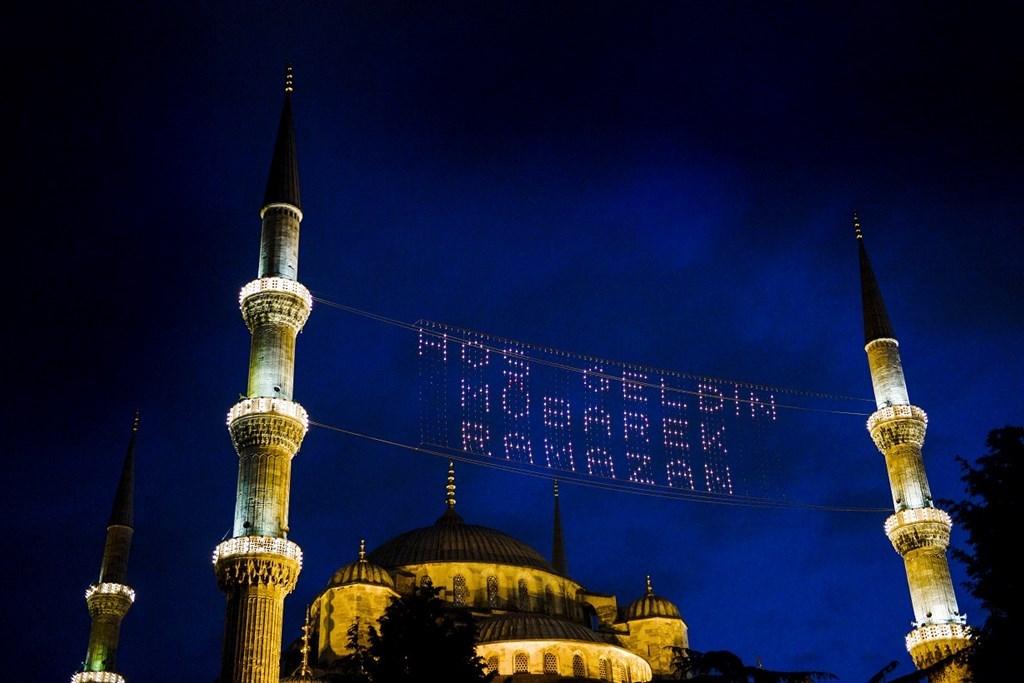
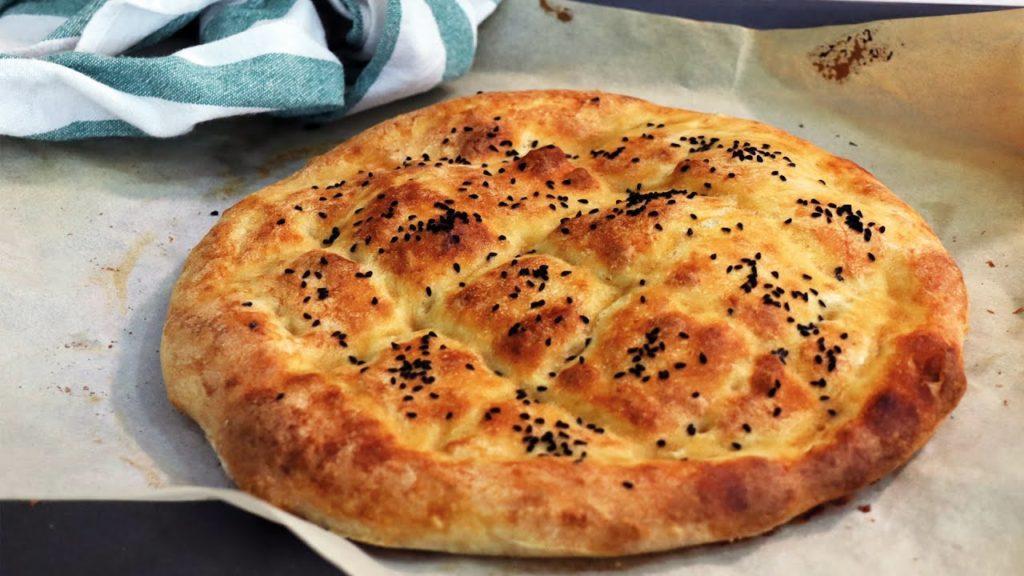
Eid is very special for everyone. It is always a good idea to stay in the mosque from fajr to the Eid prayer because there is usually not enough space for everybody, especially in large cities.
During the Eid days, shops are closed but public transport buses are free for three days as everybody begins the round of visits to family and friends—a tradition which lies at the heart of the Turkish way of Eid celebration.
Even people who were not on talking terms are brought together during the Eid. Children kiss the hands of the adults as an act of respect and get money from them to get Eid gifts for themselves. The elderly give handkerchiefs and Turkish delights to the kids. The night before Eid the minarets of mosques display the mahya: “Elveda Ramazan (Farewell Ramadan)”.
ALBANIA
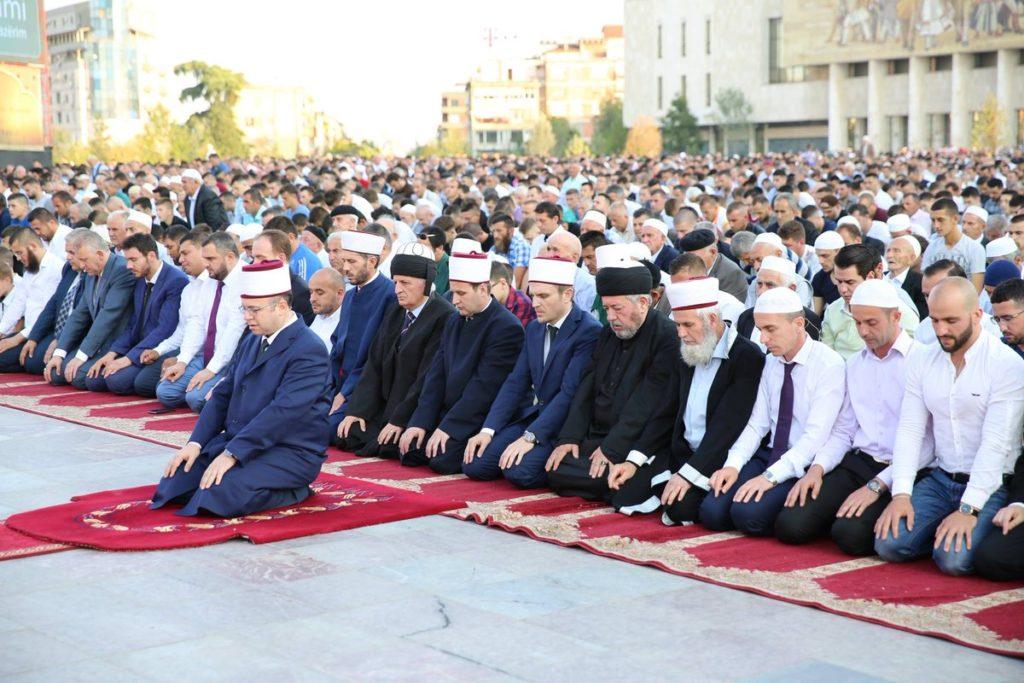

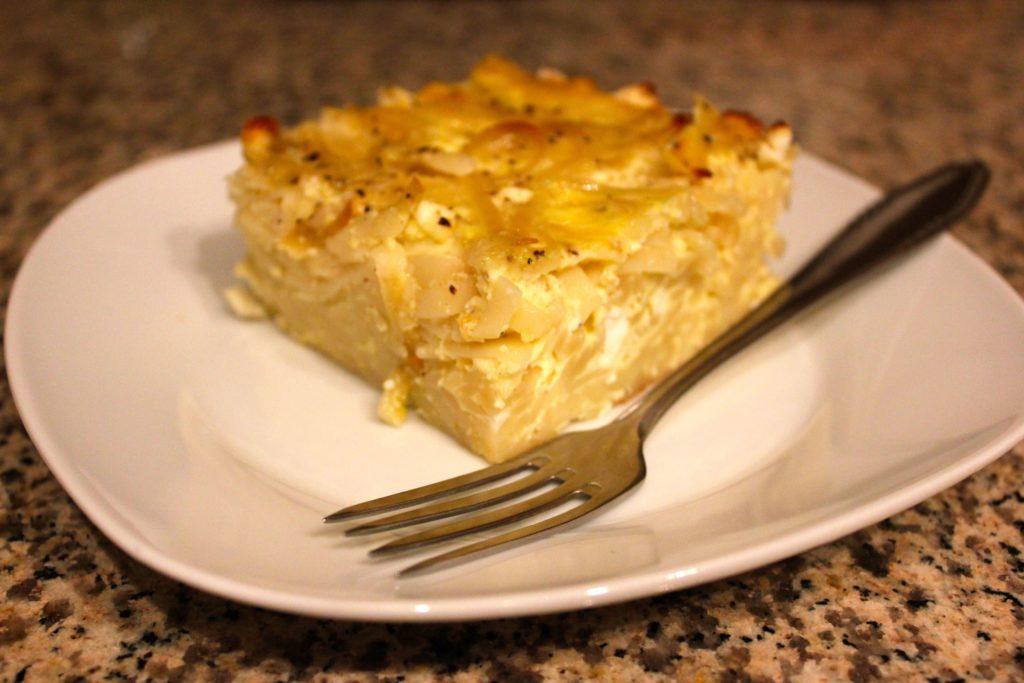
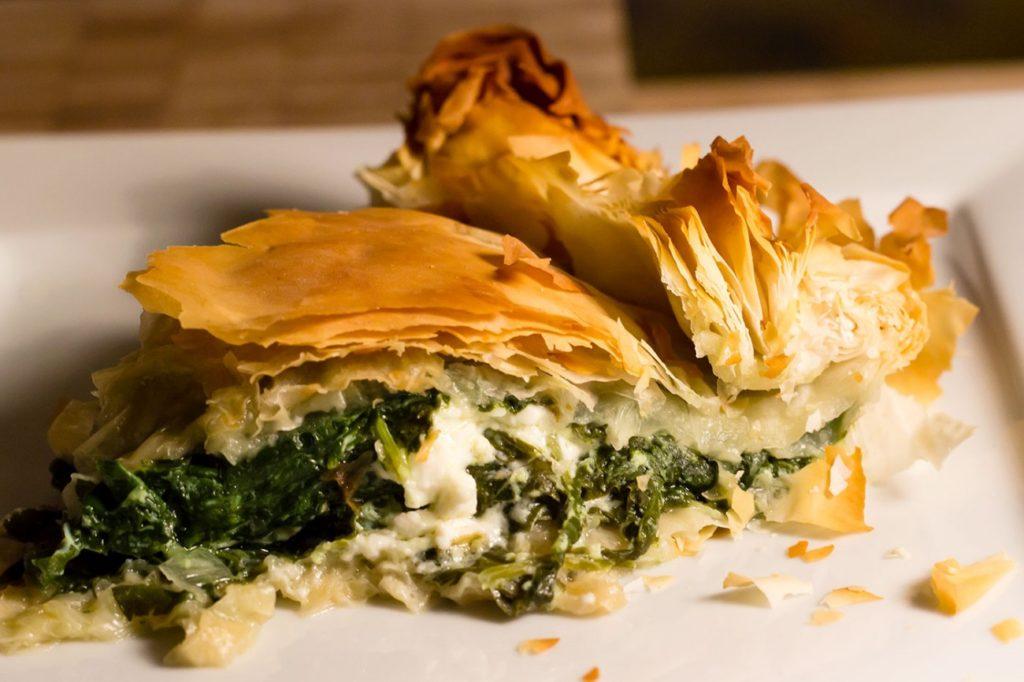
Ramadan traditions vary across the different regions of Albania. Some of the customs of Shkodra in northern Albania are described below.
The lodra sounds and wakes everyone from their sleep. The lodra is a double-ended cylinder drum covered in sheep or goat skin. The drummer hits each end with different sticks, resulting in a two-tone beat.
The drummer is traditionally from the Gypsy community and it is customary to give him food or money in recognition of his vital service. He might also be invited for suhoor or iftar.
There are many similarities between Albanian and Turkish food. However, Albania has some unique dishes like byrek, a flat flaky pastry pie containing meat, spinach or curd, pastiçe, pasta with a milk, cheese, eggs and butter sauce, and petulla, fried dough with sweet or savory filling such as jam, cream sauces or cheese.
The drummer comes around once again to announce Iftar. Iftar is such a strong tradition that they are also offered by some Christians to fasting Muslims and attended by Christians as social gatherings.
Those who know and practice their religion attend the prayers and occupy the mosques throughout Ramadan and attend taraweeh prayers at the end each night.
During the years of strict Communism, all religious practices were banned and the prayer almost disappeared. However, nobody knew if one was fasting and many maintained the fast by giving the excuse that they had previously eaten when offered food during Ramadan.
EUROPE & NORTH AMERICA
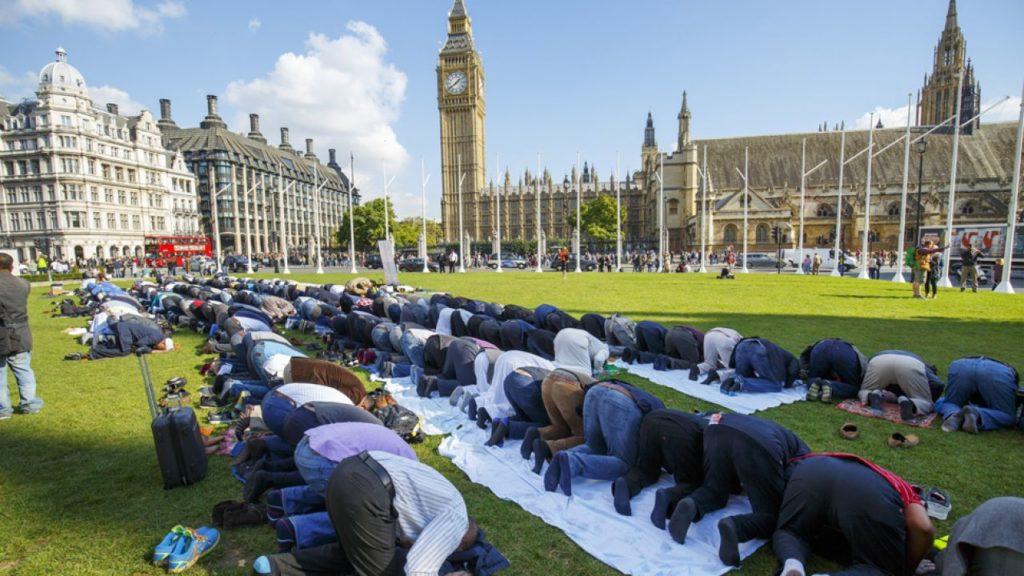
In the West and other non-Muslim countries, the mosque performs a different function than it does in Muslim countries. It is more than a place for prayer and the Friday sermon; the Islamic center is the hub of the entire Muslim community. It is a meeting point for friends and the center of excitement during Ramadan. Thus, many break their fast in the mosque rather than at home.
Many large mosques are a cultural melting pot of Muslims from different ethnicities and backgrounds. This creates a truly multicultural Islamic atmosphere, not to mention the international iftar from different cuisines during Ramadan.
Growing Islamophobia in many western countries has made it challenging for Muslims for practice their faith. Muslims are somewhat under pressure to constantly explain themselves and find their place in the society. Hence, Ramadan becomes a time for reaching out to non-Muslims in an act of daʽwah.
Because Muslims are so few in these countries, there are no apparent signs of Ramadan in most places unless one is living in neighborhoods or cities with a high concentration of Muslims.
Muslims invite imams and scholars from Islamic countries and prepare the mosques to receive a great number of Muslims, who come to perform the taraweeh prayer and attend lectures during Ramadan.
There is a great deal of debate over the sighting of the new moon and the beginning of fasting, in view of the differences among the Islamic blocs over the method of verifying the sighting of the crescent. Some organizations have resorted to calculation methods and predetermined Ramadan dates for many years to come. It is difficult to determine the first day of fasting in the absence of a unified decision-making process. Most Muslims prepare for Ramadan based on the institutions they follow.
BOSNIA
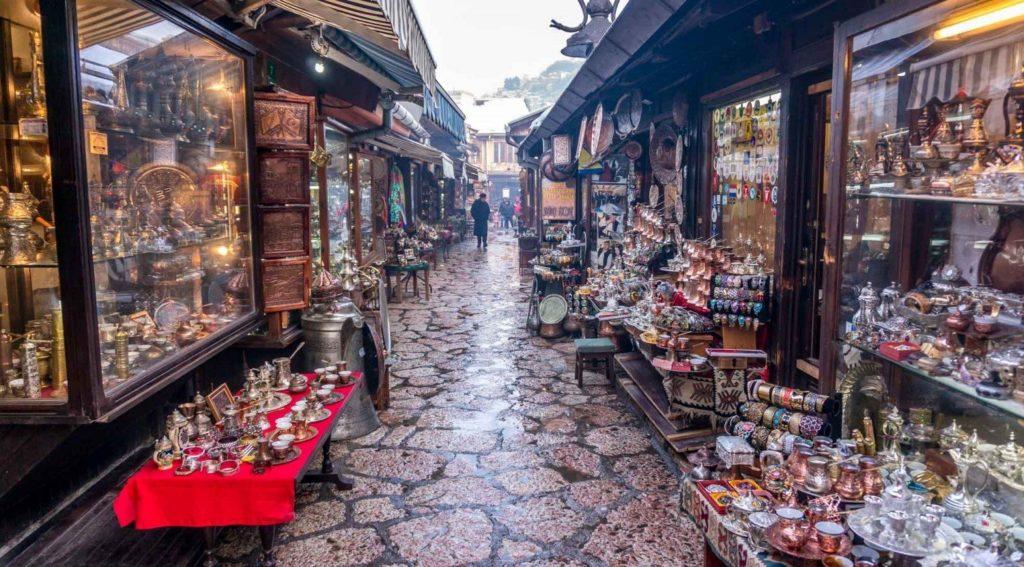
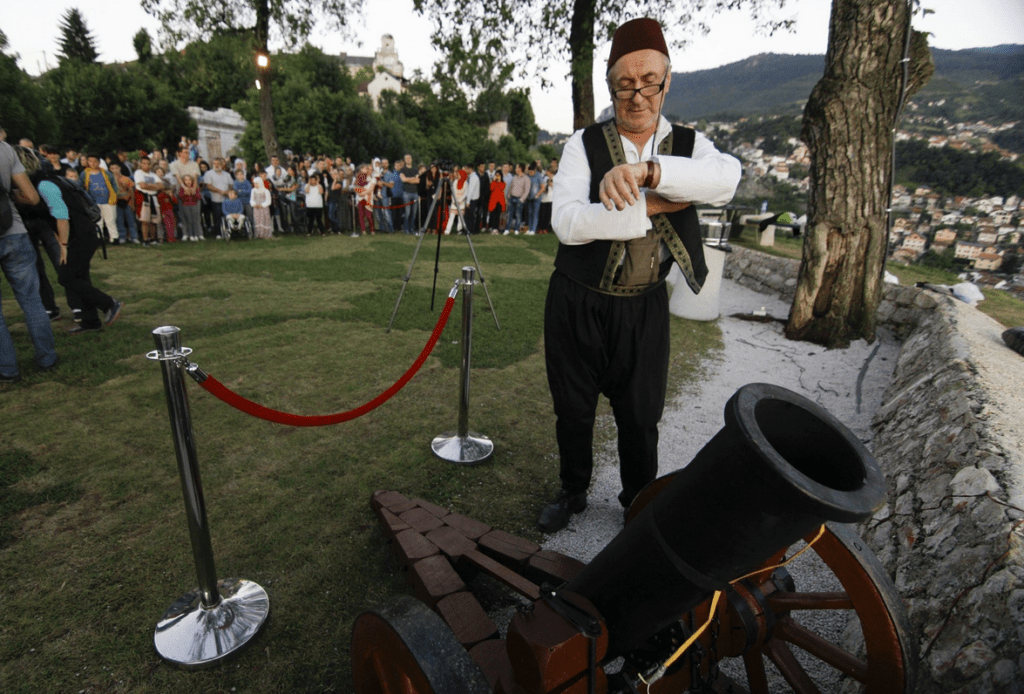
Masjids in the Balkans witness great crowds in the days of Ramadan as Muslims visit them from everywhere. Yards and playgrounds, like the commercial hub in the middle of Sarajevo, witness a great number of people praying. Luminous balconies of minarets and vividly decorated shop windows sparklingly illuminate Sarajevo. In Mostar, Muslims pray in thirty-seven different places.
The Mufti of Mostar leads the worshippers in prayer in the cultural center of the University of Mostar. In Zvornik, the Mufti of the Eastern province of Bosnia leads people in prayer in the largest Masjid in the region.
Masajid in Bosnia witness an unparalleled attendance of youths and adolescents, with young people occupying the first rows when performing the five prayers and taraweeh. Many have iftar at the masjid before performing the maghrib prayer.
Just before sunset people crowd into Bascarsija Market to break fasts, and they can hardly find free seats in already full restaurants.
The recitation of the Qur’an after dawn in Begova Mosque, which is the central mosque in Sarajevo, is a tradition preserved for centuries now. The tradition has never ceased to be carried on even during the intensive skirmishes of the war in 1990 as well as during the communist era.
At dawn people head towards the mosques to perform fajr prayer. There are also women as many as men joining the congregation. Women pray in separate places reserved for them.
IRAQ
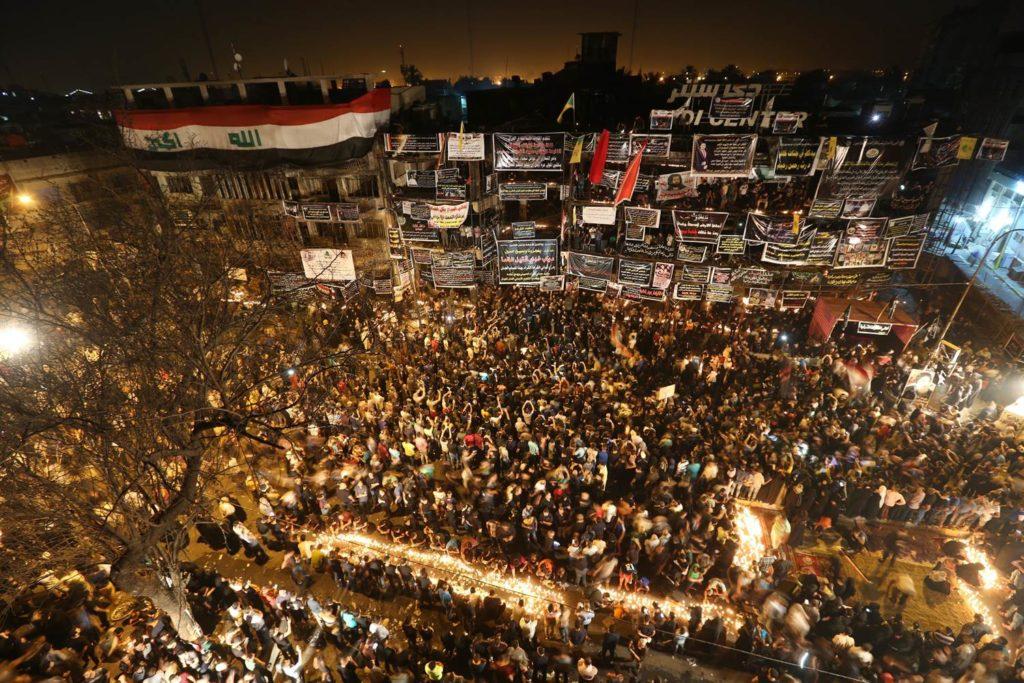
In Baghdad, people would be awakened by the sound of a man walking the streets shouting “Suhoor, suhoor!“, in an effort to wake up his fellow believers for the pre-dawn meal. Neighborhood children also come knocking on doors with their faanoos (lantern) – a personal wake-up call in exchange for some sweets.
In the minutes leading up to the Maghrib adhan, the smell of barbecue wafts through the city, as most people cook their kebabs out on the grill. Those who are breaking their fast eat some dates and yogurt first, then after offering the prayer in the mosque, return for soup and kebabs. Residents send whatever food they have made to their neighbors, so no one goes hungry in Ramadan.
TURKMENISTAN
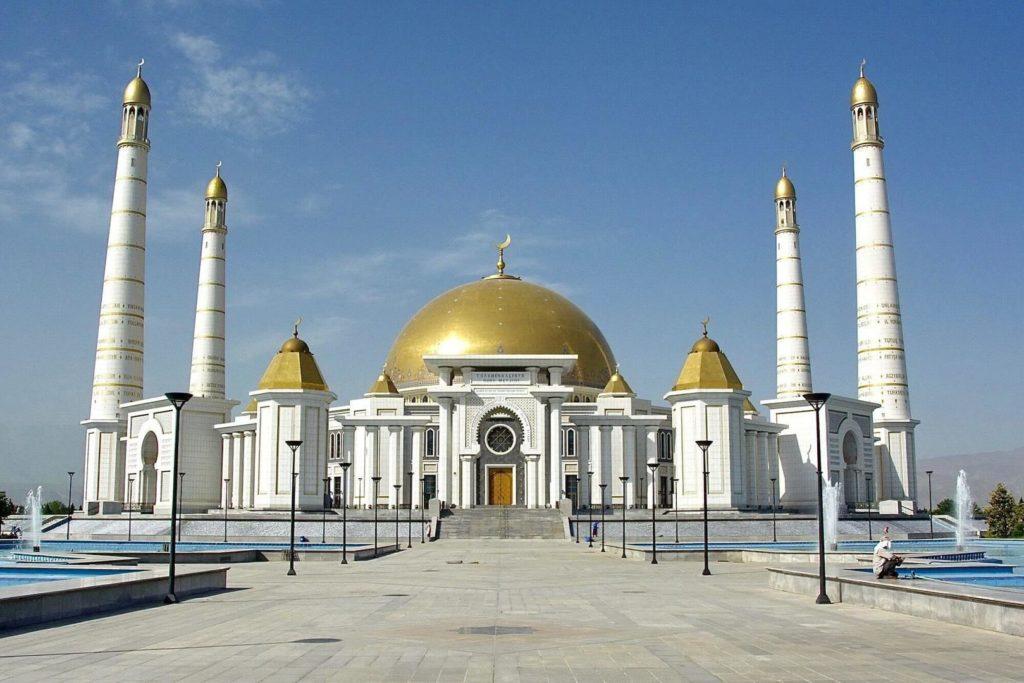
Ramadan in the largely desert country of Turkmenistan is a different thing altogether. Due to living for decades under oppressive Communism, many Muslims in Turkmenistan and other countries of the former Soviet Bloc did not freely celebrate Islamic occasions.
Muslims in Turkmenistan comprise an 87 percent majority and many of them fast and live the month as if it were their last. They celebrate the Gadyrgijesi, or the Night of Nights, the night in which the Noble Qur’an was sent down. In Ramadan 2001, in response to the requests of local Muslim elders, Eid al-Fitr was declared a day off.
The iftar in Turkmenistan usually consists of herb-filled pastries and cornmeal pancakes, porridges with beans or pumpkin, or rice pilaf with dried fruit. There is no abundance of restaurants, so the food will be bought in the markets or cooked at home. Ramadan in Turkmenistan is somewhat sober and is spent focusing on family affairs and remembrance of Allah.
PAKISTAN
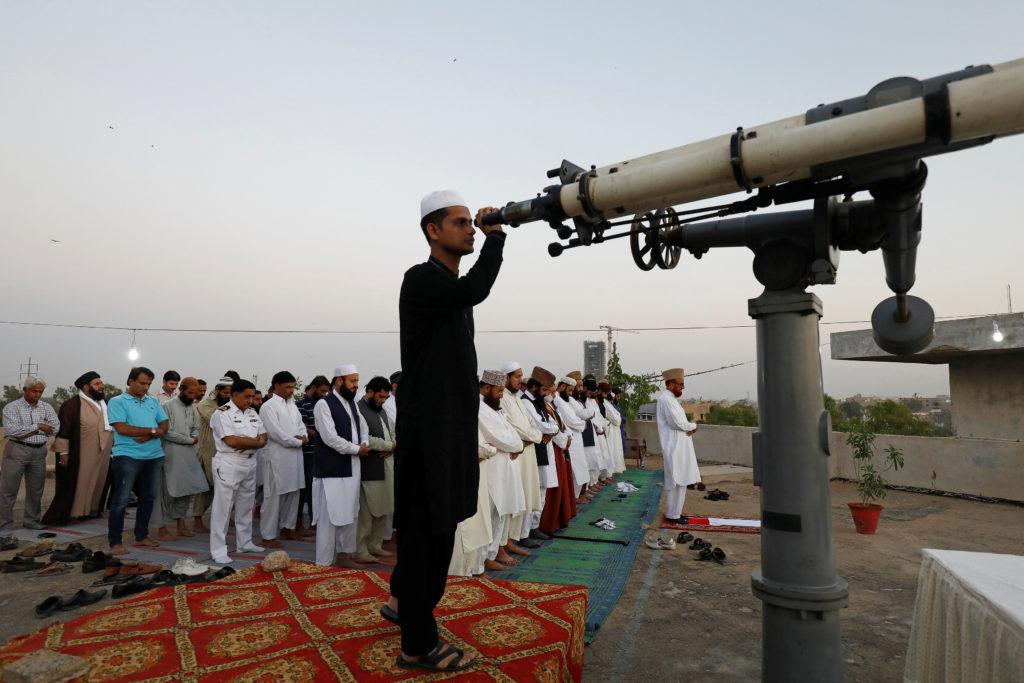
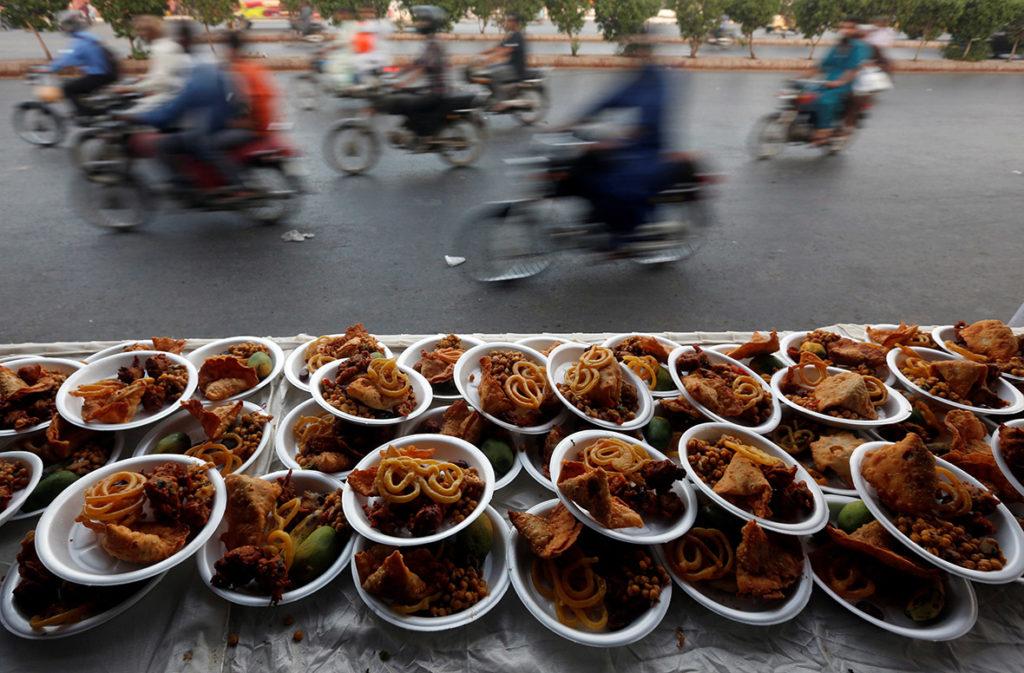
The excitement starts when people first catch sight of the Ramadan moon. There is a hustle and bustle in the streets deep into the night as people start preparing for the month of fasting by stocking up on essentials. The men head to the mosques for taraweeh prayers, while the women start preparing the suhoor (pre-dawn) meal.
To wake everyone up for suhoor a man tours the neighborhood before dawn, banging on an empty tin. The noise is loud enough to rouse people. The tin he uses is a cheap replacement for the more traditional drum.
Most Pakistanis prefer something substantial for breakfast, such as paratha (buttery flaky flat bread) eaten with a curried dish of their choice. Jalebis (crisp fried orange spirals soaked in sugar syrup) in milk are also a favorite. Whatever the choice of breakfast, it is always followed by tea.
Food shops and restaurants generally open during suhoor time then close for the day, only re-opening around at sunset.
Normal working hours change in Pakistan so that people go to work earlier than normal in order to return in time for iftar.
For Iftar, every home is sure to have pakoras (fried vegetable fritters) to open the fast, in fact iftar would be incomplete without them! People also enjoy fruit chaat (spiced fruit salad), dhai bhaley (spicy dumplings in yoghurt), and samosas.
Restaurants have special menus for suhoor and Iftar, so many people go out to eat during Ramadan. After the Iftar meal, men go to pray taraweeh prayers at the mosques, while women may gather in a local house to pray together. Everyone returns home to finish the day with tea.
INDIA
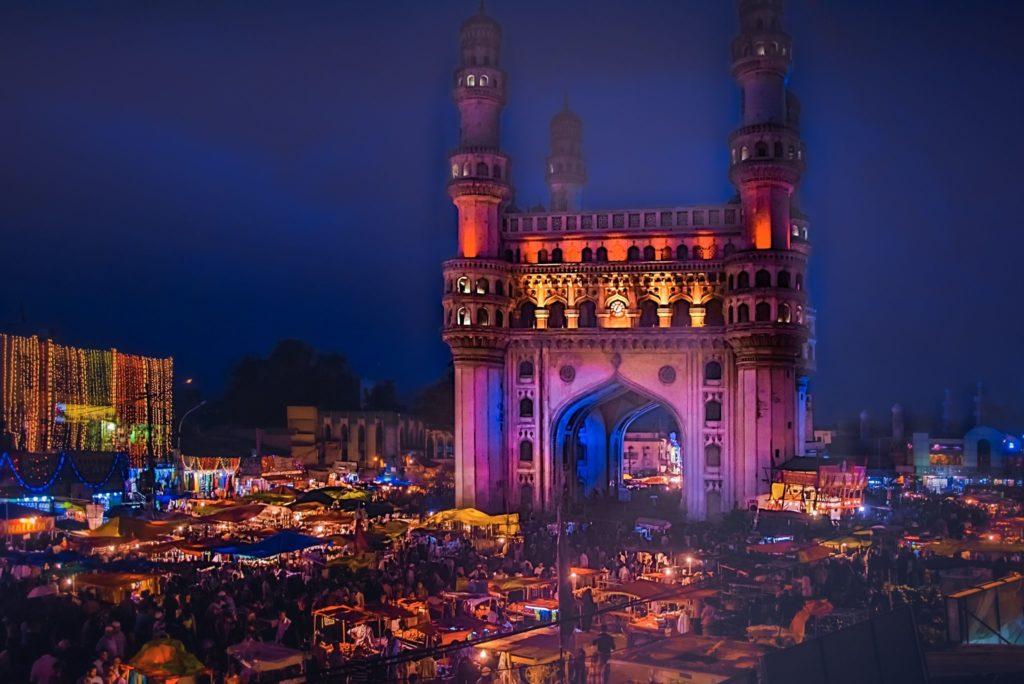
Muslims have a special history in India. Muslims ruled India for hundreds of years before the British and have positively influenced every aspect of life in the country. Muslims come from various backgrounds and cultures within India itself. While every Indian Muslim culture has its own flavor, we chose for this article Ramadan in the popular city known for its biryani, Hyderabad.
During Ramadan, homes and streets are filled with a hustle and bustle that is different from the usual grind of daily life. Ramadan here has a flair that is lively in the evenings and quiet and almost lulled during the day. In fact, most shops and restaurants close during the day, only to open a few hours before the iftar.
While men spend their days visiting the masjid for each of the five prayers, the taraweeh prayer and even spending a few nights in iʽtikaaf, women spend their time in worship within the home and are busy cooking special iftar, suhoor, and dinner meals. Ironically, though Ramadan is about abstaining from food and drink during the day, much of the day could be spent preparing meals and making accommodations for the Eid celebration, which includes grand feasts of elaborate dishes and sweets.
Women begin preparing the meals and the clothing for Eid even as Ramadan has just begun. Part of this is because of an old tradition, when resources were scarce and needed to be stockpiled, and part of it is just sheer excitement of an upcoming blessed holiday.
Women and girls may spend a great deal of time deciding what they will wear for Eid, gathering clothes and jewelry in anticipation of the big day. Also, the Eid festivities require a great deal of food, especially when one intends to feed extended family and friends, and send food and sweets to neighbors. Therefore, many households in Hyderabad bustle with cooking and cleaning processes all month long, not just from the day-to-day meal preparations, but from the upcoming Eid celebration that could be weeks away.
But let not the Hyderabadi’s appreciation for good food and dress fool you; their worship and dedication are just as energetic and vibrant as their biryani (a rice pilaf). In Hyderabad, culture plays a large role in how Ramadan is spent. Many men will spend the end of the month traveling from one local mosque to another, ensuring that they witness and participate in as many taraweeh prayers as possible.
During the last days of Ramadan, the shopkeepers distribute the clothing in front of their shops for free to the needy as Eid gifts (as a form of charity).
MALAYSIA
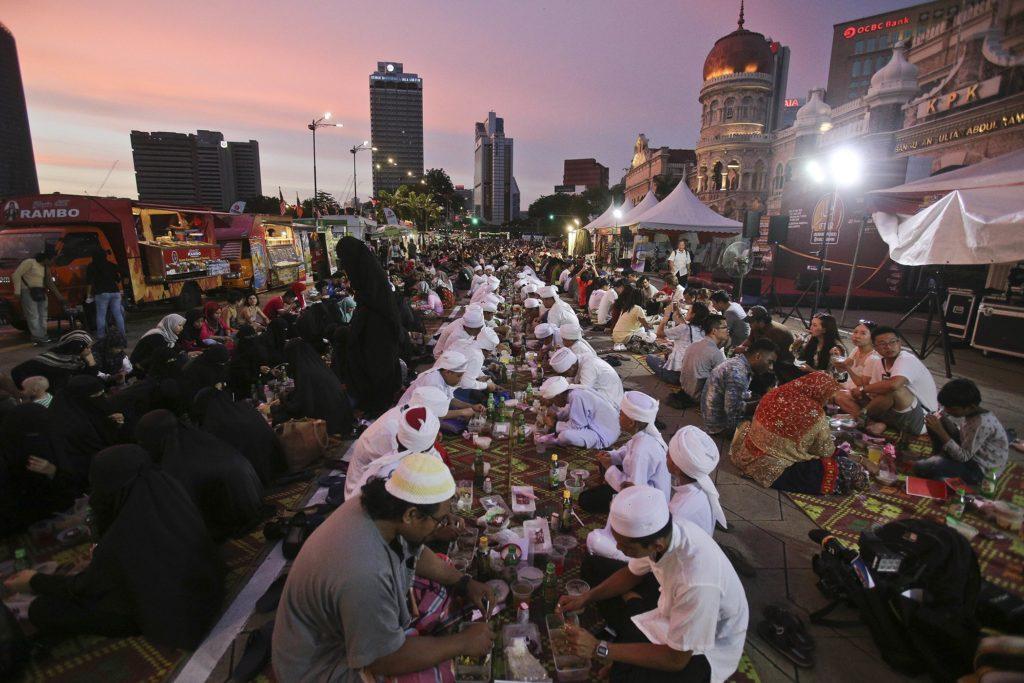
Malaysian Muslims receive the month of Ramadan with great joy and unequalled happiness. They change their style of living during this honorable month. Reciting the glorious Qur’an, remembering Allah and staying at mosques are their main concerns. Muslims exchange congratulations on the advent of Ramadan. On this great occasion, local authorities sprinkle streets with water, prepare clean yards and public squares and hang electric lamps in the main streets.
As for the way of receiving Ramadan in the countryside, Muslims here celebrate the occasion through gathering at mosques and congratulating one another. The rich and well-to-do traders normally arrange iftar feasts at mosques and in the streets.
All family members attend prayers in the mosque regularly. Schools for teaching the Qur’an are widespread all over the country. The government encourages these schools to intensify their courses during this month. They teach Fiqh, Tafseer, Aqeedah, Arabic language, and the Qur’an. Malaysians conclude the month of Ramadan with completing the recitation of the Qur’an not only in mosques and schools, but also on TV and Radio. They then start preparations for Eid al-Fitr.
SINGAPORE

Muslims are about 15% of Singapore’s population. Every year during Ramadan, the Geylang Serai (a replica of a Malay village with traditional houses of olden times) comes alive with street bazaars after taraweeh prayers. Most Muslims live or gather here so it is always filled with large crowds. The street bazaars and night market are called ‘pasar malam’ and are filled with people selling festive items.
A wide variety of food is also sold at the bazaar. This includes kueh-mueh (Malay cakes and pastries), otah-otah (grilled fish paste in banana leaves), cakes, buns, breads, curry, noodles and delicious curry puff pastries. During the night, the whole place is lit up with glittering lights and decorations, giving the area its much-cherished ethnic flavor.
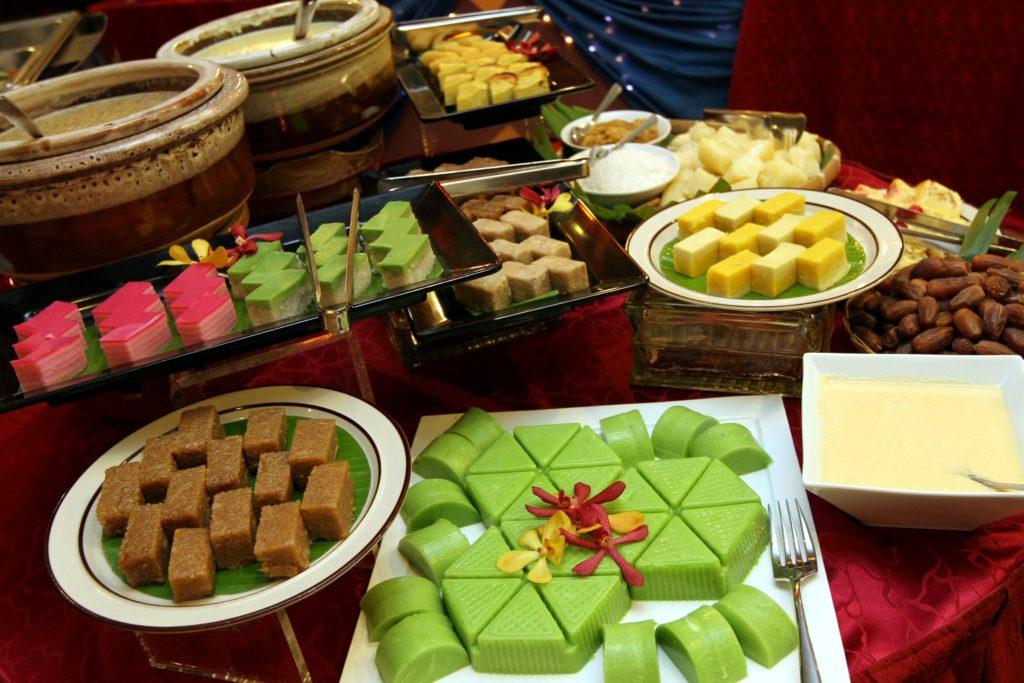
The Jalan Sultan area of the city is another hub of activity during Ramadan. The oldest mosque in the city, Sultan Mosque, is a national monument. The whole area is decorated with bright lights and a wide variety of food is sold.
Most Muslims buy food in Geylang Serai or Jalan Sultan to bring home for iftar or suhoor. Even non-Muslims enjoy this festive season.
One dish which is only served during Ramadan is a rice porridge cooked in every mosque to give out to Muslims after ʽasr prayers.
SOUTH AFRICA

When the sun sets on the first day of Ramadan, Muslims in South Africa gather in huge groups to eat elaborate iftar while dressed up in their best attire.
Many eat iftar out since there is an abundance of halaal restaurants especially in Durban, Capetown and Johannesburg.
Most Muslims living in South Africa are of Indian descent because colonists brought their ancestors over from Gujarat and other regions of India to work on sugar cane plantations. Their iftar is no longer mere traditional Indian dishes but a mix of everything from pasta to curries to brownies.
Other Muslims came from Indonesia and Malaysia to reside in the Cape Town area, where their traditional spices and cooking have found way into mainstream Capetonian cuisine. The salty, seaside breezes of the Waterfront Cape remind believers of the Greatness of their Creator.
Although the new government has been in place for more than a decade, one remnant of apartheid remains. Mostly everyone in South Africa has been brought up surrounded by his or her own kind of people, so communities still tend to keep to themselves, including Muslims from different backgrounds.
ISLAM
Why We Fast
By Umm Muhammad
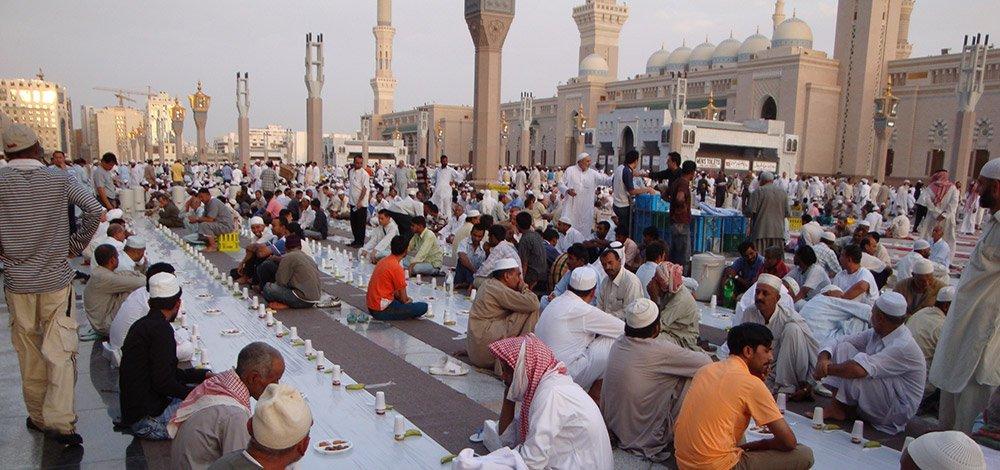
ONE might wonder why our Creator would require us to fast for a month out of every year, given that He is all-powerful, self-sufficient and not in need of anything from His servants. Indeed, He does not gain any benefit from His servants’ worship, nor is He harmed by their refusal. So why do we fast?
The Qur’an tells us: “O you who have believed, fasting is decreed upon you as it was decreed upon those before you that you may become righteous.” (2:183)
We notice in this verse that the purpose of fasting is stated: “that you may become righteous.” So fasting is a means to refine the soul and attain taqwā, which means righteousness, piety and consciousness of our Creator. We don’t wait to become better people before we fast, because righteousness is the outcome and result of fasting. Yet, it is not the reason we fast.
The answer to this question can only be: We fast in obedience to our Lord. For He said: “The month of Ramadan is that in which the Qur’ān was [first] sent down, as a guidance for the people and clear proofs of guidance and criterion. So whoever witnesses the month, let him fast it…” (2:185)
“And eat and drink until the white thread of dawn becomes distinct to you from the dark. Then complete the fast until the night.” (2:187)
In addition to the great rewards alluded to in prophetic narrations, there are a number of secondary benefits obtained in this world for those who fast. But while physical and moral benefits are definitely among the positive results of fasting, they cannot be the cause of it or the incentive for it. For a believer, not one of them may be cited as the reason for fasting.
The Muslim’s primary objective must be to fulfill his obligation to his Lord, to show servitude to Him, and to obey His command. If done for any other reason, the fast will not be accepted. In a hadith qudsi, Allah said, “Fasting is for Me, and l [alone] reward it.” (Al-Bukhāri)
The performance of righteous deeds is not an end in itself, but it reflects consciousness of Allah, who is aware of every action, word, thought and intention; and this motivates the believer toward honesty and precision in everything he does. Fasting reminds us of our subservience to Allah and demonstrates our submission to Him. Although one has the ability to indulge his physical desires, he refrains out of willing obedience. The Messenger of Allah ﷺ told us, “Whoever fasts Ramadan with faith and seeking its reward will have what preceded of his sin forgiven.” (Ahmad)
Fasting reminds us of our subservience to Allah and demonstrates our submission to Him. Although one has the ability to indulge his physical desires, he refrains out of willing obedience.
We are living in an age of immediate gratification, where human needs and desires expect fulfillment almost as soon as they surface. From a psychological perspective, the ability to detach themselves from physical desires gives fasting people the knowledge that they have a degree of control over their bodies. The ability to postpone gratification and practice patience is an important skill. It facilitates abstinence from sins and from many of the addictions that have become part of modern life.
But this is not why we fast.
Fasting has been shown medically to be beneficial to both bodily and mental health. It cleanses the body of accumulated toxins and wards off many diet-related illnesses. It improves health, sharpens the intellect and enhances powers of concentration. It trains the body to face conditions of scarcity and fight disease.
But this is not why we fast.
Fasting gives training in endurance and acceptance. It develops courage, strengthens resolve and conditions a person to cope with difficulties in all aspects of his life. And it helps develop the qualities that successful people possess: willpower, strength and capability.
But this is not why we fast.
Fasting gives lessons in punctuality as one has to adhere to a strict schedule of time in the observance of a fast. It provides a sense of mental, physical and spiritual discipline.
But this is not why we fast.
Fasting teaches us patience, self-control and appreciation of the provisions and pleasures we often take for granted. Being hungry helps us to adjust our perspective about food. It should make us more appreciative and less wasteful.
But this is not why we fast.
Fasting develops moral character and cultivates in us a sense of humbleness. It helps us control evil thoughts and trains us to overcome stinginess and greed. The effort required to endure hunger and thirst is extended to conquer anger and resentment. It teaches us to become more tolerant through our own discomfort.
But this is not why we fast.
Fasting helps believers detach themselves from physical desires and reduces their intensity. It enables them to develop an attitude of insignificance toward the present world and a preference for the Hereafter.
But this is not why we fast.
Fasting provides nourishment for the soul and has the effect of softening hearts. It produces compassion and generosity toward those less fortunate who cannot always relieve their pains of hunger at the end of the day and endure difficult conditions in their lives.
But this is not why we fast.
Fasting is about detoxification of the mind, body and soul. It creates the desire to become a better human being, and Ramadan is a great opportunity for believers each year to repent, amend themselves and thus change their destinies.
But this is not why we fast.
So why do we fast?
Only for our Creator… while awaiting our return to Him, hoping for His forgiveness and seeking His acceptance. For He has told us: “Allah intends for you ease and does not intend for you hardship, and for you to complete the [fasting] period and to glorify Allah for that to which He has guided you; and perhaps you will be grateful.” (2:185)
May Allah grant us the favor of fasting this month of Ramadan and accept it from us.
Virtues of Fasting, Ramadan, and related deeds

O you who have believed, decreed upon you is fasting as it was decreed upon those before you that you may become righteous. [Surah Baqarah, 2: 183]
In this verse the Creator states that He had enjoined fasting in some form upon the followers of earlier prophets. And He mentions the purpose behind it: “that you may become righteous.” So fasting is a means to attain righteousness, piety and consciousness of Allah (taqwá).
In a hadith qudsi, Prophet Muhammad ﷺ disclosed that Allah, the Mighty and Majestic, has said, “Fasting is for Me, and I [alone] reward for it.” [Bukhari]
“No servant fasts one day in the way of Allah but that Allah puts between his face and the Hellfire a distance of seventy years.” [Al-Bukhari and Muslim]
“Fasting and the Qur’an intercede for a servant on the Day of Resurrection (Qiyámah). The fast says, ‘O my Lord, I prevented him from food and desires by day, so let me intercede.’ And the Qur’án says, ‘I prevented him from sleep by night, so let me intercede.’ So they are allowed to intercede.” [Ahmad]
“By the One in whose hand is the soul of Muhammad, the breath of a fasting person is sweeter to Allah on the Day of Resurrection than the smell of musk. And the fasting person has two joys: when he breaks his fast he rejoices for that and when he meets his Lord he rejoices for his fasting.” [Ahmad and Muslim]
“Paradise has a door called ‘ar-Rayyán’. On the Day of Resurrection it will be said, ‘Where are those who fasted?’ And when the last of them has entered the door will be closed.” [Al-Bukhari and Muslim]
Abú Umámah reported that he said to the Messenger of Allah ﷺ, “Order me to do a deed which will allow me to enter Paradise.” He ﷺ replied, “Fast, for there is no equivalent to it.” [Ahmad and an-Nasá’i]
Allah, the Most Merciful, is especially attentive to one who is fasting. The Prophet ﷺ affirmed, “There are three whose supplication is not rejected – that of a fasting person until he breaks his fast, that of a just leader and that of someone oppressed.” [At-Tirmidhi, Ahmad and Ibn Majah – saheeh]
Virtues of Ramadan
The fast of Ramadan is a religious obligation (fardh) by authority of the Qur’án, the Sunnah and a consensus of Muslim scholars. The Qur’án conveys the commands of Allah, the Almighty:
O you who have believed, decreed upon you is fasting as it was decreed upon those before you.[Surah Baqarah, 2: 183]
The month of Ramadhan [is that] in which was revealed the Qur’an, a guidance for the people and clear proofs of guidance and criterion. So whoever sights [the new moon of] the month, let him fast it… [Surah Baqarah, 2: 185]
The Messenger of Allah ﷺ mentioned additional benefits of Ramadan: A blessed month has come. Allah has required you to fast it. During it the doors of Paradise are opened, the doors of Hell are closed and devils are chained. Therein is a night better than a thousand months. Whoever misses its benefit has surely been deprived. [Ahmad and an-Nasá’i]
Whoever fasts Ramadan with faith and seeking [Allah’s] reward will have whatever preceded of his sin forgiven. [Ahmad]
The five prayers, Friday [prayer] to Friday and Ramadan to Ramadan are expiation for what is between them when the major sins are avoided. [Sahih Muslim]
An ‘umrah during Ramadan is equal [in reward] to a hajj. [Ahmad and al-Bukhari]
Month of Charity and Quran
Ibn ‘Abbás reported: “The Messenger of Allah ﷺ was the most generous of people, and he was the most generous ever during Ramadan when [the angel] Jibreel would meet him. He would meet him every night of Ramadan and review the Qur’an with him. Then he was more generous than a swift, far-reaching breeze.” [Al-Bukhari]
Each year during Ramadan, the Prophet ﷺ reviewed all that had been revealed to him to date with Jibreel, and in the year before his death he did so twice. Muslims are encouraged to practice the sunnah of additional recitation and study of the Qur’án during Ramadan, as well as increased worship of all kinds.
The Messenger of Allah ﷺ said: “Whoever gives a fasting person iftár will have a reward like his, without reducing the reward of the one who fasted.” [At-Tirmidhi – saheeh]
Du’aa after Iftar
When the Messenger of Allah ﷺ broke his fast, he would say: “Dhahabath-thama’u wabtalatil-‘urooqu wa thabatal-ajru in sha’ Allah.” (Thirst has gone, the veins are refreshed and the reward is assured if Allah wills.) [Abu Dáwúd – hasan]
Fasting from Evil Deeds
The Prophet ﷺ confirmed, “Fasting is not only abstaining from food and drink, but from empty and immoral speech. So if someone should insult you or behave badly toward you, then say, ‘I am fasting, I am fasting.’ ” [Al-Hákim – saheeh]
And he ﷺ said, “Anyone who does not refrain from making false statements and acting upon them – Allah has no need of his refraining from food and drink.” [Al-Bukhari]
Another hadith states, “Possibly one who fasts gains nothing from his fast but hunger, and possibly one who stands in [night] prayer gains nothing from it but wakefulness.” [Ibn Májah and al-Hákim – saheeh]
Taraweeh or Night Prayers
The Prophet ﷺ encouraged it, saying, “Whoever performs night prayers in Ramadan out of faith and expecting reward, his previous sins will be forgiven.” [Al-Bukhari and Muslim]
Ali added, “He ﷺ would strive [in worship] during the last ten days of Ramadan more than at any other time.” [Muslim and at-Tirmidhi]
I’tikaf
The Prophet ﷺ used to observe i‘tikáf during the last ten days of Ramadan until Allah took his soul, and then his wives observed it after that. [Al-Bukhari and Muslim]
Zakat al-Fitr
Ibn ‘Umar reported: “The Messenger of Allah ﷺ made zakát al-fitr obligatory at the end of Ramadan – a measure of dates or barley – for the slave and the freeman, the male and the female, the young and the old among Muslims.” [Al-Bukhári and Muslim]
The Prophet ﷺ instructed: “Let them be satisfied on that day [of ‘Eid].” [Al-Bayhaqi]
Abu Sa‘eed al-Khudri reported: “During the time of the Prophet ﷺ, on the Day of Fitr, we used to give out one measure of food, and our food was barley, raisins, dried cheese and dates.” [Al-Bukhari]
Six Days of Shawwal
Fasting six days of Shawwál after completing the obligatory fast of Ramadan is a recommended sunnah. The Messenger of Allah ﷺ said: “Whoever fasts Ramadan and then follows it with six days from Shawwál – it will be as if he fasted for all time.” [Muslim, Abu Dáwúd, at-Tirmidhi, an-Nasá’i and Ibn Májah]
Another hadith states, “Whoever fasts six days after [the day of] Fitr has completed the year. He who brings a good deed will have ten like it.” [Ibn Májah and an-Nasá’i – saheeh]
Scholars explained that it is like a year of fasting because the reward of each good deed is multiplied by ten. Therefore fasting the month of Ramadan brings the reward of ten months, and fasting six additional days brings the reward of two months. This equals the fast of an entire year. [Sharh Saheeh Muslim, 8/56.]
Reference: Fasting in Islam by Saheeh International
Fasting In Islam
By Umm Muhammed
Fasting includes self-refinement and discipline. This booklet discusses the fast of Ramadhan, other obligatory fasts and the voluntary fasting prescribed in the Sunnah.
All About Suhoor and Iftār
By Zara Andleeb

IT is Allah’s mercy that He blessed us with two meals during this month of fasting so we could recharge and energize ourselves. We should educate ourselves about the meals to reap the best out of it, In sha Allah.
SUHOOR
Making the intention:
The intention (niyyah) means resolving to fast. It is essential to have the intention the night before, night by night, in Ramadan [Fatawa al-Lajnah al-Da’imah, vol. 10, p. 246, Islamqa.com]
Prophet ﷺ said: “Whoever does not have the intention of fasting before Fajr, there is no fast for him.” [Ahmad, saheeh]
The differentiating element:
Not having suhoor is contrary to the Sunnah; “The difference between our fasting and the fasting of the People of the Book is the (meal of) Suhoor.” [Sahih Muslim]
One should try his/her best to have Suhoor, at least with dates or a sip of water.
Blessed meal:
There is a blessing in suhoor. The Prophet ﷺ said: “Have Suhoor, as indeed there is a blessing in it.” [Al-Bukhari and Muslim] and he ﷺ also said: “Allah and his angels definitely send salutations on those who eat Suhoor.” [Ibn Hibban and At-Tabarani in Al-Awsat, hasan by Al-Albani]
Moreover, Suhoor is in a blessed time, the last third of the night, which is the best time to make du’aa and seek forgiveness.
The Prophet ﷺ said: “Our Lord, The Blessed, The Superior, comes down every night to the nearest Heaven to us when the last third of the night remains, saying: “Is there anyone to invoke Me, so that I may respond to his invocation? Is there anyone to ask Me, so that I may grant him his request? Is there anyone seeking My forgiveness, so that I may forgive him?” [Bukhari]
Dates:
Don’t forget to grab a date when in Suhoor; it will grab you a reward of Sunnah, and of course the energy that comes with it, In sha Allah! The Prophet ﷺ said: “How excellent are dates as the believer’s suhoor” [Abu Dawood, Ibn Hibban and al-Baihaqee; saheeh]
Delay it:
Have you heard of being rewarded for delaying something? Delaying Suhoor is a part of the Sunnah as the Prophet ﷺ said: “Hasten to (eating) iftar (in Ramadan immediately when the time is due), and delay (eating) suhoor.” [At-Tabaraani]
‘Amr ibn Maymoon, said: “The Companions would break their fasts immediately at sunset (without any delay) and would delay eating Suhoor (until as close to Fajr as possible).” [Al-Baihaqee]
One must stop eating when he/she is sure that the dawn has appeared.
Benefits of Suhoor:
- It prevents fatigue and headaches during the daytime.
- It reduces extreme hunger and thirst.
- It prevents the fasting person from feeling lazy, sluggish or in need of sleep.
- It prevents the loss of body cells.
- It energizes and stimulates the digestive system.
- It helps the body maintain its sugar levels while fasting.
- It spiritually assists the believer to fulfill fasting as an act of worship.
Recommended foods:
It is recommended to have foods that are rich in protein, fats, fibre and whole grain as these foods take at-least 7-9 hours to digest.
Have meats, whole wheat or grains, olive oil, cheese and eggs as a part of this meal. The body takes several hours to digest these types of foods, and thus your hunger would be delayed. They supply the body with the required energy throughout the day.
Do not consume large quantities of sugar or salt, because sugar triggers hunger, while salt triggers thirst.
It is also preferable to have salads that contain a high level of fluids, such as lettuce and cucumber, because they help the body maintain fluids for a longer period of time, which will reduce thirst and prevent dehydration.
Additionally, these types of vegetables are a good source for vitamins and minerals. [Islamweb.net]
IFTAR
No Delay:
Now here you must hurry up! (Everyone wants to hurry up here anyway.) The Prophet ﷺ said: “The people will continue to be in good condition as long as they hasten to break the fast.” [Bukhari and Muslim]
Anas ibn Malik said: “The Prophet ﷺ used to break his fast before praying by eating fresh dates, and if there were no fresh dates he would eat dried dates; if there were no dried dates, he would have a few sips of water.” [Classed as saheeh by al-Albani in Saheeh Abu Dawood, no. 560]
This differentiates us from the Jews and Christians and keeps us on the Sunnah, as the Prophet ﷺ said: “The people will remain upon goodness so long as they hasten to break the fast. Hasten to break the fast, for the Jews delay it.” [Ibn Majah, no. 1698]
What to eat:
It is recommended to break the fast with dates; the Messenger of Allah ﷺ said: “Whoever has dried dates, then let him break the fast with that, and whoever does not, then let him break the fast with water, for indeed water is purifying.” [Jami’-at-Timidhi, no. 694]
Du’aa before Iftar:
Make a list of all you desire of this world and the hereafter, you don’t want to miss out this special time for sure!
The Prophet ﷺ said, “When the fasting person breaks his fast, his supplication is not turned back.” [Sunan Ibn Majah, no. 1753]
And wait until you read this hadeeth; He ﷺ also said: “There are three whose supplication is not rejected: The fasting person when he breaks his fast, the just leader, and the supplication of the oppressed person; Allah raises it up above the clouds and opens the gates of heaven to it. And the Lord says: ‘By My might, I shall surely aid you, even if it should be after a while.” [Jami’-at-Tirmidhi, no. 3598]
And supplicate when you break your fast. The Messenger of Allah ﷺ used to say when breaking his fast: “Dhahaba al-zama’ wa abtalat al-‘urooq wa thabata al-ajr in sha Allah (Thirst is gone, the veins are moistened and the reward is certain if Allah wills).” [Abu Dawood, no. 2357]
Reward of a fasting person:
This act of worship is not worth leaving out. Just by providing iftar to a fasting person to break his/her fast, you can get a reward equal to that of a fast. That’s good business folks!
The Prophet ﷺ said: “Whoever gives someone something to break the fast with, he would have the same blessings as the fasting person and this would not reduce the blessings of the fasting person in any way” [Ahmad and At-Tirmidhi]
“And whatever the Messenger has given you – take; and what he has forbidden you –refrain from. And fear Allah; indeed, Allah is severe in penalty. [Qur’an 59: 7]
Our Salaf During Ramadan
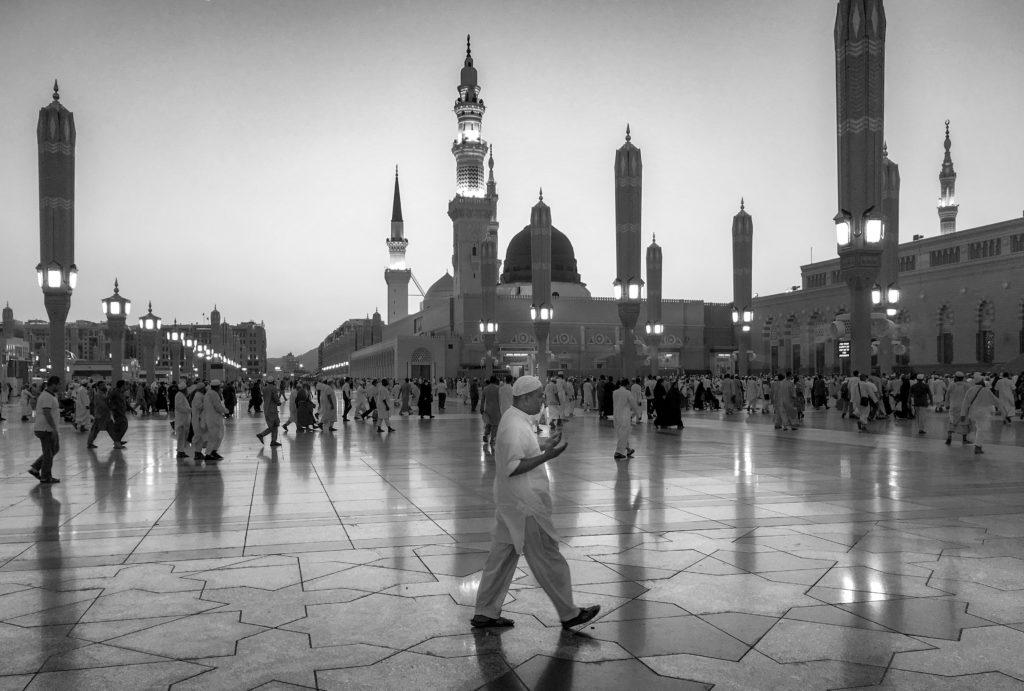
Learning from the early righteous Muslims is critical if we wish to revive Islamic practices in their true spirit. How did our salaf, the pious predecessors, observe Ramadan? In this article, we compile some narrations that throw light on their mindset and striving during this blessed month.
1. Wishing for Ramadan
Mu‘alla ibn al-Fadhl said, “The companions of the Prophet ﷺ would supplicate to Allah the Almighty for six months in advance to prolong their life until Ramadan. Then they used to supplicate Him for six months (after that) to accept their righteous deeds in it.”
Yahya ibn Abi Katheer said, “Among their invocations was, ‘O Allah deliver me to Ramadan and deliver Ramadan to me and accept it from me.’”
2. Considering it a purifier
‘Umar ibn al-Khattab, may Allah be pleased with him, would say at the arrival of Ramadan, “Welcome to the one who purifies us from sins!”
3. Seeking a lot of forgiveness
‘Abdullah ibn ‘Umar, may Allah be pleased with him, used to make this du‘aa upon breaking his fast: “Allahumma inni as’aluka birahmatika al-lati wasi‘at kulla shay’in an taghfira li (O Allah, I ask You by Your mercy which encompasses all things, that You forgive me).”
4. Abundant recitation of the Qur’an
Fatimah, may Allah be pleased with her, narrated that her father, the Prophet ﷺ told her that Jibreel would review the Qur’an with him once every year, and in the year of his death he reviewed it with him twice. [Al-Bukhari and Muslim], and from the Hadeeth of Ibn ‘Abbas that this was done at night. [Al-Bukhari and Muslim]
Some of the Companions, may Allah be pleased with them, would do that every seven days in the taraweeh. ‘Imraan ibn Hudayr said, “Abu Mijlaz would lead the night prayer in the neighborhood during the month of Ramadan, completing the recitation of the Qur’an entirely every seven days.”
Some of our righteous predecessors would complete it while praying at night during Ramadan every three nights, some others in seven nights while some others every ten nights.
Sufyaan ath-Thawri would leave all his work at the arrival of the blessed month of Ramadan and dedicate himself to the recitation of the Noble Qur’an.
5. Long taraweeh prayers
As-Saa’ib ibn Yazeed said, “‘Umar ibn al-Khattaab, may Allah be pleased with him, ordered Ubay ibn Ka‘b and Tameem ad-Daari to lead people in praying eleven rak‘ahs during Ramadan. The reciter would recite hundreds of verses to the extent that we would have to support ourselves with staves due to the lengthiness of the prayer and would not depart until the first signs of dawn.”
‘Abdur-Rahmaan ibn Hurmuz said, “I heard the Companions of the Prophet ﷺ cursing the disbelievers in Ramadan.” He added, “The reciters would recite Surah al-Baqarah in eight rak‘ahs, and if they recited it in twelve rak‘ahs people would think that it was short.”
‘By the time we finished our night prayers in Ramadan, we would rush the servants to prepare the food in fear of fajr approaching.’
Naafi‘ ibn ‘Umar ibn ‘Abdullah said, “I heard Ibn Abi Mulaykah saying, ‘I would lead people in prayer during Ramadan and read Surah Fātir and the like in one rak‘ah and no one complained about that.”
It was also narrated that they would continue praying until it was very close to dawn. ‘Abdullah ibn Abi Bakr said, “I heard my father saying, ‘By the time we finished our night prayers in Ramadan, we would rush the servants to prepare the food in fear of fajr approaching.’”
6. Private Worship
Naafi‘, the freed slave of Ibn ‘Umar, may Allah be pleased with him, said, “Ibn ‘Umar would pray in his house during Ramadan. When the people departed from the mosque, he would go off to the mosque of the Prophet ﷺ taking a flask of water with him. He would not leave the mosque again until after performing the morning prayer.”
7. Being Generous
Ibn ‘Abbas, may Allah be pleased with him and his father, said, “The Messenger of Allah ﷺ was the most generous person, and he would be even more so in the month of Ramadan because Jibreel would meet him every night in the month of Ramadan till it elapsed. The Messenger of Allah ﷺ would recite the Qur’an for him. When Jibreel met him, he would be more generous than the blowing wind in doing good.” [Al-Bukhari and Muslim]
Ibn Rajab said, “Ash-Shaafi‘i said it is better for men to be exceedingly generous during the blessed month of Ramadan, following the example of the Messenger of Allah ﷺ .”
Ibn ‘Umar, may Allah be pleased with him, did not have his Iftar except in the company of the needy.
9. Eating Less
Ibrahim ibn Abi Ayyoob said, “Muhammad ibn ‘Amr al-Ghazzi would eat only two meals a day throughout the whole month of Ramadan.”
Muhammad ibn Waasi‘ said, “Whoever eats little will understand and make others understand and will be clear and humble. Overeating weighs a person down and keeps him from much of what he wants [to accomplish].”
Salamah ibn Sa‘eed said, “A man would be taunted because of overeating in much the same way he would be when he committed a sin.”
Ibn Umar narrated that a man burped in the presence of the Messenger of Allah ﷺ who responded: “Keep your burps away from us, for the one who eats his fill the most in this world will be hungry for the longest time on the Day of Resurrection.” [At-Tirmidhi, classified hasan by al-Albani]
10. Guarding the Tongue
Abu Hurayrah, may Allah be pleased with him, narrated that the Messenger of Allah ﷺ said: “Whoever does not give up false speech and acting upon it, Allah has no need of his giving up his food and drink.” [Al-Bukhari]
Jabir ibn ‘Abdullah, may Allah be pleased with them, said, “If you fast, then guard your ears, eyes and tongue against lies and evil deeds; do not abuse your servants; be tranquil and dignified on the day you observe fasting; do not let the day when you do not fast and the day when you fast be the same.” [Ibn Abi Shaybah in the book of fasting, chapter of avoiding too much talking and lying for the fasting person 2/422]
“Whoever avoids two things, then his fast will be safe: backbiting and telling lies.”
‘Ataa’ said,“I heard Abu Hurayrah, may Allah be pleased with him, saying. ‘If you are fasting, do not act in an ignorant manner or insult people, and if someone attacks you, then say, ‘I am fasting.’’” [‘Abdur-Razzaaq in Al-Musannaf]
Mujahid, may Allah have mercy upon him, said, “Whoever avoids two things, then his fast will be safe: backbiting and telling lies.” [Ibn Abi Shaybah]
11. The Last 10 Nights
Aisha, may Allah be pleased with her, said, “When the last ten days began, the Prophet ﷺ would stay up at night, wake his family, exert himself, and tie his izaar (lower garment) tight.” [Al-Bukhari and Muslim]
Ibn Jareer said,“Many of the righteous predecessors would perform ghusl (ritual bathing) every night during the last ten days of Ramadan. Ayyoob as-Sakhtiyaani would do the same and Imam Malik would do so for the night in which he believed was the Night of al-Qadr. So he would wash himself, wear nice fragrance and dress up in a garment which he did not wear again except in the Ramadan of the following year.”
Let us try as much as we can to follow their footsteps so we may be like them and attain success in sha Allah.
‘I Embraced Islam because of Ramadan’
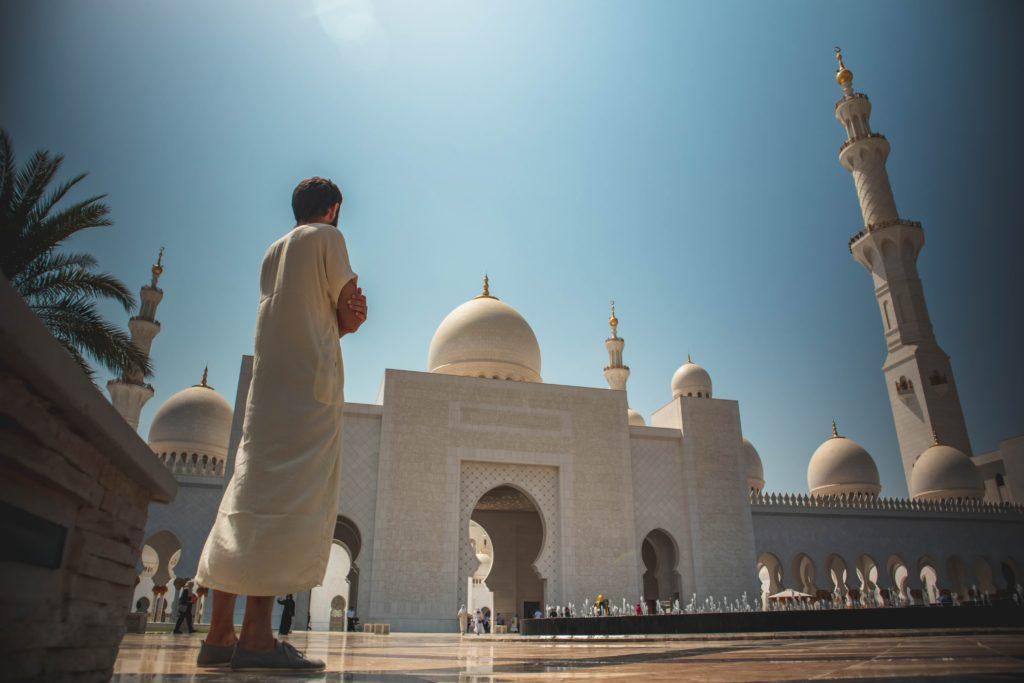
Non-Muslims are intrigued into learning about Islam through Ramadan and many end up embracing the religion, alhamdulillah. In this compilation, we share comments from reverts who embraced Islam after being influenced by Ramadan while living in the UAE.
‘Being a part of Muslims’
“Muslims wait for the onset of Ramadan, they fast during the month of Ramadan. They are very humble during these days and much more devoted to almighty God. I just thought of being a part of Muslims during this holy month and I accepted Islam.”
– ELIZABETH WANJING, SALWA, KENYA
‘We were cleaners’
“We were working for XXX School as cleaners. During the month of Ramadan everyone is fasting. No eating food, no drinking water, teachers and students all together. So, we all decided to fast and be a part of teachers and students. In the beginning, we continued fasting because of less work. But slowly, we could not spend any day without fasting. By the help of teachers and students, later we accepted Islam.”
– SELVI KIDNAN, SARA, SRI LANKA
‘Fasting for health’
I have been told that fasting is not only spiritual devotion, rather fasting helps people to be fit and perfect. Fasting does not make person lose his health rather helps in being healthy. I started fasting and became close to Islam.
– ADRIANA MONICA, NADIA, ROMANIA
‘I was fasting before Islam’
Before accepting Islam, I was fasting from six years. My parents were very angry at me because of my fasting and they were afraid that I will accept Islam. It was during one of the months of Ramadan, I decided to accept Islam.
– FLORDELZA NECOSIA AMEERA, PHILIPPINE
‘The Adhan and Iftar’
Muslims break their fast during the month of Ramadan in affiliation and sincerity. Sitting together and breaking fast together on the hearing of adhan is one of the best ways of showing brotherhood. My Muslim colleagues used to call me for Iftar while they were all together breaking their fast in our office.
– IGOR BRAZDA, BILAL, CHIC
‘The way Muslims celebrated Eid’
As I used to call my Muslim friends for birthday parties and Diwali celebrations, my Muslim friends used to call me for Eid celebrations at their home. During Eid they had no dance nor singing, rather they go to pray, hug each other, visit relatives, help needy and show affection, and enjoy gracefully every moment of Eid.
– SOBHNA VASC, SAJIDA, INDIA.
‘Giving charity in Eid’
Celebrating Eid means not only eating sweets; it was much more than that for Muslims. Specially giving (charity) is one of the best parts of Eid. Giving money, food, clothes and visiting poor relatives and making them smile; Eid is all about celebration but for a good cause.
– MUNA REGMI, ASMA, NEPAL.
‘Muslims’ generosity towards us’
Muslims are very charitable and help poor and needy. Arab Muslims helped us after my father went into coma and they paid the flat rent, school tuition fees and even they continually provided food items for us. Me and my mother accepted Islam because of their generosity and character.
– RONALYN RAGOS, FATIMA, PHILIPPINES
‘Muslims’ manners towards the needy’
I am from Tamil Nadu, the only reason I accepted Islam is Muslims’ manners towards poor and needy people. I am working for a telecommunication company and most of my friends are Muslims. They have a system in spending money for good causes. I saw them helping cleaners and security persons in our office whereas I never did that. That impressed me to know Islam and Muslims.
– ARUMUGAM, YASIR, INDIA.
Excerpted from a book published by Dubai’s Islamic Affairs Ministry
INSPIRATION FOR RAMADAN
How They Changed & Became Great
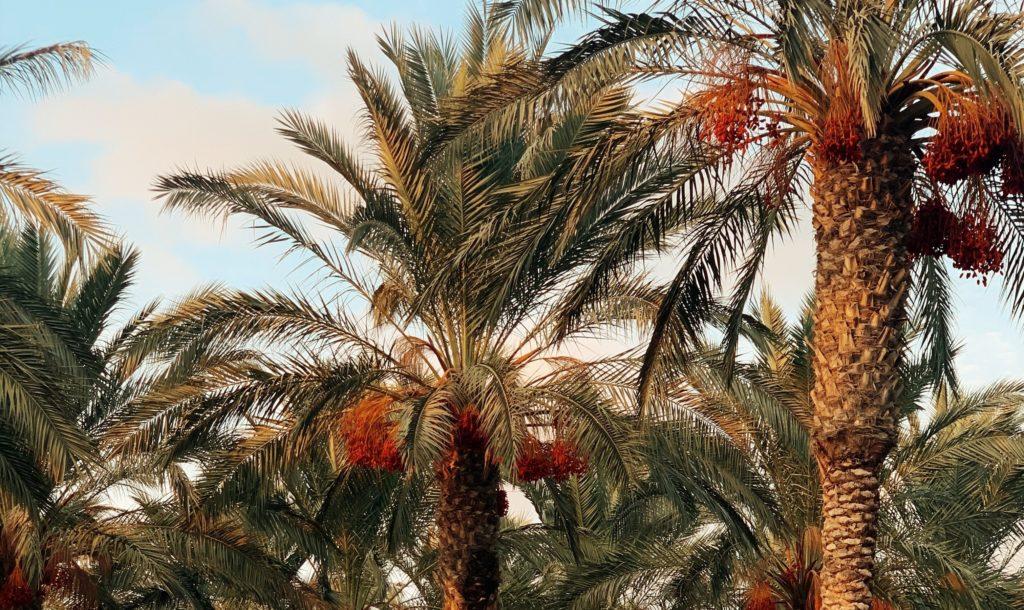
Ramadan is a month in which we aspire to become better Muslims. Here are a few inspirational stories from the people of the past who changed and became better. Let’s make this Ramadan the change for our lives in sha Allah.
Al-Fudayl ibn Iyaad
Al-Fudayl bin Iyaad (d. 187H) is famous for his piety and worship. But he was not always a practicing Muslim. In his early years, al-Fudayl was a notorious highway robber. He would prowl in the night for victims on the road from Abiward to Sarakhs. Between these two cities was a small village in which lived a girl that al-Fudayl was in love with. One night, out of desperation to be with her, al-Fudayl climbed the wall of her home. As he was climbing over it, he heard a voice recite:
أَلَمْ يَأْنِ لِلَّذِينَ آمَنُوا أَنْ تَخْشَعَ قُلُوبُهُمْ لِذِكْرِ اللَّهِ
Has not the time come for the hearts of those who believe to be affected by Allah’s Reminder? [Quran 57:16]
At that moment, al-Fudayl answered, “O my Lord, the time has indeed come.” He returned from where he came and sought refuge near a traveling party on the main road. They were busy engaging in a serious discussion. al-Fudayl heard one of them say, “Let us continue our journey now.” Another answered, “No, not until the morning, for al-Fudayl is lurking on the road somewhere out there, just waiting to rob us.”
Having heard the entire conversation, al-Fudayl thought to himself, “I go around in the night to sin, while a group of Muslims remain here because they fear me. Indeed I feel that Allah has brought me here to them only so that I can reform my character. O Allah, I indeed repent to you..”
Al-Fudayl went on to become a pious and learned ascetic whose sayings are quoted till today for their depth and wisdom.
Humaid bin Jaabir
Ibrahim bin Bashaar narrated:
“While I was walking towards Kufah with Ibrahim bin Adham (d. 165H), he stopped beside a grave and invoked Allah to have mercy on its dweller. “Whose grave is this,’ I asked.
‘It is the grave of Humaid bin Jaabir,’ said Ibrahim. ‘He was once the leader of all the townships that are in this area.’
‘What was so special about him?’ I asked. Ibrahim told me that he was a very rich leader who would spend his nights enjoying frivolous games and entertainment.
‘One night he fell asleep and saw a dream in which a man was standing over his head,’ said Ibrahim. ‘The man had a book in his hand, which Humaid grabbed and tore open. The words inside were written with gold [ink]. They ran as follows:
Do not prefer my Fire over my Light, and do not be deceived by what you own in this world, for what you own is preventing you from getting what is saved for you in the afterlife. True, what you have might have been called a kingdom, had it not been for the fact that it will all soon perish. And your life might have been called a life of happiness and joy, had it not been for the fact that it will be followed by anxiety and misery. So beware of falling under the spell of these worldly ornaments, or you will join the ranks of the destroyed ones.
وَسَارِعُوا إِلَى مَغْفِرَةٍ مِنْ رَبِّكُمْ وَجَنَّةٍ عَرْضُهَا السَّمَاوَاتُ وَالْأَرْضُ أُعِدَّتْ لِلْمُتَّقِينَ
And march forth in the way [which leads to] forgiveness from your Lord, and for Paradise as wide as are the heavens and the earth, prepared for al-muttaqoon. [Quran 3:133]
Humaid then woke up in a terrified state,’ continued Ibrahim.
‘Resigning from his post as leader, Humaid betook himself to this mountain, where he led a simple life, doing menial work to maintain his physical upkeep, but dedicating most of his time to the worship of Allah. I came here once and met him, and by keeping company with him, I found him to be a noble man. I would thereafter continue to visit him until he died.’ ” [Al-Mawaa’idh wal-Majaalis: 179]
The Burglar and Malik bin Dinar
A burglar scaled the wall of Malik bin Dinar’s house one night and easily managed to get inside. Once inside the house, the thief was disappointed to see that there was nothing worth stealing. Malik was inside at the time and busy performing prayer. Realizing that he was not alone, Malik quickly ended his prayer and turned around to face the thief. Without showing any sign of being shocked or afraid, Malik calmly extended greetings of peace and then said, “My brother, may Allah forgive you. You entered my home and found nothing that is worth taking, yet I do not want you to leave my home without taking away some benefit.”
He stood up, went to another part of the room, and came back with a jug full of water. He looked into the eyes of the burglar and said, “Make ablution and perform two units of prayer, for if you do so, you will leave my home with a greater treasure than you had initially sought when you entered it.”
Much humbled by Malik’s manners and words, the thief said, “Yes, that is a generous offer indeed.”
After making ablution and performing two units of prayer, the burglar said, “O Malik, would you mind if I stayed for a while, for I want to stay to perform two more units of prayer?”
Malik said, “Stay for whatever amount of prayer Allah decrees for you to perform now.”
The thief ended up spending the entire night at Malik’s house. He continued to pray until the morning. Then Malik said, “Leave now and be good.”
But instead of leaving, the thief said, “Would you mind if I stayed here with you today, for I have made an intention to fast the day?”
“Stay as long as you wish,” said Malik.
The burglar ended up staying for a number of days, praying during the late hours of each night and fasting throughout the duration of each day. When he finally decided to leave, the burglar said, “O Malik, I have made a firm resolve to repent for my sins and for my former way of life.”
Malik said, “Indeed, that is in the Hand of Allah.”
The man did mend his ways and began to lead a life of righteousness and obedience to Allah. Later on he came across another burglar he knew. [His friend] said to him, “Have you found your treasure yet?”
He said, “My brother, what I found is Malik bin Dinar. I went to steal from him, but it was he who ended up stealing my heart. I have indeed repented to Allah, and I will remain at the door [of His mercy and forgiveness] until I achieve what his obedient, loving slaves have achieved.” [Al-Mawaa’idh wal-Majaalis: 85]
The Big Fight of Ramadan: Get over your self!
By Rahla Khan
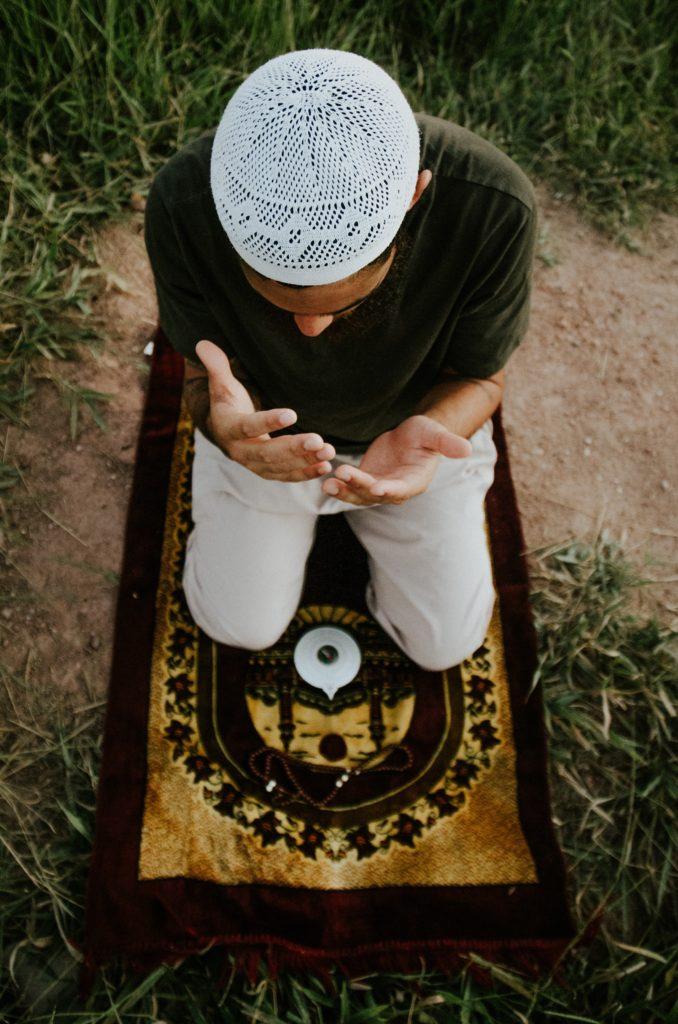
Ramadan is the month of conquests, when Muslims have been blessed with numerous historic victories: there was the Battle of Badr (Ramadan 17, 3 AH), when a miniscule, ill-equipped Muslim force defeated a 1000-strong contingent of Arabia’s haughtiest warriors; there was the Conquest of Makkah (Ramadan 20/22, 8 AH), when the Muslims peacefully took charge of the city that had once mercilessly hounded them out.
Some years later, Muthanna bin Harithah and Abdullah al-Bajily defeated the Persian leader Mahran in the Battle of Buwayb, conquering the lands between the Tigris and Euphrates (Ramadan, 13 AH); and an important peace treaty was signed after the ruler of Egypt, Abdullah bin Abi as-Sarh defeated the king of the Nubians (who had broken an earlier peace pact) leading to the spread of Islam in eastern Africa (Ramadan, 31 AH).
Much later, there were other battles: Tariq bin Ziyad literally burnt his boats at Gibraltar (Jabal-al-Tariq, the Mountain of Tariq), urging his forces on with the words: “Where would you flee? Behind you is the sea, before you, the enemy. You are left now with only the hope of your courage and your constancy,” which eventually led to the opening of al-Andalus (Ramadan 92, AH).
Salahuddin al-Ayyubi drove the Crusaders out of the lands they had occupied in and around Syria (Ramadan, 582 AH); the Egyptian ruler, Saifuddin Qutuz, stemmed the tide of the ravaging Mongols, taking off his helmet in the heat of battle and urging his army to victory in the second Battle of ‘Ayn Jalut (15 Ramadhan, 658 AH); and Abu’l Futuh, Rukn al-Din Baibars al-Bunduqdari, opened the city of Antioch (14 Ramadhan, 1260 CE) to the Muslim victory.
What is inspiring and uplifting about these conquests is that the Muslims rose above their selves – ignoring their disadvantages in the face of a stronger enemy and their mutual differences – in serving a higher cause. And what is heartening is that we all have the faculties to defeat an ever-present enemy: the desires and evil whispers of our self, which, according to the Prophet ﷺ, is a bigger victory than gaining advantage over an enemy at war.
Imam Ibn al-Qayyim al-Jawziyyah writes:
“The most compulsory form of struggle is the struggle against the nafs; against unbridled passions (hawa); against the shaytan; and against being worldly (dunya). Those who struggle against these four, in obedience to Allah, shall be guided by Allah to the paths of His good pleasure which, [in turn], will lead to His Paradise. Those who neglect this struggle will be veiled from guidance to the extent that they not only forsake the struggle, but they also overlook the need for it.”
Today, even as we remind ourselves of the glories of our past, we remain preoccupied with serving and gratifying our Self, so that we barely have the time and energy to devote to any other cause.
Today, our days are for earning money, our nights are for spending it; our free time is for indulging ourselves and our families, our interests lie in broadening our avenues of self-indulgence – and our pattern of behavior does not change much in Ramadan either.
In the book 30 Lessons for Those Who Fast, the author writes:
“Perhaps the greatest benefit that accrues to a Muslim in this blessed month [Ramadan] is his repentance, his return to Allah, and his evaluation of self and personal history. The door of repentance is opened, the grace of your Lord is guaranteed, His favor comes and goes; but where are those who repent and seek forgiveness?”
“Perhaps the greatest benefit that accrues to a Muslim in this blessed month [Ramadan] is his repentance, his return to Allah, and his evaluation of self and personal history.”
In Jihad al-Nafs: The Greater Struggle, the author writes:
“The Qur’an describes the human soul (nafs), as having three conditions or potentials which are present within it simultaneously: The first, or lowest, of these is referred nafs al-ammara bi as-suu’ (the soul that constantly incites to evil) which is the abode of a multitude of incessant cravings and desires: be it for wealth, fame, power, physical gratification, exploitation of others – in short, anything that deflects one away from Allah and towards the lower, bestial possibilities of the human condition.
As a believer purges his soul of blameworthy traits and seeks to replace them with their praiseworthy opposites, the soul that incites to evil is gradually trained and tamed and begins to give way to the nafs al-lawwāma (the reproachful soul).
This soul is man’s active conscience which is afflicted with regret, remorse and self-reproach whenever the Divine Will is disobeyed and elements of the lower soul are resurfaced.
After much inner labour and discipline, the reproachful soul is further purified of any opposition to Allah’s Will and Sacred Law and is ever receptive to the outpourings of Heaven. Here the nafs al-mutma’inna (the soul at peace, or tranquil soul) then begins to predominate.
In all this, four factors are crucial in a person’s seeking to purify his soul: innate or inborn disposition; upbringing; spiritual striving (mujāhada) and self-discipline (riyādha) in adulthood; and of course, Allah’s tawfeeq, or enabling grace.”
As we pray for sincere repentance in these Days of Forgiveness, may Allah grant us victory against the two main causes that impede our path:
- The proud self, which finds it difficult to humble itself before the Lord of the Worlds and towards the people it has wronged.
- The deluded self, which either remains unaware of the sins it commits on a daily basis or belittles them and considers them too small to warrant punishment in the Hereafter.
OVEREATING IN RAMADAN:
Whose sunnah are we following?
By Rahla Khan
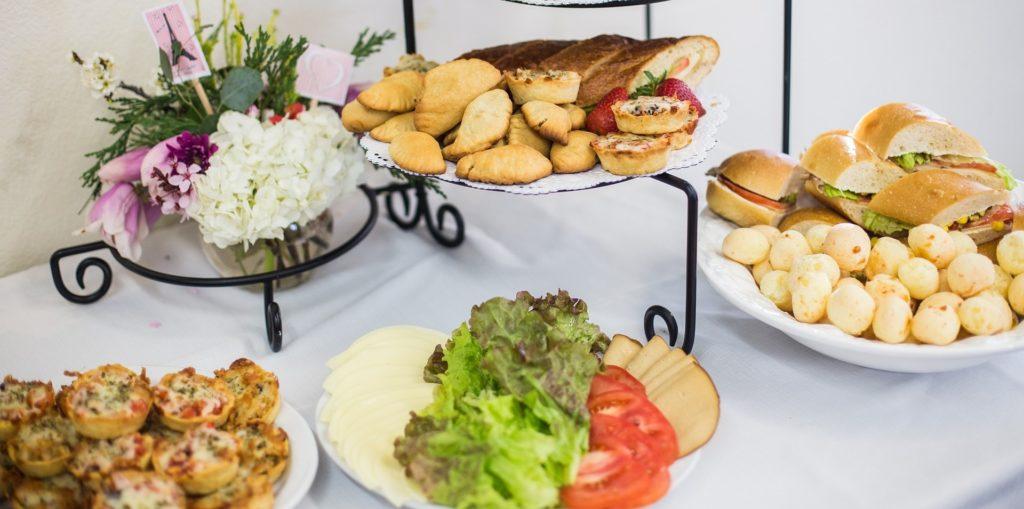
LOOKING at the surfeit of food on our sufras, it never ceases to appall me how much time, energy, expense and effort is spent in preparing, consuming, serving and clearing up elaborate meals in the name of “maintaining Ramadan traditions.”
It’s no secret that harried housewives and working women have resorted to outsourcing traditional Ramadan fare, and rather than going through the elaborate ordeal of conjuring a multi-course homemade meal every single day, they simply pay someone to supply it. After all, Ramadan “traditions” must be maintained, never mind the cost.
It makes me wonder: Who taught us the tradition of the over-laden table and the distended stomach?
“The offspring of Adam fills no vessel worse than his stomach.“
It was certainly not our Prophetﷺ whose Sunnah we are obligated to follow. Doesn’t it strike us as hugely ironic, that even as we make Ramadan resolutions to improve our acts of worship, and strive to develop ittibaaʽ (practice/following) in other areas of our lives, we tend to conveniently overlook this aspect of the Prophet’s life – his moderation to the extent of abstinence in indulging his appetite?
Are we the Ummah of the Prophetﷺ who said: “The offspring of Adam fills no vessel worse than his stomach. Sufficient for the child of Adam are a few morsels to keep his back straight. If he must eat more, then a third should be for his food, a third for his drink, and a third left for air?” [Musnad Ahmad]
Going by the statistics, which state that cases of acute indigestion and a host of other digestive disorders increase by almost 48 percent all over the world at the beginning of Ramadan, it certainly doesn’t seem so.
For curiosity’s sake, let’s take a look at some of the things the Prophetﷺ is reported to have broken his fasts with:
• The Messenger of Allah ﷺ used to prefer breaking the fast with dates, and if he did not find any, he would then break it with water.
• Anas Bin Malik (may Allah be pleased with him) said: “The Prophet ﷺ used to break his fast with fresh dates before he prayed. If he did not find fresh dates then he would use dried dates. If he did not find that also he drank a few sips of water. (Ahmad and Abu Dawood)
• Abdullah bin Awfa narrated: “We were in the company of the Prophetﷺ on a journey and he was fasting, and when the sun set, he addressed somebody, “O so-and-so, get up and mix sawiq (a coarse mixture of ground wheat and barley) with water for us.” He replied, “O Allah’s Apostle! (Will you wait) till it is evening?” The Prophet said, “Get down and mix sawiq with water for us.” He replied, “O Allah’s Apostle! (If you wait) till it is evening.” The Prophet said again, “Get down and mix sawiq with water for us.”
He replied, “It is still daytime.” The Prophet said again, “Get down and mix sawiq with water for us.” He got down and mixed sawiq for them.
The Prophet ﷺ drank it and then said, “When you see night falling from this side, the fasting person should break his fast.” [Sahih Al-Bukhari]
There are many lessons to be learnt from these narrations that give us an insight into the sublime character of the Prophetﷺ and the intended spirit of fasting.
The Prophetﷺ preferred to break his fast with food that was easily available, and did not disdain to break his fast with a few sips of water if there was no food. It was his custom to follow a simple, macrobiotic diet and he did not order special dishes made to break the fast with – although there were some dishes which were considered delicacies in those days like tharid (meat mixed with bread), talbinah (a sweet), soups, vegetables, roasted meat and dishes prepared with cheese and refined butter – which he enjoyed occasionally.
The Prophetﷺ did not make a “tradition” of indulging his appetite – a fact which should give his Ummah plenty of food for thought. Whose “traditions” are we following when we sit down to our smorgasbords every day? And whose traditions are more worthy of being followed?
Hunting For The Ramadan Spirit
By Rahla Khan
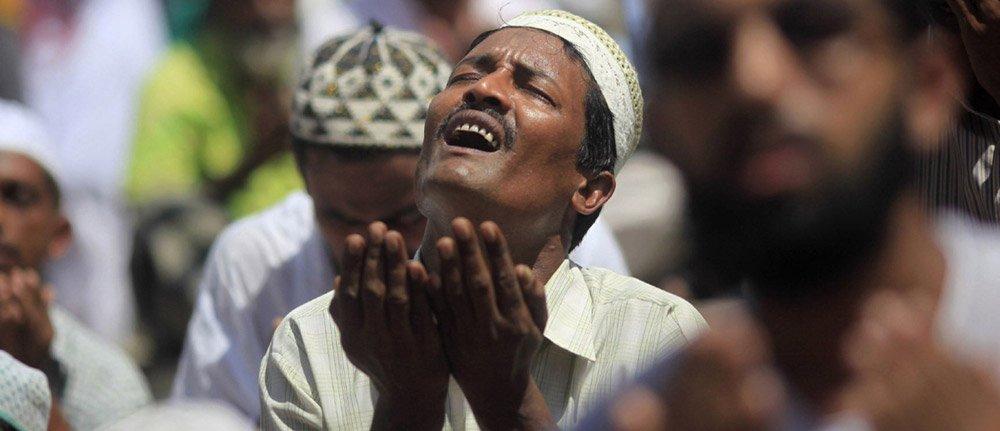
MOST people my parents’ age would say that Ramadan is less “family-oriented than it used to be” and it seems to be the time where Arabic TV series and game shows dominate. One thing is for sure, the Ramadan spirit is not what it used to be, that I can say! – a commentator on waleg.com
A New York Times article on the commercialization of Ramadan summed up the sentiment nicely with the headline: “It’s beginning to look a lot like…” Certainly, the month of fasting, prayer and reflection has begun to feel quite like the month of indulgence, entertainment and self-absorption at the hands of advertisers, traders and broadcasters.
Thanks to the fitrah (the sound innate disposition) upon which humanity has been created, the soul instinctively rebels and strives for purity even in the face of corrupting influences. In recent years, spontaneous online campaigns have been launched by youngsters on Facebook promoting a TV-free Ramadan (dubbed Fasting From TV).
Jeddah-based Islamic speaker Ahmad al-Shughairi popularized the ‘One Million Good Deeds’ endeavor, encouraging Muslims to seize the opportunities for good deeds throughout the month even if they are seemingly “trivial” – such as feeding the fasting poor, donating clothes and household goods or sponsoring medical treatment for the needy.
What emerges from the success of these campaigns – and similar ones around the world – is that the spirit of Ramadan is revived by self-reflection and taking oneself to account; focusing on fulfilling the rights of Allah, His Messenger and our fellow Muslims, instead of making our own self and its whims and desires the center of our universe.
The Prophet ﷺ, his Companions and the generations that followed them in ihsaan (perfecting good deeds) and ikhlaas (sincerity) brought the Ramadan spirit to life with their actions. Here’s how we can emulate them:
Acquiring knowledge
Most of us may not have the benefits of an Islamic education from our early childhood, and may still be in the process of learning about acts of worship and the correct manner of performing them.
The good news is that today, there are numerous means besides the traditional halaqahs organized in masjids and Islamic centers by which we can acquire authentic information: audio and video lectures, radio and TV discourses, and the internet by the scholars of Ahl-al-Sunnah. It’s a good idea to utilize our time before the start of Ramadan in learning more about the importance of the month, the acts of worship that are considered most meritorious within it, and the best way to perform them by consulting people of knowledge.
Al-Hasan al-Basri used to say, “Allah made the month of Ramadan a racetrack where His creatures compete in obeying Him to attain His pleasure. Some people come first and thus have won; others lag behind and thus lose out. How amazing is the state of the runner who has cause to laugh on the day when the doers of good win and the doers of falsehood lose!”
Being eager to seize every opportunity for good deeds
The righteous actions performed during a single month of Ramadan may raise a person’s rank beyond their own estimation, as is evident from the story narrated by the Companion Talhah bin Ubaydullah (may Allah be pleased with him):
There were two men from the tribe of Baliyy who came to the Prophetﷺ and embraced Islam at the same time. One of them was more active in worship than the other, and it so happened that he was martyred in a battle and the other one lived for one more year. Talhah (may Allah be pleased with him) said, “I saw in my dream that I was at the gate of Paradise and the two men were standing there. Someone came out and gave permission to the man who lived for one more year to enter Paradise, then gave permission to the martyr. He then returned to me and told me to go back for permission had not been given to me yet.”
In the morning, Talhah (may Allah be pleased with him) related to the people what he saw and they were surprised to know this. When the news of this story reached the Prophetﷺ he said, “Why are you surprised?” They said, “O Messenger of Allah, the man who was martyred was more active in worship, but the other one entered Paradise before him.”
The Prophet ﷺ said: “Did he not live for one more year?” They answered in the affirmative. “Did he not fast for one more Ramadan?” the Prophet, continued, “and prayed such-and-such number of prostrations in this year?” They answered in the affirmative. The Prophet ﷺ said: “The difference between them is equal to the distance between the heavens and the earth.” (Ibn Hibban: Saheeh)
Aiming high and going the extra mile
The Prophet ﷺ said: “Allah sets free from Hell some people at every breaking of the fast, and this happens every night.” (Ibn Majah, Ahmad) Who among us would not desire to be one of these fortunate ones? The Companions of the Prophet used to step up their efforts with the advent of Ramadan – be it in their worship at night, completing the recitation of the Qur’an several times during the month, or even depriving themselves to give food in charity.
One of our righteous predecessors said, “Charity cannot be perfected except with three characteristics: hastening, considering it negligible in our own eyes, and concealing it.” Surely, this is also true of all acts of worship – may Allah accept whatever He guides us to, out of His mercy.
Why Remembering Death will Help Us in Ramadan
By Rahla Khan
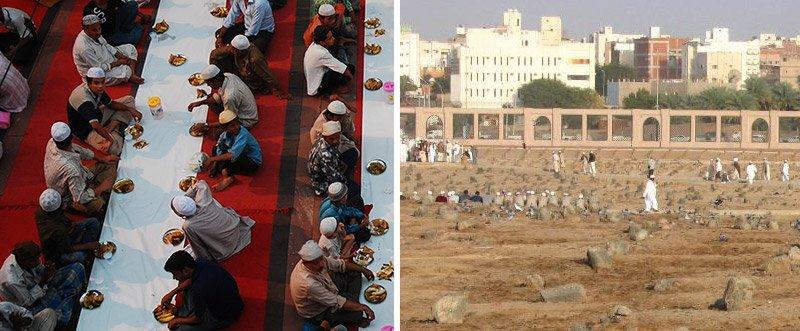
I remember the beginning of Ramadan a few years ago: the festive supermarkets with their jampacked aisles, the makeshift roadside stalls outside restaurants selling crisp sambusas and subiya, the sounds of adhan emanating from masajid…
My house overlooked a Maghsalat-al-Amwaat al-Khairiyyah (a charitable organization which prepares bodies for burial in the Islamic manner), and as I walked home from the neighborhood supermarket laden with packages of food and other essentials in preparation of the next day’s fast, I caught sight of a family accompanying a bier in a hearse. The women huddled together, sobbing quietly, while the men stood at a distance in somber silence.
It struck me: While I was going home to the comfort of my home and the company of my family, this person was being dispatched alone, to answer the stern questioning of the grave. While I would be given the opportunity to fast and perform other deeds as Allah willed, this person, who had been given the same opportunity in past years, had been deprived of it this year.
Our imam and khateeb, may Allah preserve him, used to remind the congregants of the favors of Allah in allowing us to witness yet another Ramadan, by contrasting our state with those of the people of the graves, who would gladly give the world and all that is in it if they could, in lieu of the chance to worship Allah a little more, to add the tiniest good deeds to their scale that would enable them to draw closer to Paradise and take them further away from the Fire.
In a khutbah, Imam Abdul Bari al-Thubayti, may Allah preserve him, said:
“Whoever remembers death frequently is honored with three things: hastening towards repentance, contentment and energy in performing acts of worship; and whoever forgets death is punished with three things: delaying repentance, lack of contentedness and laziness in acts of worship.”
“The one who remembers death most often and the one who is best prepared to meet it. These are the truly wise, honored in this life and distinguished in the Hereafter.”
With disturbing reports of the coronavirus from all over the world, it is no wonder that our thoughts naturally turn to death and dying.
Unlike some belief systems which consider the contemplation of death “inauspicious” or “macabre”, Muslims are encouraged to regularly remind themselves and others about the inevitable end of life, and what awaits a person in the Hereafter.
In the “Book of Remembrance of Death and What Follows It” in Ihya Uloom-ud-Deen, Imam Abu Hamid al-Ghazali mentions a narration on the benefits of remembering death:
The Mother of the Believers, Aisha (may Allah be pleased with her), asked the Prophet ﷺ: “Will anyone be raised with the martyrs (on the Day of Resurrection)?” The Prophet ﷺ replied: “Yes, the one who remembers death 20 times (or more) within the space of a day and a night.”
The Prophet ﷺ once stood at the edge of a grave and called out to his Companions: “O my brothers! For this, prepare yourselves.” (Ibn Majah) And in another narration, he said: “O people! Remember often the destroyer of pleasures: death.” (At-Tirmidhi, an-Nasa’i, Ibn Majah)
The injunction to “remember death abundantly” is not a command designed to scare us into righteousness; rather, it is a positive counsel that spurs us to seize every small and big opportunity to earn the pleasure of Allah, and prepare ourselves for the Day “when neither wealth nor sons will benefit anyone, except (the one) who comes to Allah with a clean heart.” (Qur’an, 26:88)
Once a man asked the Prophet ﷺ, “Who is the wisest among the people, O Messenger of Allah?” He replied: “The one who remembers death most often and the one who is best prepared to meet it. These are the truly wise, honored in this life and distinguished in the Hereafter.” (Ibn Majah, at-Tabarani).
The remembrance of death acquires a special significance with the advent of Ramadan, since it is the season of hope and blessings and an opportunity to earn innumerable rewards that can be reaped eternally, which is open to everyone equally.
Yet, many of us greet Ramadan with a sense of complacent déjà vu, a “been-there, done-that” lassitude, that could cost us dearly.
Let’s face it: for many of us Ramadan has turned into a time for socializing with friends and extended family, spending hours preparing and sampling traditional dishes, watching TV sitcoms from iftār to ishā’ – to the extent that we even spend the precious nights of Ramadan in auto-pilot mode, performing our prayers perfunctorily before hitting the supermarkets, malls, coffee shops and internet cafes to shop or while the night away.
Somewhere at the back of our minds is the assurance that there’s always next year – or a succession of years – to count on, when we will magically have the “Ramadan of our dreams” with plenty of time to read the Qur’an, stand in prayer at night, seek forgiveness in the early morning hours, serve the ailing and poor, be hospitable to our neighbors and friends.
However, the sad truth is that as the years pass by, our energy and health dissipates and our responsibilities and distractions increase exponentially, distancing us from the mirage of the perfect Ramadan even further… until it may be too late.
The Prophet ﷺ advised us: “Hasten to do good deeds before you become busy. Are you waiting for such straitened circumstances which will make you unmindful of devotion? Or such prosperity which will make you corrupt? Or such disease which will disable you? Or such senility which will make you mentally unstable? Or sudden death? Or the Dajjaal (anti-Christ), who is the worst apprehended (sign of the Hour)? Or (are you waiting) for the Hour? That will be most grievous and bitter.” (At-Tirmidhi)
We have no guarantees that we will live to see another Ramadan, let us seize each blessing with eagerness and each opportunity to earn rewards with enthusiasm, to make this the best Ramadan of our lives.
9 Tips For Seeking Laylatul Qadr
By Salmah Shahnawaz
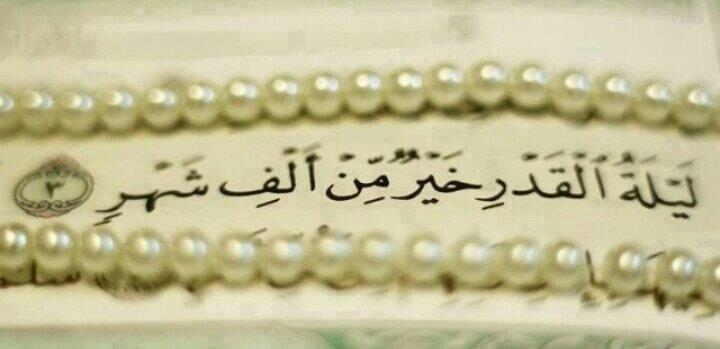
IN Ramadan, there is a frisson of excitement that runs through the Muslim community. There is so much to prepare in this glorious month – menu plans for iftar so that we don’t overeat, Eid clothes and gifts, and of course, preparing ourselves spiritually.
There is also a shiver of nervousness – there is such a hype about Ramadan that it gets one wondering: “What if my Ramadan is not as good as last time?” “What if it’s not as amazing as someone else’s?” And since the most blessed part of it is the last ten nights: “What if I don’t catch Laylatul Qadr?”
Ramadan is not about comparing yourself to other people, and each person’s spiritual journey is different. It’s all about bettering yourself, and getting closer to Allah.
That being said, circumstances differ, so what worked for you last year may not work this year. Always mould your schedule to fit you right now.
Here are a bunch of things I have learnt along the way to help with the last ten nights, so let’s get a head start in preparing ourselves to seek Laylatul Qadr.
1. Plan, plan, plan:
We start Ramadan with fervour, but our eeman and ‘ibadah takes a dip in the middle.
However, we want to finish strong, so even if you are not someone who necessarily follows a plan, having a plan is better than no plan at all! “Failing to plan is planning to fail,” after all!
How are these days going to be different to the rest of the month?
Since the focus is on the nights here, keep your days light and plan your nights. Depending on how the first few days go, tweak your schedule to reflect what you are able to do. Keep it realistic, because there is nothing like having an unachievable target to help you fail!
2. Plan a special deed:
What will you do that’s special to make it better than the rest of the month? How are these days going to be different?
It could be something big or small, something just for you or something for the community. It could be a social act – feeding people, sponsoring an orphan, visiting an old age home or an orphanage, organizing a fundraiser or creating awareness. It could be on all ten days or just one day. It could be something you’ve been thinking about or talking about for some time but never got round to doing it.
It could be for yourself – proper seclusion in i’tikaf, staying away from all social media in the last ten nights, if not the whole ten days AND nights. It could be forgiving someone that has hurt you all that time ago, rekindling ties, and strengthening the family bond.
It should be something you will look back from later on and say ‘Alhamdulillah!’
3. Du’aa is your conversation with Allah:
Prepare YOUR du’aa list. It should be short and concise, and what you ask Allah for daily and sincerely.
Do not copy paste others’ lists, no matter how beautiful they are. Make them a part of your general du’aas, but make sure you have your special list too, where you ask Allah for things that you really really want, sincerely from the bottom of your heart.
Remember the du’aa to be asked in these last ten nights as per the sunnah.

“O Allāh, You are pardoning, and You love to pardon, so pardon me.”
‘Afuw is when you ask Allah not only for His forgiveness, but that He also makes you forget that you have ever done the sin on the Day of Judgment. What a beautiful du’a!
Keep a du’aa journal so that you can tick off du’aas as they get answered – it connects us to Allah and shows us how great His mercy is for us. Also keep in mind how much He gives you without having asked!
Allah is the only One who gets angry if you don’t ask Him, so ask, ask, ask!
4. Prepare for I’tikaf:
If you’re going to be spending it at the masjid, pack the essentials, and pack light. These are meant to be spiritual days, so there is little that you need.
Do NOT pack any electronics, even if you mean to do good with them and listen to lectures or the Qur’an. Our nafs gives in too easily and gets distracted.
The key is to minimize distractions as much as possible, so even downgrade to a basic phone with no social media or data if possible.
I’tikaf is not camping, so pick a spot where you won’t be distracted. Even if you can’t spend the whole night in i’tikaf, give whatever part of it that you can whole-heartedly. Don’t check your phone even if you are tempted to. Make the most of these precious nights, so try to eliminate time wasters.
5. Prepare your family:
Stress the importance of the last ten nights. Prepare them of the slight difference in schedule.
If you are planning on going for i’tikaf, even for part of the night, prepare them that you won’t be available then.
Get the kids excited. Have a special place or tent at home where they can recite the Qur’an or do their adhkar. Maybe do your special project together as a family. Don’t be selfish in these nights. Be charitable.
6. Remember what’s at stake:
“It’s better than a 1000 months” should be our slogan and motivation for the last ten nights.
Keep going with ‘just one more night’, when you feel like giving up.
Take brief naps in the day to help you get through the long summer nights, and vary your acts of worship so that you don’t get bored – and that WILL happen!
Don’t be tempted to check your phone. Recite Qur’an, read the translation, contemplate, do wudhu, revise your hifdh, pray a couple of rak’ahs, ask du’aa, write in your journal.
7. Don’t let your performance up until now affect your last ten nights:
If, for whatever reason, your Ramadan didn’t quite go as planned thus far, don’t let that get you down.
Take the blessing of being able to witness the last part of the month as a fresh start, and push through. Don’t just wait until the 27th night either.
If you haven’t quite felt the “Ramadan mood” yet, don’t wait for it. It’s a catch-22 situation: we wait for the right mood to do good, but forcing ourselves to do more good is what will get us in the mood! It’s like forcing yourself to smile when you’re grumpy will make you feel better..!
Take the action and Allah will open your heart and make you feel closer to Him, bi idhnillah. It’s all about the intention!
8. There are 4 things you can do every night to guarantee a chunk of reward on Laylatul Qadr:
- Recite a portion of the Qur’an
- Keep a lot of dhikr, and ask du’aa
- Pray tahajjud
- Give a portion of sadaqah every night, however much you can afford. Break down a big note into ten equal parts to give each night. That small note will be worth unimaginable amounts in the akhirah!
9. Remember Allah constantly from Maghrib to Fajr:
Remember Allah constantly simply by reciting this du’aa, as reported by Muslim:

Glory is to Allah and praise is to Him, by the multitude of his creation, by His pleasure, by the weight of His Throne, and by the extent of His words.
Multiply that by the reward of Laylatul Qadr and you’ve got a jackpot. “It’s better than a 1000 months” means that any act you do is like doing it every single moment for more than 83 years. Most of us don’t live up to the age of 83, and we definitely don’t spend every single moment of our lives in worship.
This is such an AMAZING opportunity to get what we would never be able to get otherwise.
Time Management In Ramadan
By Salmah Shahnawaz

EVERY year when Ramadan is around the corner, there is a flurry of activity in preparing for it. Whether it’s stocking up on food or spirituality, one of the most daunting feelings is how to make the most of it. How do we make every second count in this amazingly blessed month?
I used to consider the idea of doing more than usual in Ramadan a bit hypocritical – if we don’t make the effort during the rest of the year, how can we take advantage of this month like that? But I have come to the understanding that ideas like that are from Shaytan, and when Allah showers us with such mercy, we make the most of it!
The same way most people go crazy in a sale, buying more simply because of the reduced prices, we should avail the multiplied rewards in this month and try to fit in as much as possible.
Plan Your Basic Goals Now:
Ramadan is meant for more direct worship – fasting, praying, Qur’an, duʽaa, charity, etc. Ideally, these are all goals that we should set – to do more in each of these areas. If there is something specifically that you have been wanting to improve on though, but didn’t quite get around to it during the year, now is your chance – working on your salah, for example, or understanding the Qur’an. Everything’s better with an action plan.
Figure Out Your Schedule:
With Ramadan being in the summer, either you’ll be working as usual, or you’ll be on holiday. Whatever stage of life you’re at, figure out what your schedule is going to look like during that month and work around it. Make sure your goals are SMART (specific, measurable, achievable, realistic, and time-bound).
Don’t try to overburden yourself, leading to a burnout, but be realistic in planning your ‘ibadah.
Personally, I always prefer having more things on my to-do list than less. If you are not going to fall into a panicked state having not met every single one of your items, having more on your list means that if you end up with more time on your hands than you anticipated, you won’t be lost for ideas of how to fill your time.
Plan Your Day the Night Before:
As much planning we do now, only when Ramadan actually starts can we assess our energy levels and the way our days might go. This is my first Ramadan with a husband and in-laws, so I can only guess at this point what it’s going to be like!
Always tweak your schedule to fit your day if needs be, and plan what you’re going to do the next day the night before. There’s nothing like starting your day with a plan already in place!
Have Specific Times Set Aside:
There is nothing like ritual to help keep us in check. Once you have identified your schedule, assign specific times for specific ‘ibadah to ensure that you carry it out. Reciting the Qur’an after fajr, for example, studying it during what would normally be lunchtime, etc. Being specific with your time aids your goal-setting in being measurable and achievable as well, as it makes it easier to set targets to be reached by the end of the month.
Be Strict With Yourself:
In making the most of this blessed month, there will be times when we want to slack, or take more breaks than necessary. Maybe we incorporate mundane activities in our day hence making less time for ‘ibadah. Even though the Shaytan is locked up, our nafs can pull us down when we push ourselves to do more.
This is where early preparation is key (by early, I mean months in advance), but what can you do when you’re in the middle of Ramadan? Be strict with yourself. Keep reminding yourself of how incredibly blessed this month is, how much you can reap in rewards, and how you don’t get this chance at any other time. What if this is your last Ramadan? We don’t want to end it with a load of regret. Keep pushing yourself to do one more act of worship.
Be Flexible Too:
There will be days when life intervenes and your day is thrown off its usual course. Don’t panic: remember to be flexible with yourself if you absolutely have to, but flexibility does not mean giving up on your goals.
In trying to get as much done as possible, try halving your must-dos instead of scrapping it completely. Recite half the number of pages of Qur’an you were supposed to, or study half the amount you set for yourself, or pray less rakʽahs of nafl than you meant to – depending on what part of the day your schedule got taken over.
Make the Most of Waiting Time:
There will still be time in the day that we spend waiting: whether it’s in traffic, on the road, or while attending to our kids. These mundane moments can turn into a jackpot for you by keeping your tongue moist with the remembrance of Allah.
Be it dhikr, revising Qur’an that you’ve memorised, or even pondering about our Rabb, connect to Allah in the smallest ways.
Alternatively, make sure that your intention at that moment – no matter what you’re doing – is to earn the Pleasure of Allah. This makes acts like going to work in order to support one’s family, or spending time with one’s children – all acts that take up a chunk of one’s day – worship too.
Don’t Skimp on Your Night Sleep:
With the nights being extremely short in some countries this summer, some might think it would be easier to stay awake till suhoor, but our bodies need the night sleep to function properly, even if it’s just for a couple of hours. Take scheduled naps in the day too to energize yourself and keep going. Drink plenty of water from iftar to suhoor so that you can stay hydrated during the day.
Whether you’re a mother, student, worker, or a new Muslim, don’t let this month daunt you, stress you out, or leave you in regret.
Planning is key, so start now, and make duʽaa for barakah in your time, as well as the strength to keep going – physically and spiritually. It is the hallmark of a believer that he leaves Ramadan wishing he had done more, because no amount of ‘ibadah is enough, but the least we can do is our best.
No Ramadan Diet Plan Is The Best Plan!
By Fareeha Jay
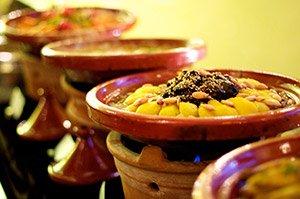
RAMADAN is a plan by Allah for us to cleanse our body and soul. Despite that, everyday different people ask me to provide them with a Ramadan Diet Plan.
If we follow the teachings of Islam correctly, we don’t need any diet plan whatsoever. Chapter 20, verse 81 of the Qur’an states:
“Eat of the good and wholesome things that We have provided for your sustenance but indulge in no excess therein.” [Qur’an 20:81]
And that is why there is no diet plan. Eat good and wholesome foods in moderation; that’s the key.
Nevertheless, I would like to give a few pointers, which surely many of you already know, just as a reminder.
We should aim to keep food intake in Ramadan simple, and not very different from our normal day to day diet. This means eating in small portions but to include all major food groups, like fruit and vegetables, breads, cereals and potatoes, meat, lentils and pulses, dairy foods and healthy fats.
Fasting hours across the world can vary and can be anywhere between 11-22 hours.
Therefore, we need to focus on foods which can help us feel fuller for longer and give us energy. The key to feel full and energetic is to include more fibre at suhoor (pre-dawn meal) and Iftar (fast-breaking meal). The slow release of fibre in our body, keeps us full and energetic.
We can increase fibre by opting for brown bread, whole grain flour, whole grain cereal, potatoes with skin, brown rice, and brown pasta. Focusing more on fruit and vegetables and trying to have them with their skins can optimise fibre intake.
We can try to avoid or limit fast burning foods in the form of sugar and white flour/white bread/white rice.
To avoid indigestion in Ramadan, aim to limit fatty foods, such as pakoras, samosas, bhajias, chips, cakes, biscuits chocolates and sweets. Don’t stop having them, rather think of ways to prepare them in a healthier way by using less oil and baking, steaming and grilling food rather than frying it. Also, if you regulate your portion size, include fibre in your diet which will aid in avoiding indigestion.
Drink plenty of fluids to prevent dehydration. We always focus on water intake which becomes quite difficult to consume in such a short period of time. Along with water we can have stews and soups, or fluid rich fruit and vegetables to increase water intake.
Reduce salt intake as much as possible, as high intake may make you feel thirsty. Consciously make an effort of putting half the amount of salt than you usually do. Tea and coffee can stimulate water loss, therefore try to limit the amounts or go for decaffeinated versions.
We all know that we should be limiting the amount of sugar in our diet, because sugars are empty calories and will only contribute to weight gain. If you really feel like having something sweet, try to make healthier choices.
If you feel the urge to have cake, rather than having a chocolate cake go for a plain one. If you want to have a biscuit, instead of having a custard cream biscuit go for a plain one. Try going for milk-based sweet dishes such as kheer or vermicelli.
If you feel you really must have that chocolate cake, or that gulab jamun, go for it but just think of the portion size.
This Ramadan think less about feasting and more about nourishing your body, after all it is the month to cleanse our body and soul.
For a nutritionally complete diet in Ramadan we must aim to include all major food groups in the correct portion.
Guidelines to Help You Plan Your Ramadan Meals Accordingly
Suhoor:
Choose one from each row.
- 2 slices of brown bread OR wholemeal chapati/roti (40-80 g) OR Bowl of cereal
- 2 Kebab OR 2 Chicken Pieces OR 2 eggs OR 5 tablespoons lentil and pulses (can have 2 from this row)
- Glass of milk OR 5 tablespoon yogurt OR matchbox-size cheese
- Fruit palm-size OR vegetables of your choice
Iftar:
Ideally break your fast with a glass of milk with dates. After Maghrib prayer focus on the remaining food groups.
Choose one from each row.
- Wholemeal Roti/ Chapati (40-80 g), Rice (80-160gm), Pasta (80-160g), Potatoes (2 -4 egg sized)
- Chicken/lamb/beef/ fish palm size (60-90 g), 5 tablespoon lentils and pulses OR 2 eggs (can have 2 from this row)
- Half a plate of vegetables can be cooked, raw, boiled or steamed.
- Milk (200ml) Yogurt (125ml), Cheese (matchbox size)
If the above is not enough, you can add fruit.
Fareeha Jay is a Registered Dietitian with a degree in dietetics from Plymouth University, UK. She works for Sentinel Health & Wellbeing (NHS) as a Diabetes Educator. Her passion is to bring awareness about balanced diet, healthy eating and quality living.
Diabetes And Ramadan: Guidelines For Fasting
By Fareeha Jay

Fasting in Ramadan means to attain taqwa, and it is prescribed by Allah for His believers.
Chapter 2, Verse 83 of the Qur’an states: “O you who have believed, decreed upon you is fasting as it was decreed upon those before you that may become righteous.”
Fasting with diabetes can be challenging but Muslims all over the world fast with this condition. It’s a personal decision but advice needs to be taken from doctors/health care professionals.
If you are taking insulin 2 or more times a day, have poor control, or are suffering from liver or kidney problems, in such cases it is advisable not to fast. Even if you are at a moderate or low risk and are planning to fast, it is vital to discuss your situation with doctors before fasting as your medication may need to be changed.
Chapter 2, Verse 184 of the Quran states: “(Fasting for) a limited number of days. So, whoever among you is ill or on a journey (during them) then an equal number of days (are to be made up). And upon those who are able (to fast, but with hardship) a ransom (as substitute) of feeding a poor person (each day). And whoever volunteers excess it is better for him. But to fast is best for you, if you only knew.”
If you are fasting with diabetes
Extreme care needs to be taken with regards to your diet at suhoor and iftar. Otherwise, it may put you at risk of low blood sugar (hypoglycemia), high blood sugar (hyperglycemia) and dehydration. Hence, extreme care needs to be taken in your diet at suhoor and iftar.
It has been observed that people with Diabetes tend to avoid starchy carbohydrates at suhoor, which may put them at risk of low blood sugar. To avoid low sugar levels, starchy carbohydrates, need to be included both at suhoor and iftar. Along with these, fruits and lots of vegetables also have to be included, to increase fibre intake. Fibre will be slow released in the body throughout the day, hence preventing low sugar levels. Including healthy fats could also be beneficial, as fats help slow down digestion.
To avoid low sugar levels
Include:
- Wholemeal roti/chapati, wholemeal bread, brown rice OR basmati rice, potatoes with skin, whole meal cereal.
- Fruit and Vegetables.
- Healthy Fats such as olive oil /spread, nuts, seeds, avocado, olives.
In many instances, after iftar people with diabetes may suffer from high sugar levels. Even when they avoid sugary drinks and foods, they still get high sugar readings. In this situation, it is vital to know what other foods could cause the sugar levels to rise.
People with diabetes must understand that all starchy carbohydrates, fruit and dairy will affect their sugar levels and if consumed in large amounts, despite not having sugary drinks and food, they can get a spike in their sugar levels.
To avoid high sugar levels
Have NO MORE than:
- 40-80 gm chapati, OR 1-2 slices of bread OR 2-4 small potatoes, OR 30 -60 g of cereal at one time
- 200 ml milk, matchbox-size cheese, 125 ml yogurt at one time
- 80 g of fruit at one time
- Avoid high sugar foods and drinks
Hydration is extremely important for people with diabetes. They are at higher risk as compared to others. The kidney gets rid of excess blood sugar through urination causing greater water loss, therefore care needs to be taken.
To avoid dehydration
- Try to have as much water as possible at suhoor and after iftar.
- Try to limit intake of tea and coffee as it stimulates water loss.
- Try to avoid having sweet and salty drinks like lassi, juices, fizzy drinks etc.
- Increase fruit and vegetables intake as because of high water content they can also give hydration.
If you have diabetes, your situation can become stressful during Ramadan. Look after your health and look after your body. Don’t put yourself in a situation which may cause future health problems for you. Have a happy and a healthy Ramadan.
The Amazing Way Fasting Reduces Evil In Us
By Zara Andleeb

ONE of the best and heartwarming scenes of Ramadan is that of a fasting person, who previously couldn’t get rid of music, movies and other unlawful acts, is now able to live without all of that peacefully.
It’s astounding to see a fasting person, who usually never enters the masjid, except on a Friday or Eid, praying five times a day in Ramadan. Not only that, he may even stand in Qiyam at night.
Have you ever wondered why that happens? Allah’s blessing of Ramadan and the presence of eeman are certainly factors. However, what may be contributing is fasting itself!
Ibn Taymiyyah very brilliantly explains why this happens:
“Fasting humiliates and weakens the Shaytaan; it weakens the effects of his whispers (waswaas) on a person and reduces his sins. That is because the Shaytaan ‘flows through the son of Adam like blood’ as the Prophet ﷺ said, but fasting narrows the passages through which the Shaytaan flows, so his influence grows less.” [Majmoo’ al-Fatawa, 25/246, Islamqa.com]
Fasting vanquishes evil desires evoked by shaytaan because it narrows the bloodstream and Shaytaan flows in the son of Adam like blood, so fasting extinguishes his whispers and defeats evils like lust, anger and other sins. This is a reason is why the Prophet ﷺ made fasting, a shield for a man who in desire can’t afford marriage.
Allah’s creation is vast and innumerable. But man is the most amazing creation of all.
“And We have certainly honored the children of Adam and carried them on the land and sea and provided for them of the good things and preferred them over much of what We have created, with [definite] preference.” [Surah Al-Israa’, 17:70]
The Wonders Of Having Soup For Iftar
By Caashifa Adams

DURING Ramadan, most homes serve some kind of soup at iftaar. The health benefits of soup are numerous and well documented. One can also find many a mention in the hadith. It is one of those dishes that truly nourishes the body and comforts the soul. It is narrated that the Prophet Mohammed ﷺ enjoyed soup with meat, pumpkin and gourds especially [Sahih Muslim].
Here are a few recommendations to increase the nutritious value of your soup.
✔ Use an array of fresh vegetables. This gives the soup a good combination of vitamins and minerals.
✔ Herbs and spices not only carry flavor, they also give amazing health benefits. This includes garlic, ginger, turmeric (root if possible), bay leaves, cloves, peppercorns, stick cinnamon, cumin, coriander, chillies and some sea salt.
✔ When using beans, grains or legumes soak for 1-2 days. These foods contain phytochemicals (anti-nutrients) that can cause bloating and flatulence. Once soaked, the water will become cloudy. The longer it is soaked the clearer the water becomes. Soaking them and changing the water a few times is more beneficial to you since the phytochemicals are greatly reduced.
✔ Try to avoid using wheat flour or corn flour as a thickener. Allow the soup to reduce naturally or blitz till smooth and thickened instead. The flour adds unnecessary calories which also are of no nutritious benefit.
✔ When using meat or chicken, add the bones. The bones carry many nutrients in the marrow and cooked over time, these nutrients leach into the soup making it an even more wondrous dish.
So prepare a wonderful hearty healthy nutritious soup as an iftaar starter and know that you are fuelling your body in the best possible way.
Below, I share one of my hearty soup recipes with you.
Caashifa’s Lamb and Vegetable Soup
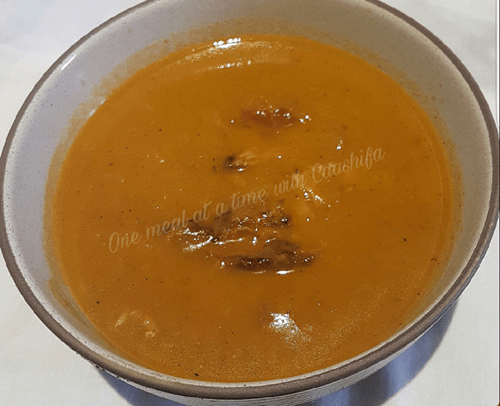
Ingredients
- 2-3 tbsps. coconut oil
- 1 small onion, diced
- 2 cloves garlic, minced
- 1 carrot, sliced
- 1 daikon radish, sliced
- 1 turnip, chopped
- 1 whole bell pepper, chopped
- 1 tomato, diced
- 1 bunch celery (stalks + leaves)
- 1 cup parsley chopped (stalks + leaves)
- 2 tsps. tomato paste
- 2 bay leaves
- Crack of sea salt
- Crack of black pepper
- 1 MSG-free stock cube (optional)
- 1 tbsp. garlic powder
- 1 tbsp. onion powder
- 1 tbsp. paprika
- 1/2 tbsp. fine cumin
Instructions
Season the lamb with salt and pepper and half of the spices. In a large pot heat the coconut oil and brown the lamb. When the meat is browned, add the onion with tomato paste. Sauté for 5 minutes (this removes the acidic taste of the tomato paste).
Add the celery stalks, carrots with the bay leaves, garlic and the stock cube. Add 1 cup water. If you are using broth or liquid stock then omit the stock cube. Cook for 10 minutes then add the rest of the vegetables and the remaining spices. Top up the pot with a kettle of boiling water.
Adjust the seasoning. Cook until the lamb is soft and falling off the bone. Add water throughout the cooking time if necessary. Remove the meat and bay leaves then use a stick blender to make the soup smooth. Add the meat back and simmer for 5 minutes before serving.
Ramadan Rules For Marriage And Intimacy

MANY Muslims are unaware of what rules and regulations surround marriage and intimacy during Ramadan. This compilation deals with the most common issues surrounding marriage and intimacy in the month of fasting.
Is Marriage In Ramadan Permissible or Impermissible?
Marriage can be contracted during the month of Ramadan, unlike during Hajj. However, the person who is fasting in Ramadan must refrain from eating, drinking and intercourse from dawn until sunset. If someone can exercise self control during the fast, and there is no fear of doing something that will break the fast, there is nothing wrong with getting married in Ramadan.
It is seen that usually newlyweds cannot be patient and there is the fear that they may do something forbidden (intercourse while fasting) and they may fall into grave sin.
Expiation For Intercourse While Fasting In Ramadan
It is obligatory to make up that day’s fast and offer the legislated expiation, which is freeing a slave; if that is not possible then the couple must fast for two consecutive months; if that is not possible then they must feed sixty poor persons. If intercourse happens repeatedly on a number of days, then this expiation must also be repeated for the same number.
The number of expiations corresponds to the number of days, not to the number of times the act was repeated on one day before the payment of any expiation. This is by consensus of the scholars. (Ref: Kifaayat at-Taalib)
Expiation is counted by the number of misdeeds (i.e. whoever had intercourse on two different days must pay expiation twice) because each day is a separate, independent act of worship, so the expiation for both cannot be combined. If the act of intercourse happened several times in one day, the separate acts are not counted [i.e. one expiation is sufficient]. (Ref: Mughni al-Muhtaaj)
Abu Hurayrah (may Allah be pleased with him) said: “Whilst we were sitting with the Prophet ﷺ, a man came to him and said: ‘O Messenger of Allah, I am doomed!’ He ﷺ said, ‘What happened to you?’ The man said: ‘I had intercourse with my wife whilst I was fasting.’ The Messenger of Allah ﷺ asked: ‘Could you find a slave you could set free?’ He said, ‘No.’ He ﷺ asked, ‘Are you able to fast for two consecutive months?’ He said, ‘No.’ He ﷺ asked, ‘Can you feed sixty poor persons?’ The man said, ‘No.’ The Prophet ﷺ fell silent. Whilst we were (sitting) like that, the Prophet ﷺ was brought a container of dates. He ﷺ said, ‘Where is the one who was asking?’ The man said, ‘I (am here).’ He ﷺ said, ‘Take these and give them in charity.’ The man said, ‘Who is poorer than I, O Messenger of Allah? There is no household between the two lava fields (i.e., in Madeenah) that is poorer than my household.’ The Prophet ﷺ smiled until his back teeth could be seen, then he said: ‘Feed it to your family.’” (al-Bukhaari, Fath, 1936).
According to a report narrated by Ahmad from ‘Aa’ishah (may Allah be pleased with her), whilst the Prophet ﷺ was sitting in the shade of the fortress of Hassaan, a man came to him and said, “I have been burnt, O Messenger of Allah!” He ﷺ asked, “What is wrong with you?” He said, “I had intercourse with my wife whilst I was fasting.” She [‘Aa’ishah] said: that was in Ramadan . The Messenger of Allah ﷺ said to him, “Sit down,” so he sat down at the back of the gathering. Then a man came with a donkey on whose back was a basket of dates, and said: “This is my sadaqah (charity) O Messenger of Allah.” The Messenger of Allah ﷺ said, “Where is the burnt one who just came?” He said: “Here I am, O Messenger of Allah.” He ﷺ said: “Take this and give it in charity.” He said, “Where should it go except to me and my family, O Messenger of Allah? By Him Who sent you with the truth, I cannot find anything for me and my family.” He ﷺ said: “Take it.” So he took it. (al-Musnad 6/276).
Intercourse During the Day in Ramadan Out of Ignorance
Allah has forbidden His slaves to eat, drink or have intercourse during the day in Ramadan, or to do anything that might break the fast. If someone has intercourse during the day in Ramadan, and such a person is accountable, of good health and settled, not sick or traveling, they have to offer expiation (kafaarah).
The legislated expiation is freeing a slave; if he cannot afford that, then he must fast two consecutive months. If he is unable to do that then he must feed sixty poor persons, giving each one half a saa’ (measure of weight) of the staple food of the country.
If someone has intercourse during the day in Ramadan, while being obliged to fast because he is an adult, in good health and settled (not traveling), but he was ignorant of the ruling – there is a difference of opinion among the scholars in this case.
Some said that he has to offer the expiation because he was negligent and did not bother to ask and find out about the religion. Other scholars said that he does not have to offer expiation because of ignorance. In order to be on the safe side, the person should offer the expiation, because of negligence and not asking about what is forbidden.
If this person cannot free a slave or fast, it is sufficient for them to feed sixty poor persons for each day that they had intercourse.
If a person had intercourse several times on one day, one expiation is enough for that. This is to be free of blame, avoid an area concerning which there is scholarly dispute, and to make up for missed fasts. If a person does not remember the number of days on which they had intercourse, then offer expiation for the higher number in case of doubt.
Intercourse in the Night During Ramadan
Intercourse during the day in Ramadan is haraam (impermissible) for men and women alike, who are obliged to fast during the day. Doing that is a sin for which expiation (kafaarah) must be offered.
Intercourse during the night in Ramadan is permitted and not forbidden, and the time when it is permitted lasts until the onset of dawn. When dawn comes, intercourse becomes forbidden.
Allah says (interpretation of the meaning):
“It is made lawful for you to have sexual relations with your wives on the night of As-Sawm (the fasts). They are Libaas [i.e. body-cover, or screen, or Sakan (i.e. you enjoy the pleasure of living with them] for you and you are the same for them. Allah knows that you used to deceive yourselves, so He turned to you (accepted your repentance) and forgave you. So now have sexual relations with them and seek that which Allah has ordained for you (offspring), and eat and drink until the white thread (light) of dawn appears to you distinct from the black thread (darkness of night), then complete your Sawm (fast) till the nightfall” [al-Baqarah 2:187]
This verse clearly states that it is permissible to eat, drink and have intercourse during the nights of Ramadan until dawn.
After having intercourse it is obligatory to do ghusl (ritual bath) then pray Fajr.
Kissing, Hugging and Foreplay During the Day in Ramadan
Any action that results in discharge of semen violates the fast, even if it is not intercourse. Violating the sanctity of this great month and invalidating fasting are serious violations. A compensatory fast is due for the day on which a person discharged semen without penetration, because fasting was invalidated by the intentional discharge of semen. However, according to the majority of the scholars, no expiation is due on such a person because of the discharge of semen only as long as it was not caused by sexual intercourse.
Maliki scholars are of the opinion that major expiation (of fasting two months consecutively) is due for the intentional discharge of semen by kissing or physical contact or foreplay, even if one usually does not discharge semen whenever he does any of such things nor persists in doing any of those till he emits semen.
Having An Involuntary Wet Dream During The Daytime In Ramadan
This does not affect the validity of fasting because the pen of recording deeds is lifted from the sleeping person; i.e. he is not held accountable for his deeds because he has no way to avert what he encounters during his sleep.
However, he should make ghusl once the time of the prayer comes, based on the words of Allah, the Almighty, (what means):
Do not approach prayer while you are in a state of janabah [state of major ritual impurity] until you have washed [your whole body]. [Qur’an 4:43]
If semen comes out intentionally through masturbation, kissing, or lustful contact (with the wife), fasting is invalidated and one must make up for that day.
Ibn Qudaamah, may Allah have mercy upon him, said about the one who kissed and discharged semen while he was fasting:
“His fast is broken, a fact over which there is no difference of opinion, to the best of our knowledge. Discharge of semen through physical contact is similar to ejaculation through sexual intercourse but without penetration.”
If someone masturbates with his hand, he has committed a prohibited act, yet his fast is not invalidated by it unless he discharges semen. If he discharges semen his fast is invalidated.
Similarly, if the discharge of semen results from looking repeatedly (at something that arouses the desire), it invalidates fasting according to the predominant opinion in the sight of some scholars.
If the discharge of semen results from having arousing thoughts only, it does not invalidate fasting. The evidence is the statement of the Messenger of Allah , who said, “Verily, Allah has forgiven the people of my Ummah (community) the evil thoughts which occur to their minds as long as they do not execute them or speak of them.” [Al-Bukhari and Muslim]
Those are the states of the discharge of semen and their effect on the fast of the one who is competent for religious assignment. It is due on the one who discharges semen in any of those cases to make ghusl when the time of prayer comes, and offer prayers.
The Prophet ﷺ And His Wives In Ramadan
‘Aa’ishah, may Allah be pleased with her, reported, “When the last ten days of Ramadan came, the Prophet ﷺ would stay up all night, wake his family and gird his loins.”
He ﷺ also ordered seeking Laylat-ul-Qadr (the Night of Decree). In a Hadeeth, he said: “Seek Laylat-ul-Qadr in the last ten days of Ramadan.”
‘Aa’ishah, may Allah be pleased with her, said, “I said, ‘O Messenger of Allah, if I know which night is Laylat-ul-Qadr, what should I say on that night?’“He said: “Say: Allahumma innaka ‘afuwwun tuhibbul-‘afwa fa‘fu ‘anni (O Allah, You are Ever Pardoning and You love pardoning, so pardon me).” [At-Tirmithi]
Ref: IslamQA.com
When You Can’t Fast: Women In Ramadan
By Zara Andleeb
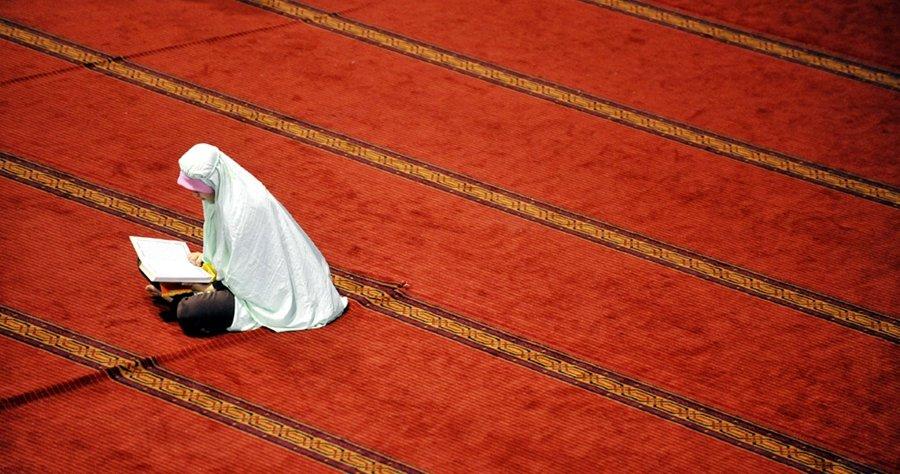
“We set out with the sole intention of performing Hajj and when we reached Sarif, my menses began. The Messenger of Allah ﷺ came to me while I was crying and asked, ‘What is the matter with you? Has your menses started?‘ I replied, ‘Yes.’ He said, ‘This is something which Allah has destined for the daughter of Adam” (Narrated by Aisha, may Allah be pleased with her)
Little did she know when she was sobbing and perhaps assuming that it was not good for her that the result of her incident would serve as guidance for many, many daughters of Adam to come. What the Prophet ﷺ replied is enough for us to know that menses is neither a fault, nor is it worth any anguish.
This is how Allah fashioned women and His supreme wisdom cannot be questioned. Shaikh-ul-Islam Ibn Taimiyyah said:
“When a woman menstruates, her discharge has actual blood in it. Women are able to fast in times other than menstruation because discharges in other situations do not have blood. So her fasting is moderate and balanced as no blood keeps the body strong.
“But menstruating necessitates that blood comes out, and blood is the main component of her body. Fasting in this time will lead to a weakness and deficiency in her body. And her fast will not be moderate and balanced in nature. So that is why she is commanded to fast only in times when she is not menstruating.”
– Majmoo’-ul-Fataawaa” (15/251)
You are in a state of worship when you are not fasting or praying
Yes, you are.
Fasting in Ramadan and praying Salah is fardh (obligatory) and so is not fasting in Ramadan and not making Salah for a woman who is menstruating. Both are commands and therefore worship. Rejoice!
Not only this, if you sincerely had the intention to pray and fast and there was nothing hindering between you and performing them but menses, In Sha Allah you will get the full reward. (Gems of Ramadhan #5 by Ahmad Musa Jibril)
Shaikh Ibn al-Uthaymeen said:
“The one who (always) desires to do good and is keen about it; if it is from his habit that he used to act upon it but was detained from doing it due to a reason, the reward for the complete deed is (still) written for him.
For example: If the person was in the habit of praying with the congregation in the Masjid, but he was detained from it due to a reason like sleep or sickness or something similar, the complete reward of praying in the congregation will be recorded for him without any deductions (in the reward).”
– Based on the hadith, “When a slave falls ill or travels, then he will get reward similar to that he gets for good deeds practiced at home when in good health.”
[Al-Bukhari, no. 2996, Commentary on Riyad as-Saliheen by Ibn Uthaymeen]
But Ramadan is not on a pause!
You can’t fast, pray or perform tawaaf (if you’re on Umrah) but it is still Ramadan and you can do everything else.
Not denying that it does feel a bit left-out, but who wants to lose out on the rewards? Every second of Ramadan is precious and we all want to make the most out of it.
Things you can do, in sha Allah:
Recite loads and loads of Quran:
There is a difference of opinion among the scholars whether or not a woman who is on menses can recite the Quran or touch the mushaf. However, the overwhelming majority of the scholars are of the opinion that a woman can recite the Quran from her memory.
About touching the mushaf, it is recommended that she places a barrier and then touches, like wearing gloves, etc. The easiest option and a blessing for the women of today are the gadgets! You can read Quran on your gadget and there is nothing wrong with that.
Host an Iftar:
The Prophet ﷺ said: “He who provides a fasting person something with which to break his fast, will earn the same reward as the one who was observing the fast, without diminishing in any way the reward of the latter.” [At-Tirmidhi]
So you can arrange an iftar with the intention of seeking this reward and the Most Merciful promises a reward equal to that of a fasting person.
Seek Knowledge:
One of the noble acts of worship is seeking knowledge. Seeking knowledge polishes your worship, increases your Emaan and makes beautiful your character. The Prophet of Allah ﷺ said: “Whoever travels a path in search of knowledge, Allah makes easy for him a path to Paradise.” [Sahih Muslim, 2699]
We live in a time when technology has simplified things for us. All we need is the urge to seek the good in it. Look for authentic websites, video lessons or books; read the ahadith with their commentary or learn Seerah and Tafseer.
One important note: You might get distracted or lost while choosing what to do. Plan ahead so you don’t waste time choosing.
Dhikr of Allah:
Don’t ever miss out on the daily adhkaar; especially the morning and evening ones. Take some time out and memorize some adhkaar from the ‘Fortress of the Muslim’ and hold on to them forever, in sha Allah.
Istighfaar (seeking forgiveness) is a much recommended dhikr; make it fluent on the tongue even when you are busy with chores.
Study circles:
The Prophet of Allah ﷺ said: “No people gather together in one of the Houses of Allah, reciting the Book of Allah and studying it among themselves, except that sakeenah (tranquility) descends upon them, and mercy envelops them, and the angels surround them, and Allah mentions them amongst those who are with Him”. [Muslim]
Study circles can be conducted by sisters involving family, children, neighbors, friends, etc.
Note: keep seeking refuge from backbiting, gossip and tales bearing as these evils are very attractive in women’s circles.
Sadaqah (Charity):
The Prophet ﷺ said: “O womenfolk! You should give charity and be diligent in seeking Allah’s forgiveness because I have seen (i.e., on the Night of the Ascension to the highest heavens) that the majority of the dwellers of the Hell are women” [Muslim]
One of the things that excite women in Ramadan is shopping, not necessarily extravagant. You can’t deny it puts a smile on the face. But this is Ramadan folks! Let’s open our hearts, yearn for the reward and give lots in charity, In sha Allah.
Lastly, do not forget to revive the intention, the life of every deed.
Creative Ways To Instil The Value Of Ramadan In Kids
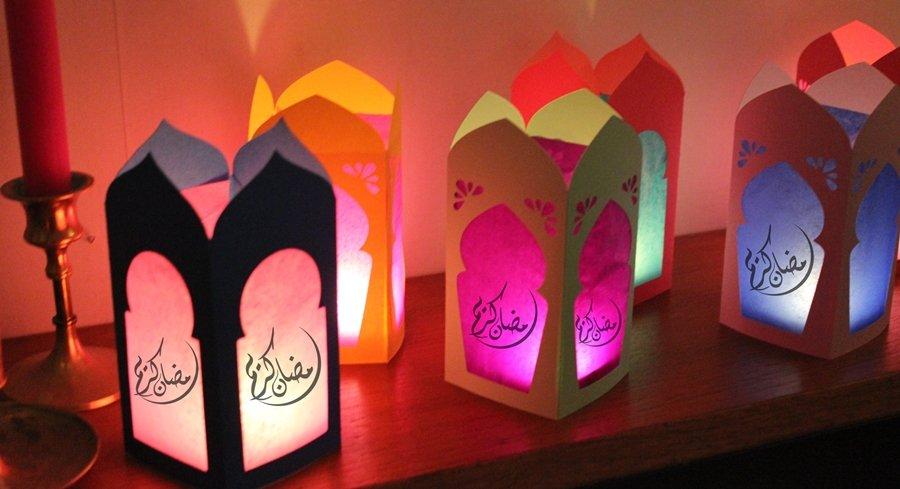
We are what we do repeatedly.’
ANY habit that becomes an inseparable token of our lives is never the result of a day’s work. Instead it is a consequence of endless time and targeted energy. An addictive pattern that we are currently adhering to, can be easily traced back to our toddler days or definitely to a long period of time in our past.
The practice could be as simple as hugging a comfy pillow while sleeping or drinking a sip of water after every bite or starting the day with the Quran. The list of habits may seem trivial and endless but surprisingly they become an intimate part of our survival. They are stored in our subconscious and often function involuntarily without much struggle, because they were instilled into us from a very early age.
A fruitful habit is the result of dedicatedly sowing values and concepts along with constant motivation and evaluation – very similar to a fruitful lush green tree. A tree with its deep roots, high, green shoots, strong trunk, firm fibres and shade that cools and relaxes a bystander and dense vegetation is definitely the outcome of a gardener sowing precise seeds, constant watering, weeding, fertilising and all that is necessary for cultivation.
The same concept is applied to nurturing children. History proves that most prophets were the product of the training and education brought by the Prophets before them, i.e. the prevailing divine and spiritual training provided by the past Prophets was quite influential for those coming after them.
The true spirit of Islam that we find in the Companions of Prophet Muhammad ﷺ and their children is the fruit of the upbringing that they received at the hands of their parents. The great scholars of Islamic history too were nurtured from a very young age by their parents. The Prophet Muhammad ﷺ said, “No father has given a greater gift to his children than good moral training.” [Tirmidhi]
Get an early start
If a parent truly wishes to see their child as a good practicing Muslim, the seeds of Eeman and Islam need to be sown into the heart right from childhood — it’s not a spontaneous or easy process.
It is illogical for a parent to expect their child to magically transform into a practicing Muslim during their adult-life when no efforts were taken at an early stage and later grieve and moan when the bubble of their fantasy bursts.
To reach the destination the journey must begin now. And with Ramadan just beginning, this could be a great opportunity for parents to commence their journey or another chance for parents who have already begun the process of instilling Islamic virtues in their children’s lives.
A strict regime, monotony, lectures and theory will fail to create a lasting impact and may lead the child to temporarily perform certain rituals without their heart and soul into it. Parents of this era must utilize creative ways to instil the value of Ramadan.
Here are some of them:
1. Get excited
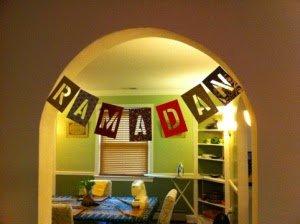
Create an atmosphere of bliss and happiness at home. Kids catch on to their parents’ enthusiasm. Parents must express the excitement and passion within them, that they ‘can’t wait’ for Ramadan to begin. Children should feel the essence of Ramadan even before it has arrived and must eagerly wait to welcome the blessed month.
Decorate homes with banners, balloons, posters and lights. Involve them in the decoration and educate them as they get their hands dirty. Distribute cards wishing everyone, tell them the great value of this blessed month and engage them in Ramadan nasheeds and duas.
2. Read about Ramadan together
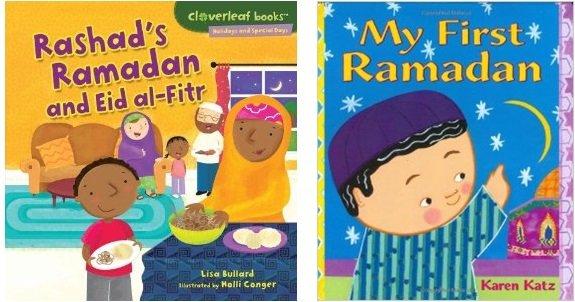
Narrate stories of how the Companions of the Prophet ﷺ spent their Ramadan, the virtues of this great month and how every act gets multiplied manifold and that their bitterest enemy — Shaytan — is chained.
With a little research over the net and a quick run to a library or bookstore, you can get innumerable resources and ideas to get the ball rolling.
3. Start a Ramadan calendar
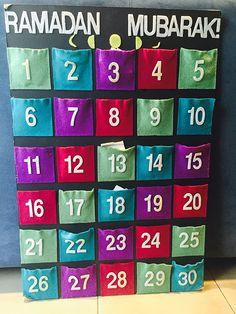
A little creativeness can go a long way and one could either buy or make a similar calendar at home with imaginative ideas. Based on the children’s level of capability parents can fill the pockets with tasks to be done on a specified day like reciting the Quran, fasting, attending taraweeh, an act of Sunnah, something for the community.
Each completed task is rewarded with a little gift kept in the pocket.
4. Plan Ramadan goals as a family

Ramadan passes by in the blink of an eye, so it is important to plan ahead to utilize this month to the fullest. Sitting together and planning as a family involves the little children. Family members must motivate and remind one another of their goals as the month progresses.
The youngest members of the family can have a few targets to complete, such as memorizing three new Surahs, learning duas with meaning or praying all the five obligatory prayers on time and so on. The entire family can collectively agree on one bad habit to quit during Ramadan or could decide to follow a Sunnah.
All this can be sketched out on a chart and posted at a prominent spot in the house. Special prizes can be announced or kept as a surprise for the ones who accomplish their goals.
5. Encourage various acts of Sadaqah

This could be great opportunity to teach children the importance of charity and the satisfaction one attains by sharing with those who have less than they do.
This act is not linked with monetary help alone but can be as simple and sincere as sharing iftaar food. Let children get involved with cooking and chores to accomplish this task. They can perform simple tasks and distribute the prepared food by themselves.
6. Set a Ramadan time-table
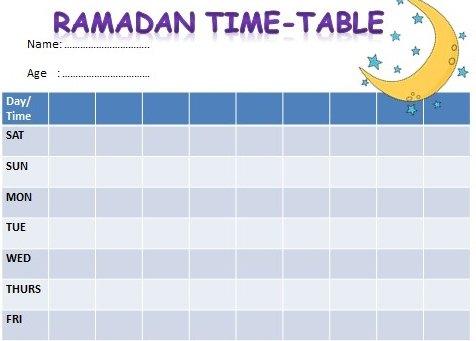
A practical time-table for the day will assist children to a great extent. The schedule must include slots like suhoor, nap, school, recitation, memorizing, play time etc.
In the end, children love to follow anything new and innovative.
7. Pray as a family
Allocate at least one or two acts of worship where the entire family participates like the Tahajjud prayer in congregation, understanding the meaning of the Quran, reading a hadith in detail and so on. Children can maintain a journal on what they learnt everyday and be creative.
8. Creative Eid preparations
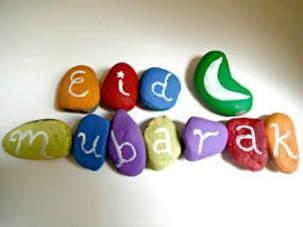
Get the children to prepare Eid cards for their close family and friends. They can assist in preparing some dish to be distributed to the needy around the house or help in decorating the home.
Children must enjoy the blessings of the festival granted by Allah to us – take them out for prayer, dress them their best, give them gifts, party with them…let them feel the joy of ‘Eid.
9. Remind them of the purpose
If children don’t see the reason behind the tasks they are doing, they won’t have the motivation to complete them. To avoid forcing the children to pray, fast and do other good deeds, make sure they understand the real purpose behind it.
Before starting any activity, whether it is story time or making charts, explain exactly why they are doing this activity. Remind them that they are doing acts of worship to please Allah and not for anything else.
Clarify to them when gifts from parents could make them this happy, then the rewards they will receive from Allah will take their happiness to greater heights.
Their aim must be to receive the better and bigger rewards of the Hereafter.
10. Seek help from Allah
A person asked the Prophet ﷺ : “Should I tie my camel and have Tawakkul (trust in Allah for her protection) or should I leave her untied and have Tawakkul?” The Prophet ﷺ replied: “Tie her and have Tawakkul.” [Tirmidhi]
With this thought, every parent must try their best to nurture their children but at the same time seek the help of Allah. Efforts should be undertaken but the outcome of the efforts lies solely in the hands of Allah.
May Allah make our children the coolness of our eyes and a great blessing in this world and the Hereafter. Ameen!
Muslim Battles During Ramadan
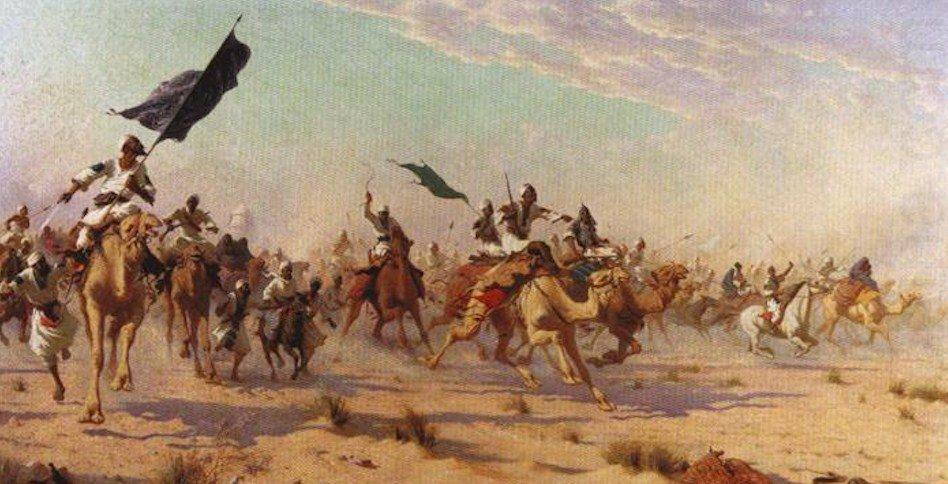
1. Battle Of Badr – 2H
On the 17th of Ramadan two years after Hijrah, Allah established the truth of Islam through the epic battle between the polytheists of Quraish and the Muslims.
Three hundred odd Muslims, through the strength of faith and help from heaven, defeated a well-equipped army of Makkah that was three times their size. Many chiefs of the Quraish were slain and the battle proved a decisive victory in the favor of Muslims. It also sent a strong indication about on whose side Allah was.
Abu Jahl, perhaps the staunchest enemy of Islam among the Makkan chiefs, had called upon Allah to make a differentiation between the truth and falsehood when he marched to Badr. He described the Prophet ﷺ as one who had created trouble and caused disunity in Makkah.
When other tribes offered military support to the Quraish before the battle, Abu Jahl said in reply that if they were in reality fighting Allah and His Messenger, as Muhammad ﷺ claimed, then no force or support will be helpful. If not, they were strong enough for the battle. Abu Jahl got his answer.
Let there be no doubt that Abu Jahl knew of the truthfulness of the Prophet ﷺ. However, he chose to be a stubborn disbeliever and coerced others, through various propaganda, to reject Islam and stay opposed. The evil that the Quraish had lowered themselves to in their opposition of Islam had crossed all bounds and standards of their own construct.
The Muslims who had to escape for their lives to Madinah had no intention to engage in a war. They merely wanted to surround Abu Sufyaan’s caravan and recover some of their lost wealth in Makkah. However, Allah willed otherwise and gave them a victory greater than what they had sought.
The battle, and the stunning defeat of Quraish, sent a powerful message across Arabia. Muslims were now a force to reckon with.
2. Wadi al-Qura – 6H
In Ramadan 6H, an expedition led by Abu Bakr as-Siddiq or Zaid bin Haritha was despatched to Wadi Al-Qura after the Fazara tribe had made an attempt at the Prophet’s life.
Following the morning prayer, the detachment was given orders to raid the enemy. Some of them were killed and others captured.
Amongst the captives, were Umm Qirfa and her beautiful daughter, who was sent to Makkah as a ransom to release some Muslim prisoners there. Umm Qirfa’s attempts at the Prophet’s life recoiled on her, and the thirty horsemen she had gathered and sustained to implement her evil scheme were all killed. [Ar-Raheeq Al-Makhtoom/Sealed Nectar]
3. Fath Makkah – 8H
On the 10th of Ramadan 8H, the Prophet ﷺ left Madinah marching toward Makkah with 10,000 soldiers.
The Makkans had broken the peace treaty and, as great as the matter was, the Prophet ﷺ did not shy away from his responsibility. He conquered Makkah without a battle. He showed unparalleled humility and mercy while dealing with a people who were once hell-bent on exterminating him and his followers — he forgave them. No one but a prophet is capable of such extraordinary behavior.
The result was that soon after the entire populace embraced Islam. The chief of the Quraish, Abu Sufyaan, who embraced Islam during this march toward Makkah, commented to Al-Abbas, the uncle of the Prophet ﷺ, upon seeing the great Muslim army, “I swear by Allah that the sovereignty of your brother’s son has become too powerful to withstand.” Al-‘Abbas answered, “It is rather the power of Prophethood.” Abu Sufyaan agreed. (Raheeq Al-Makhtoom)
Only 8 years prior to that, the Prophet ﷺ was driven out of Makkah. And now Allah had made him its leader.
The Prophet ﷺ broke the 360 idols in Ka’bah and the haneefiyyah (i.e. pure tawheed) of Ibrahim and Ismaeel returned to the house of Allah.
4. Al-Andalus – 92H
In Ramadan 92H, the brilliant general Tariq bin Ziyad liberated Spain, al-Andalus, in a battle that does not cease to amaze historians.
With a mere 12000 soldiers, Tariq bin Ziyad faced and defeated King Roderic’s army of 90,000! Spain, during the time, was under heavy oppression of the Visigoths and the Church. The farmers suffered poverty due to double taxation and the Jews were severely persecuted.
The Muslims were specifically invited to liberate Spain and their rule was welcomed with open arms. Taxes were reduced to a fifth of the produce. Fair wages were introduced. Jewish and Christian minorities received protection of the state. All communities had equal opportunities for entry into public services and were allowed participation at the highest level of the government.
The Muslim rule brought prosperity and Spain became a beacon of light for Europe. [The Conquest of Spain by Prof. Nazeer Ahmed]
5. Jerusalem – 582H
In Ramadan of 582H, Salahuddin Al-Ayyubi, one of the most revered heroes of Islam, defeated the crusaders and brought Masjid al-Aqsa, Jerusalem, back into Muslim control.
In 492H, the Crusaders took over Jerusalem and massacred over 70,000 Muslims. They committed horrible atrocities. However, the response from the caliphate in Baghdad at that time was weak. The Crusaders were only able to achieve this because the Muslims had become weak with internal fighting and disputes. Egypt during the time was ruled by the Shia Fatimid Empire.
At times, this empire cooperated with the Crusaders to the detriment of the rest of the Muslims. However, the Fatimid Empire too had become very weak and the Crusaders decided to invade Egypt and try to conquer it.
Nur ad-Din Zengi, the emir of Aleppo and Mosul, who at the time was standing up to the Crusaders recapturing one city after the other, decided to send his army to support Muslims in Egypt.
The head of the army, Shirkuh, took along his nephew Salahuddin. The army defeated the Crusaders in Egypt, Shirkuh died of a stomach illness and Salahuddin became the leader of Egypt.
By age 36, Salahuddin was one of the most powerful person in the world as the leader of Egypt. And yet, all the chroniclers of the time, Muslim and Christian, talk about his humility. He never cared about the pleasures of this life and remained focused on his role in the liberation of Muslim lands.
Salahuddin immediately set about making sure that the Muslims were united to prepare for an attack on the Crusaders. This process took a few years, but soon Salahuddin had an army ready to liberate the Holy Land from the Crusaders.
After 88 years, in Ramadan of 582H Jerusalem was freed from occupation, Alhamdulillah. [Lost Islamic History]
6. Ain Jalut (Defeating Mongols) – 658H
In the seventh century Hijri. the Mongols were sweeping across Asia destroying everything that lay in their path. Genghis Khan called himself “the scourge of God sent to punish humanity for their sins”.
In 617H, Samarkand, Ray and Hamdan were put to the sword causing more than 700,000 people to be killed or made captive. In 656H, Hulagu, the grandson of Genghis Khan, continued this destruction.
Even Baghdad, the leading city of the Muslim world, was sacked. Some estimates say that as many as 1,800,000 Muslims were killed in this carnage.
In the wake of such a horrible disaster and with the threat of the whole Muslim world and then Europe being subjected to the same fate, Allah raised up from the Mamluks of Egypt, Saifuddin Qutuz, who united the Muslim army and met the Mongols at Ain Jalut on 25th of Ramadan, 658H.
Although they were under great pressure, the Muslims with the help of Allah, cunning strategy and unflinching bravery crushed the Mongol army and reversed this tidal wave of horror.
[Ramadan in History by Abdullah Hakim Quick]
Ramadan Fatawa
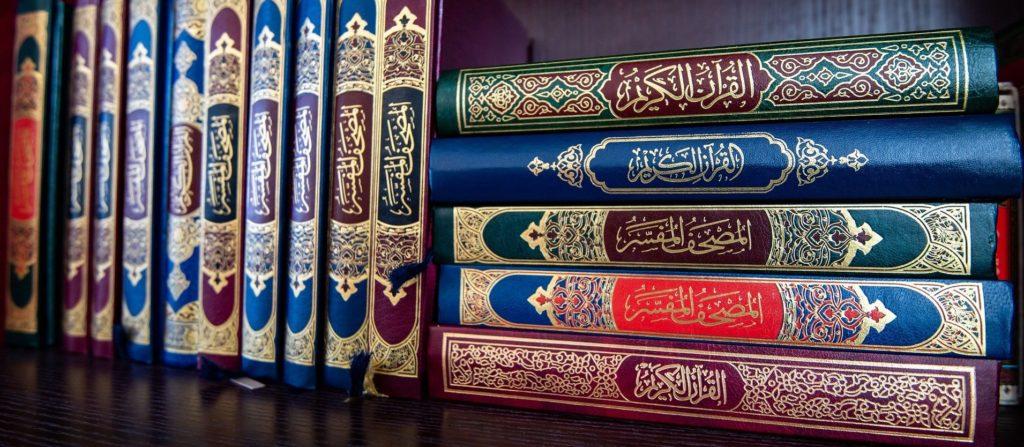
Nullifiers of Fast
Q- What nullifies the fast?
A- Sexual intercourse; eating; drinking; the emission of mani (semen) due to desire; whatever bears the characteristics of food and drink; intentional vomiting; the emission of blood due to cupping; the emission of menstrual and postpartum blood.
– Sheikh Muhammad Bin Salih al-‘Uthaimeen, Islamic Verdicts on the Pillars of Islam
Sleeping & Resting
Q- I spend my day in Ramadan asleep or at rest since I am unable to work due to my (experiencing) severe pangs of hunger and thirst, so does this affect the validity of my fast?
A- This does not affect the validity of the fast, (rather) therein is an increase of reward due to the saying of the Messenger (peace be upon him) to ‘Aisha (may Allah be pleased with her): “Your reward is according to your hardship.”
So, the more hardship a person experiences, the more his reward increases. He should (also) do what he can to reduce the effect of fasting such as cooling himself with water and resting in a cool place.
– Sheikh Ibn ‘Uthaymeen, Fatawa Ramadan – Volume 2, Page 522, Fatwa No.487, Fatawa Ibn ‘Uthaymeen – Volume 1, Page 509
Swimming & Fasting
Q- What is the ruling regarding swimming in the sea or in the pool during the day in Ramadan?
A- We say (that) there is no harm in the fasting person swimming in the sea or in the pool, whether the pool is deep or otherwise, he can swim as he wishes and immerse himself in the water. However, he must – to the best of his ability – take care not to allow any water into his stomach.
Swimming energises the fasting person and assists him in his fast; and that which energises (a person) in obedience to Allah, then there is no harm in it because it is from that which reduces the effects of hardship of worship for the worshipper and makes it easy for him.
Allah says in the verses related to fasting: “…Allah intends for you ease, and He does not want to make things difficult for you. (He wants that you) must complete the same number (of days), and that you must magnify Allah for having guided you…” [Qur’an, 2:185]
And the Prophet (peace be upon him) said: “This religion is easy. No one becomes harsh and strict in the religion without it overwhelming him.” (Bukhari and Muslim)
So there is no harm in swimming in the pool, just as there is no harm in taking a shower and other than that. And Allah has the Complete Knowledge (of all affairs).
– Sheikh Ibn ‘Uthaymeen, Fatawa Ramadan – Volume 2, Page 524, Fatwa No.490, Fatawa Ibn ‘Uthaymeen – Volume 1, Pages 509-510
Did Not Make Up Fasts
Q- What is the ruling regarding the one who did not make up the missed fasts of Ramadan until next Ramadan started, without any valid reason?
A- He is required to repent to Allah and make up the (missed) fasts in addition to feeding a poor and needy person for every (missed) day an amount of half a saa’ [one saa` is equal to four madd, and one madd is equal to the amount held by cupping the two hands together. It is a measure by volume not by weight] from the staple diet of the land from dates, wheat, rice or other than them. The amount is equivalent to one and a half kilograms, and thereafter, nothing further is required of him in making an expiation (kaffaarah). This is how a group of the companions, including Ibn ‘Abbas (may Allah be pleased with him), ruled.
If, however, he was excused due to illness or travel, or if a woman was excused due to pregnancy or breast feeding thereby causing her difficulty in fasting, then nothing is required of them except to make up the (missed) fasts.
– Sheikh Bin Baz, Fatwa Ramadan – Volume 2, Page 554, Fatwa No.536, Tuhfatul-Ikhwaan bi-Ajwibah Muhimmah tata’allaaq bi-Arkan al-Islaam – Page 177Q
Intentionally Broke The Fast
Q- What is the expiation for a man who intentionally broke his fast during Ramadan without a valid reason?
A- If the man intentionally broke his fast by having sexual intercourse, then he must make up (the fast) and also make an expiation in addition to repenting to Allah. (The expiation is) freeing a believing slave, and if he is unable to do so, then he must fast for two consecutive months, and if he is unable to do that, then he must feed sixty poor and needy people. And the woman is required to do the same if she was not forced (to have sexual intercourse).
If, however, he broke his fast by eating and drinking, then he is required to make up (the fast) and repent without making any expiation.
– The Permanent Committee, Fatwa Ramadan – Volume 2, Page 566, Fatwa No.549
Donating Blood
Q- Is donating blood during the day in Ramadan permissible or does it break the fast?
A- If he donated blood and a lot was taken, then certainly this invalidates the fast because it is analogous to cupping, and that would be to draw blood from his vein in order to help the sick or for safe keeping in case of emergency.
As for (drawing) a little such as taking with a syringe for analysis and examination (purposes), then this does not break the fast.
– Sheikh Ibn Jibreen, Fatawa Ramadan – Volume 2, Pages 466-467, Fatwa No.403.
Semen Without Desire
Q- Whilst fasting in Ramadan, I suffer from an intermittent excretion of semen without having a wet dream or masturbating. So does this affect my fast?
A- If the matter is as you have mentioned, then the excretion of semen without desire during the day in Ramadan does not affect your fast and you are (therefore) not required to make it up.
– The Permanent Committee, Fatawa Ramadan – Volume 2, Page 451, Fatwa No.378
Reciting Qur’an in Menstruation
Q- I read books of Tafseer of the Qur’an when I am not in a state of purity… such as during my monthly period, is there any objection to this, and am I committing any sin by doing so? Please deliver a verdict, and may Allah reward you.
A – There is no objection to the menstruating woman or the one who has postnatal bleeding reading books of Tafseer nor reciting the Qur’an, without touching the Book according to the most correct of the two opinions held by the scholars.
As for the one who is junub, he may not recite the Qur’an at all, until he makes ghusl, but he may read the books of Tafseer, Hadith and the like, without reciting the verses they contain, as it has been authentically reported from the Prophet ﷺ that nothing prevented him from reciting the Qur’an except janabah. [Abu Dawud no.229, Ibn Majah no.594 & Ahmad 1:84, 124].
And in another version narrated by Imam Ahmad, with a good chain of narrators, he said: ”As for the one who is junub; no, not even an ayah.” [Ahmad 1:110]
– Sheikh Abdul-`Azeez Bin Baz; Fatawa Islamiyah, vol. 1, p112-113.
Ejaculation after Kissing
Q- Regarding (the husband) if he kissed his wife, or cuddled her and thereby excreted prostatic fluid, does that invalidate his fast or not?
A- According to most of the scholars, his fast is invalidated because of that.
– Ibn Taymiyyah, Fatawa Ramadan – Volume 2, Page 456, Fatwa No.387, Majmoo’ Fatawa Sheikh Al-Islaam Ibn Taymiyyah – Volume 25, Page 265
On Flight
Q- If the sun set upon a person and the mu’azzin called the adhan while he was in the airport and he broke his fast. Then after the plane took off, he saw the sun, should he fast?
A- Our answer to this is that he is not required to because the time for breaking the fast came while they were on the ground. So, the sun set while they were in a place in which it set, and the Messenger of Allah (peace be upon him) said: “When night falls from this side, and the day vanishes from this side, and the sun sets, then the fasting person should break his fast.”
So, if a person, upon whom the sun set, broke his fast while he was on the ground in the airport, then his day has ended. If his day has ended, then he is not obliged to fast except on the next day.
So, based on this, it is not necessary to fast in these circumstances, because breaking the fast was only according to a legal evidence, and it is not required to fast except based upon a legal evidence. And Allah knows best.
– Sheikh Muhammad Bin Salih Al-‘Uthaimeen, Islamic Verdicts on the Pillars of Islam
Tasting Food
Q- Is the fast invalidated by tasting food?
A- Tasting food does not invalidate the fast, if a person does not swallow it. But you should not do it unless there is a need for it; and in this situation, if any of it enters the stomach without your intending it, then your fast is not invalidated. And Allah knows best.
– Sheikh Muhammad Bin Salih Al-‘Uthaimeen, Islamic Verdicts on the Pillars of Islam
Asthma Inhalers
Q- In some of the pharmacies (they sell) inhalers which some of the asthma sufferers use; Is it permissible for the fasting person to use it during the day in Ramadan?
A- The use of the inhaler by the one who is fasting is permissible whether his fast is in Ramadan or other than Ramadan.
That is because the particles in the inhaler do not reach the stomach, rather they reach the lungs and cause them to open up thereby allowing the person to breathe normally.
So, it is not regarded as food nor drink, and that which is known is that the basic principle is the validity of the fast (is maintained) until (authentic) evidence from the Book, or the Sunnah, or consensus (ijmaa’) or valid juristic reasoning (qiyaas) indicates otherwise.
– Shaykh Ibn ‘Uthaymeen, Fataawa Ramadan – Volume 2, Page 531, Fatwa No.502 Fataawa Ibn ‘Uthaymeen – Volume 1, Pages 169-170
Iʽtikaf
Q- We would like to know what is meant by “iʽtikaf” and its ruling?
A- Iʽtikaf is for a person to confine himself to the mosque in obedience to Allah so as to separate himself from the people and free himself (from the chores of daily life) to exert himself in worshipping Allah. This can take place in any mosque, whether it is a mosque in which people gather for the Friday prayer or not. However, it is better (to perform the iʽtikaf) in a mosque in which the people gather for the Friday prayer so that one performing iʽtikaf is not forced to leave the mosque (in which he is doing iʽtikaf) to go to another mosque for the Friday prayer.
– Sheikh Ibn ‘Uthaymeen, Fatawa Ramadan – Volume 2, Page 861, Fatwa No.846, Fiqh al–’Ibaadaat – Page 208
Conditions of Iʽtikaf
Q- What are the conditions of iʽtikaf, and is fasting one of them? Is it permissible for the person in I’tikaf to visit a sick person, answer an invitation, fulfill some of his family’s needs, or go to work?
A- Iʽtikaf is prescribed in a mosque in which the congregational prayer is established. If the person in iʽtikaf is from those upon whom Friday prayers are obligatory and the length of his iʽtikaf includes a Friday, then it is better to be in a mosque in which Friday prayers are established. Fasting is not (a) necessary (part of it).
The sunnah is that one does NOT:
• Visit the sick during his iʽtikaf
• Accept invitations
• Fulfill the needs of his family
• Witness the funeral (by following it) and
• Go to work outside the mosque.
• Touch a woman (his wife), nor have intercourse with her
• Leave to fulfill a need except what is necessary
This is due to what has been authenticated on the authority of ‘Aishah (may Allah be pleased with her) that she said: “The sunnah for he who is in iʽtikaf is that he does not visit the sick nor witness a funeral, nor touch a woman (his wife), nor have intercourse with her nor leave to fulfill a need except that which is necessary.”
– The Permanent Committee for Islamic Research and Fatawa, Fatawa Ramadan – Volume 2, Page 862, Fatwa No.848
Is Iʽtikaf restricted to Ramadan?
Q- Does iʽtikaf have a fixed time or is it restricted to Ramadan, or is it permissible in other than Ramadan?
A – What is prescribed is that it should be in Ramadan only. This is because the Prophet ﷺ did not make iʽtikaf in other than Ramadan, except what he ﷺ did in Shawwaal, after having left doing iʽtikaf in Ramadan one year, and so did it in Shawwaal. Yet if a person was to make iʽtikaf in other than Ramadan it would be permissible, because ‘Umar (may Allah be pleased with him) asked the Prophet ﷺ saying: “I vowed to do iʽtikaf for a night or a day in the Masjid al–Haraam.” The Messenger of Allah ﷺ said: “Fulfill your vow.”
– Sheikh Ibn ‘Uthaymeen, Fatawa Ramadan – Volume 2, Page 864, Fatwa No.851; Fiqh al–Ibaadaat libni ‘Uthaymeen – Page 208
Leaving from Iʽtikaf
Q- When does a person leave iʽtikaf, is it after sunset on the night prior to Eid or after fajr on the day of Eid?
A – The person in iʽtikaf leaves iʽtikaf once Ramadan finishes and it finishes as the sun sets the night prior to Eid. He enters iʽtikaf at sunset (prior) to the 20th day of Ramadan. This is so as the last ten (nights) of Ramadan start from sunset of the night (prior) to the 20th day of Ramadan and ends at sunset of the night (prior) to Eid.
– Sheikh Ibn ‘Uthaymeen, Fatawa Ramadan – Volume 2, Page 872, Fatwa No.859
[Source: Fatwa Online and other books]
Istiqamah: How To Remain Steadfast After Ramadan
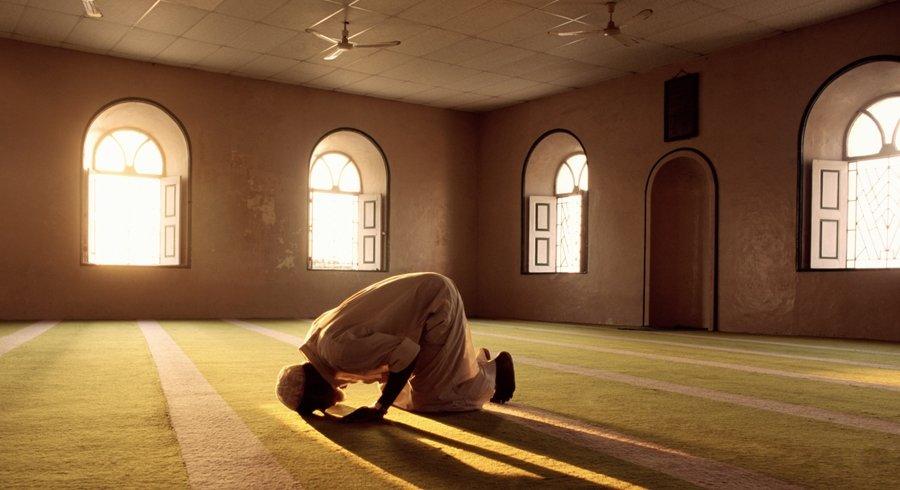
THE word istiqaamah comes from the Arabic root word قام (qaama) which means to rise, to stand upright. The word مستقيم (mustaqeem) is derived from the same root.
From the perspective of Shari’ah, it means “to remain consistent on the path you are in, no matter what happens.”
It is a quality that we continuously strive to attain in order to remain steadfast in deen, although we may fail many times in the process. It is one of the tools to attain the pleasure of Allah and it strengthens our belief in Allah.
Let’s have a look on what Allah and his Messenger ﷺ has said about istiqaamah in the Qur’an and Sunnah.
Allah says: Verily, those who say: “Our lord is Allah (alone),” and then they stand firm, on them the angels will descend (at the time of their death, saying): “Fear not, nor grieve, but receive glad tidings of Paradise which you have been promised!” [Surah Fussilat, 41:30]
So remain on a straight course… [Surah Hud, 11:112]
In a hadith, Abu ʽAmr said: “O Messenger of Allah ﷺ, tell me something about Islam which I could not ask anyone about it save you.” He ﷺ answered: “Say: I believe in Allah and then stand firm and steadfast.” [Sahih Muslim, no. 21, Arba’oon an-Nawawi]
In history, we see that the Sahabah usually never gave up an act of worship that they started. An excellent example would be that from the life of Ibn Umar (may Allah be pleased with him).
(From the narration of a long hadith)… Ibn Umar reported that: “I saw in a dream as if two angels have taken hold of me… (He narrated the dream to the Prophet ﷺ) who replied: “Worthy is this man Abdullah, O that he would pray at night. ” [Sahih Muslim, Book of Merits Pertaining to the Companions of the Prophet (saw), no. 6391]
It is said that after that he never missed his night prayer even during travel. He slept not but for a small part of the night.
Conditions to achieve istiqmaah
According to Ibn al-Qayyim, there are five conditions to achieve istiqaamah.
- The act should be done for the sake of Allah (ikhlaas).
- It should be done on the basis of ‘ilm (knowledge).
- Performing ibaadah should be in the same manner as commanded.
- It should be done in the best way possible.
- One must restrict himself to what is prescribed by the Shariʽah while performing those deeds.
Tips to achieve istiqaamah:
- Have a sound and righteous heart.
- Read the Qur’an regularly.
- Spend your valuable time in duʽaa and dhikr of Allah.
- Read the Seerah of the Prophet ﷺ and biographies of the Sahabah and Salaf-us-Saalih (righteous people of the past).
- Remind yourself about Jannah and Jahannam.
- Fulfill the fara’idh (obligations) of the religion properly.
- Seek beneficial knowledge (i.e., knowledge of the Shariʽah).
- Have good companions.
- Contemplate on how to aviod things that turn you away from steadfastness.
- Be humble towards Allah.
Factors which affect istiqaamah
- Committing sins
- Shirk
- Hypocrisy
- Bidʽah
- Recklessness, reluctance, heedlessness, and being misled by desires.
One must know the factors affecting steadfastness in order to avoid the barriers.
May Allah make this Ramadan, a turning point in our lives. Ameen.
Reference: Commentary on 40 Hadith of an-Nawawi by Dr. Jamal Ahmad Badi, p. 103
Limited free articles. Subscribe for full access.

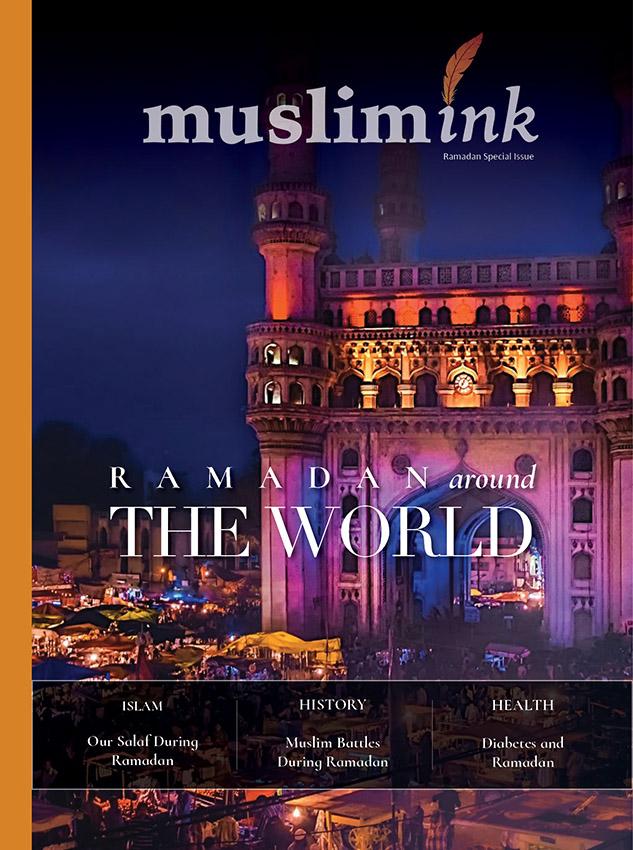

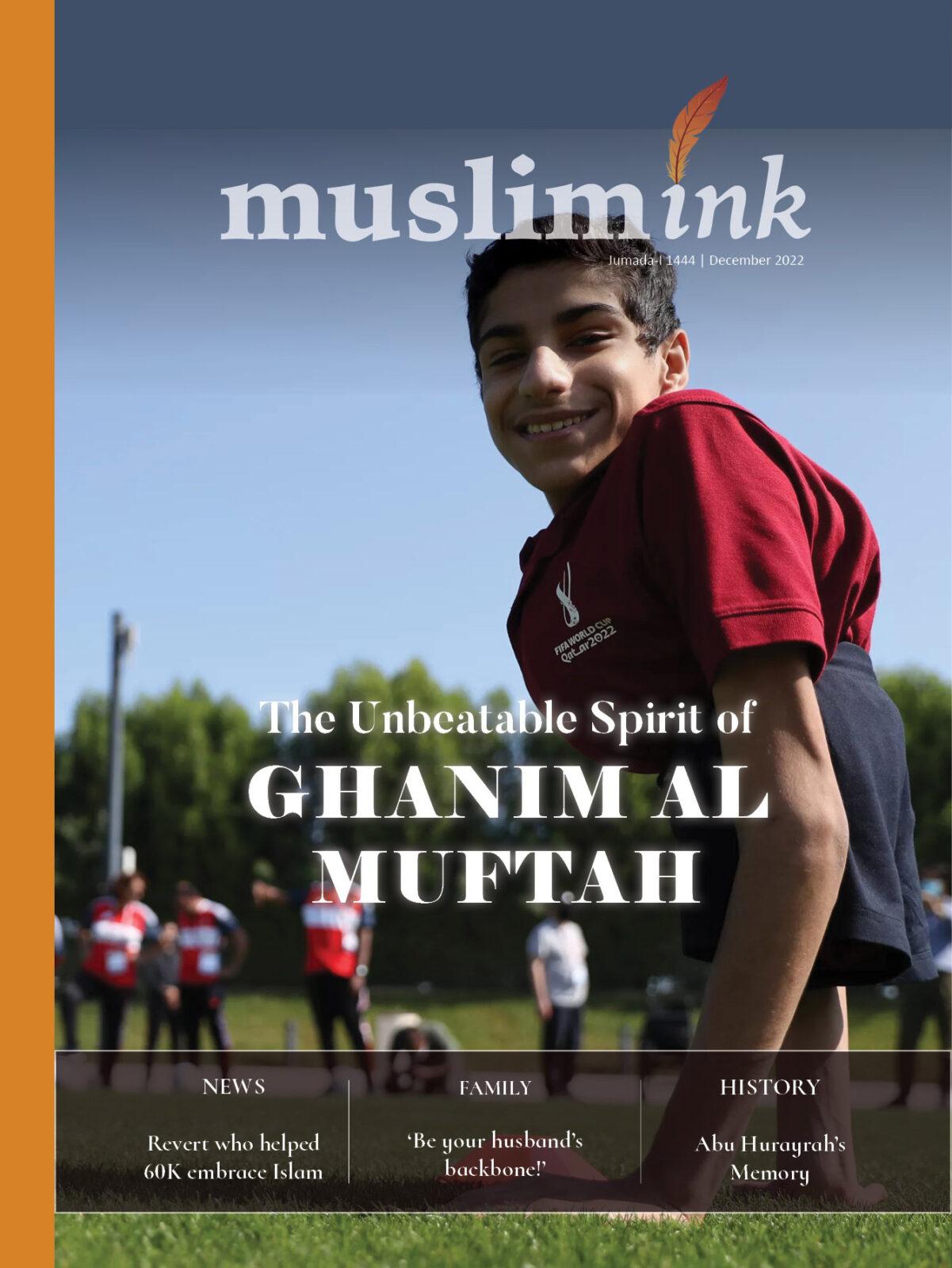
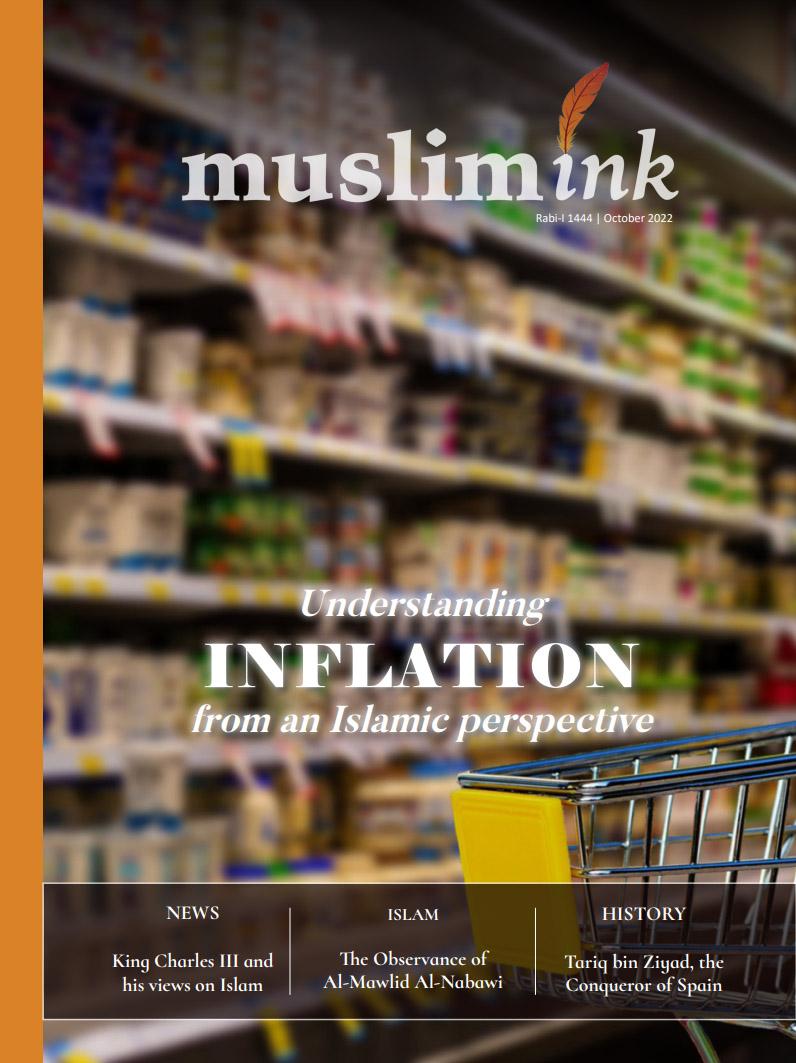

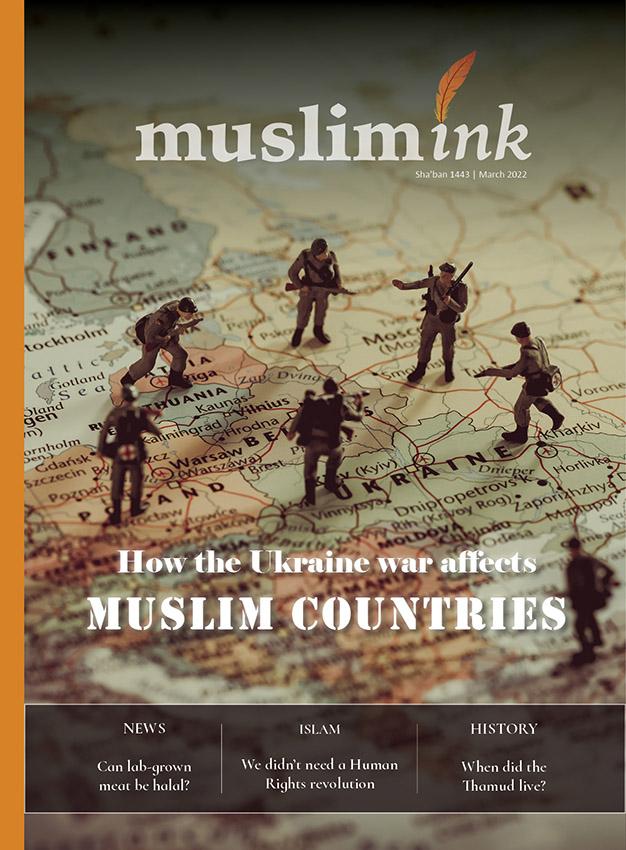
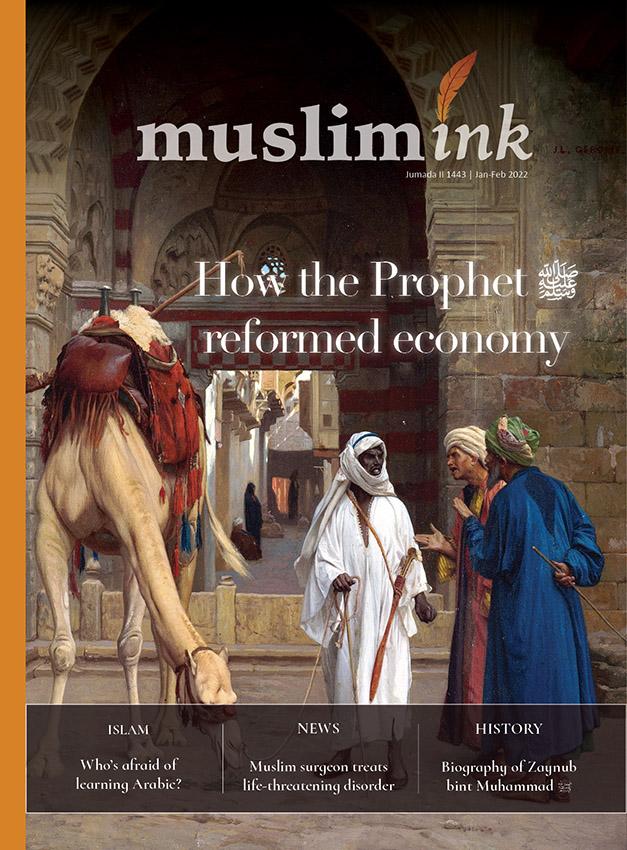

 Dr. Bilal Philips
Dr. Bilal Philips